He has heavy things on his mind

This story originally appeared in the July 26, 1971 issue of Sports Illustrated. Subscribe to the magazine here.
It is like watching a late late movie on television. The image is a little blurred and the action has slowed down and only once in a while, in a stretch that has not been flawed, do you see the clear, exciting image you remember from the years gone by.
Maybe it is more like watching a ballplayer in an Oldtimers game, the first year after he has retired. Most of the physical skills are still there, but his life has changed and he has other things on his mind. Once he gets back into the swing of it, he looks almost the way he did as a star.
Muhammad Ali, a bit trimmer than he was on the night Joe Frazier knocked him down and took undisputed claim to the heavyweight championship of the world, is almost indistinguishable from the young Cassius Clay who beat Sonny Liston in Miami Beach. He is bigger and stronger but, when he wants to, he moves with the same ineffable grace and speed and the left hand still flicks like a snake's tongue. But in the quiet of his hotel room, he is a different man.
In the old days he was always on stage. In his hotel before the first Liston fight he was never still. He was on his feet, dancing, watching himself in the mirror, talking about what he would do to Liston, appreciating the appreciation of his audience, even if the audience was only one man.
In his room last week in Houston he lay quietly on his bed going over a thick sheaf of cards upon which he had made notes for a lecture that he calls The Intoxication of Life. He did not really care much about the fight coming up with Jimmy Ellis, who was his sparring partner for most of the big fights of his career.
"This is very heavy stuff," he said, waving the cards. "Very heavy. But it ain't as heavy as another lecture I do called The Inner Man." He tapped himself on the chest.
"The Inside Man," he said.
When he was younger, his face, even in repose, was alight with mischief. Now it is rather somber, the planes wider and beginning to grow heavier with age. It is only when he is in the gymnasium, working out and reacting to a crowd, that flashes of the old lively Ali show.
He went across the street to the Astrohall, next to the Astrodome, to work out early in the afternoon. Jimmy Ellis was finishing and Ali sat in the crowd, watching. Once the spectators realized he was there, he was surrounded and he began to respond to the attention like an old trouper.
He crouched behind the row of people in front of him, pretending to hide, glaring at Ellis with a menacing look. Ellis saw him and grinned but said nothing, and Ali sat up again. Now youngsters were approaching him for autographs.
The crowd around him grew and his face began to lighten and he said, "That Ellis is ugly. He so ugly he ought to donate his face to the National Wildlife Bureau." He waited for the laughter to die down with all the sense of timing of an old vaudevillian.
When it had stopped he said, "Me, I'm so pretty they ought to declare my face a national resource."
That morning, lying in bed, he had said, "I don't have to go through the act anymore. Different things intoxicate you different times in your life. You get intoxicated by the wine of success and you want more and more success. You get intoxicated by different things in every stage of life. The child is intoxicated by a toy, the man by a car. All of life is intoxication."
He had begun by speaking quietly, almost inaudibly. but as he went on, his voice grew louder, until finally he was orating.
"What gives you satisfaction and pride one time, the next time may humiliate you," he said. "When you think about it, you say to yourself, 'Why was I such a fool?' You think you must do this thing or that thing, then you find yourself on another road, doing something else. You just floating on the sea of life, the ocean of activity."
He was asked how he felt about the Supreme Court decision that vindicated his position on the draft.
"Blank," he said. "Blank. It's like a man been in chains all his life and suddenly the chains taken off. He don't realize he's free until he get the circulation back in his arms and legs and start to move his fingers. Then all at once he knows the chains gone and he can move about freely again. I don't really think I'm going to know how that feel until I start to travel, go to foreign countries, see those strange people in the street, then I'm gonna know I'm free. But it ain't meant that much to me yet."
His face was still solemn and thoughtful. He is no longer a laughing man in the privacy of his room.
Later, watching Ellis, with more and more of the crowd giving its attention to him, he was different. Ellis finished his workout and Ali said, "Nine rounds. That's all he did. Now I'm gonna do twenty."
Ellis left the ring and walked down the aisle near where Ali was sitting and Ali crouched down behind the seats again. Ellis passed, studiously ignoring him, then whirled and pointed at him and yelled "You!" and Ali grinned.
"Don't jump now," Ellis said. "You better jump when you get in the ring."
"You in trouble," Ali said. "Without no endurance, come July 26, you better up your insurance." He listened to the laughter of the crowd with pleasure, then went to dress for his own workout.
In the morning there had been no signs of lightheartedness.
"You only live in the present," he had said. "The past is a dream and the future is a mist. The great moments pass away. What amuses man is to be puzzled, not to know the outcome of a boxing match or a baseball game. A man is never satisfied. First they had to make a car, then that wasn't enough, so they made an airplane and that wasn't enough, so they had to land on the moon."
In the old days he used to indulge his imagination on flights like this, surreptitiously eyeing his audience to see if they were buying his put-on. Now he was perfectly serious.
Someone asked him about the fight, if he took Ellis seriously, and he frowned. He did not want to talk about the fight.
"It's not the same anymore," he said. "Used to be, before the Liston fights, all I thought about was fight, fight, fight, be the greatest, be the champion. Now it's like I go to work, put in eight hours a day, do my job. I got other things on my mind, heavy things."
In the afternoon, in public, he wore the mask of the old Ali. When he got in the ring, with a crowd of some 200 watching him, he leaned on the ropes for a few minutes, looking at the people, sweating from 10 rounds on the light and heavy bags. He seemed fit, but there was still a smudge of fat blurring the outlines of the heavy muscles in his upper body.
Angelo Dundee, who has trained Ellis and Ali in almost all of their fights, is training Ellis for this one, since he is both manager and trainer for Ellis and he was only trainer for Ali. Dundee was standing in the back of the auditorium and Ali waved at him.
"Angelo Dundee!" he said. "People ask me do I miss Angelo Dundee. Naw, I don't miss Angelo Dundee! All he got is the connection and the complexion. Now I got a trainer took Sugar Ray Robinson as a barefoot little boy in Harlem, made him into almost as great a champion as me. Only reason he ain't got the reputation is because he colored."
His trainer for this fight is Harry Wiley, a small and phlegmatic black man who did, indeed, train Sugar Ray for 23 years, and was cornerman for Kid Chocolate and Henry Armstrong.
"He taught me some new tricks," Ali yelled to Angelo. "Seven lef' hooks in a row! Brrrrrrrp!" He made a sound like a machine gun and laughed with the crowd. Now he was warming up, the crowd with him, beginning to dance around the ring, once doing the Ali shuffle.
"This year going to make my whole life," he had said in the morning, very seriously. "What I want to do is buy a 150-unit housing development in Atlanta, Georgia, and I got other things on my mind I want to do. I got other lectures I want to write."
"He looks like he's in pretty good shape," Angelo said, watching him work with one of the two burly sparring partners he has with him, both of whom are more of the style of Joe Frazier than of Jimmy Ellis. "But he was in good shape for Frazier, too. His problem is he isn't concentrating on fighting anymore. The day of the Frazier fight some movie people came to me and said they wanted to shoot some pictures of him for a movie he's doing and I said 'Hell, no!' and the minute I turned my back he's doing the movie bit. On the day of the fight!"
In the ring Ali was fighting flat-footed, not trying to punish his sparring partner. He has never been vicious in the gymnasium; on this hot, humid afternoon he contented himself with producing an occasional flurry of lovely, quick combinations near the end of each round. When he does that, the old Ali is there again, the big arms moving with precise, flickering speed, the jabs snapping back the head of the other man.
Ellis, watching from the back of the hall, shook his head.
"Float like a butterfly?" he said. "He float like a elephant. After this fight they gonna be a new saying about him. Buzz like a buzz saw, fall like a tree!"
For Ellis, this is by far the biggest fight of his life; he has looked forward to meeting Ali for years.
"I don't care if I never win another fight as long as I live—if I win this one," he said. He is not as impressive, physically, as Ali, but there is no hint of fat on him and his body is strong and graceful. "I lived in the shadow of Ali too long," he said. "All those years when I was his sparring partner, he's fighting and beating men I knew I could beat. I guess I been in the ring with him way over a thousand rounds and he never knocked me down and I knocked him down twice. I know everything he do and he ain't gonna change. Nobody gonna teach him any new tricks, no matter what he say. I know how he cover up, I know how he lean back to get his chin out of the way, and when he lean back that way he got his stomach sticking out."
Ellis leaned back, tucking in his chin and sticking out his stomach.
"One time I knocked him down with a left hook," he said. "Everybody talk about how hard I hit with the right, but I hit just as hard with the left. Then the other time I took a step to the left to get away from his jab and I came right down the pipe with the right hand and down he go. People say he got the reach on me but I can lay it on him, reach or no reach. It ain't the reach, it's what you do with it."
He watched Ali, now sparring his last round of the afternoon, up on his toes, moving around with the old dancer's skill. It was the first time he had done that.
"They talk about how he dances," Ellis said. "He don't dance no more. He fights flat-footed, just like everybody else. Jimmy Ellis, he can dance for 12 rounds, but not Ali. Look at him."
Ali looked very good at the moment, moving around the ring quickly, darting in and out, hitting accurately and hard.
"Somebody ask me do I hate him, is this a grudge fight," Ellis said. "We professionals. I don't hate him, he don't hate me. But he's in my way and I got to get him out of the way to get the championship and that's what I'm gonna do next week."
Maybe he will. The fight for him is an obsession, the culmination of years of frustration, and he is superbly prepared for it. Despite what Ali says, he misses Dundee and the men who work with Dundee. And this fight is no earth-shaking matter for him.
When the 20-round afternoon was over, Ali talked for a while to writers in his dressing room, then showered and returned to the Astroworld motel. He went into the coffee shop and sat down and drank a ginger ale, looking tired and serious. The act was over.
"Youth," he said. (He is 29.) "Youth is the time of blossoming, the fullness of energy. It's the time of errors and faults and the time when you can run four, five miles and never be tired. You're full of the intoxication of youth."
He crossed his arms on the table top and put his head down on them and talked very softly.
"I'm very tired now," he said. "I think I'll take tomorrow off and just rest. Used to be, I'd get up at six o'clock in the morning, run six miles, come back to my room and lie down and rest a few minutes, then go down in the lobby and mix with the people, then go work out in the gym and rest a little more and then I'd be out on the streets, talking with everybody and walking around and go to bed maybe eleven o'clock at night."
He sat up and drank thirstily.
"Now all I do is soak up rest," he said. "Run, then go to my room and just rest. Now I'm gonna go to my room and rest until dinner, then go right back to my room and go to sleep. I got more age on me. It takes away the things you can do."
He got up and stretched.
"Besides," he said, "I got to do more work on The Intoxication of Life. That is very heavy."
He walked away, a heavier man and obviously an older one than Cassius Clay. Every man ages, but not many mature the way he has.
SI's 100 Greatest Photos of Muhammad Ali
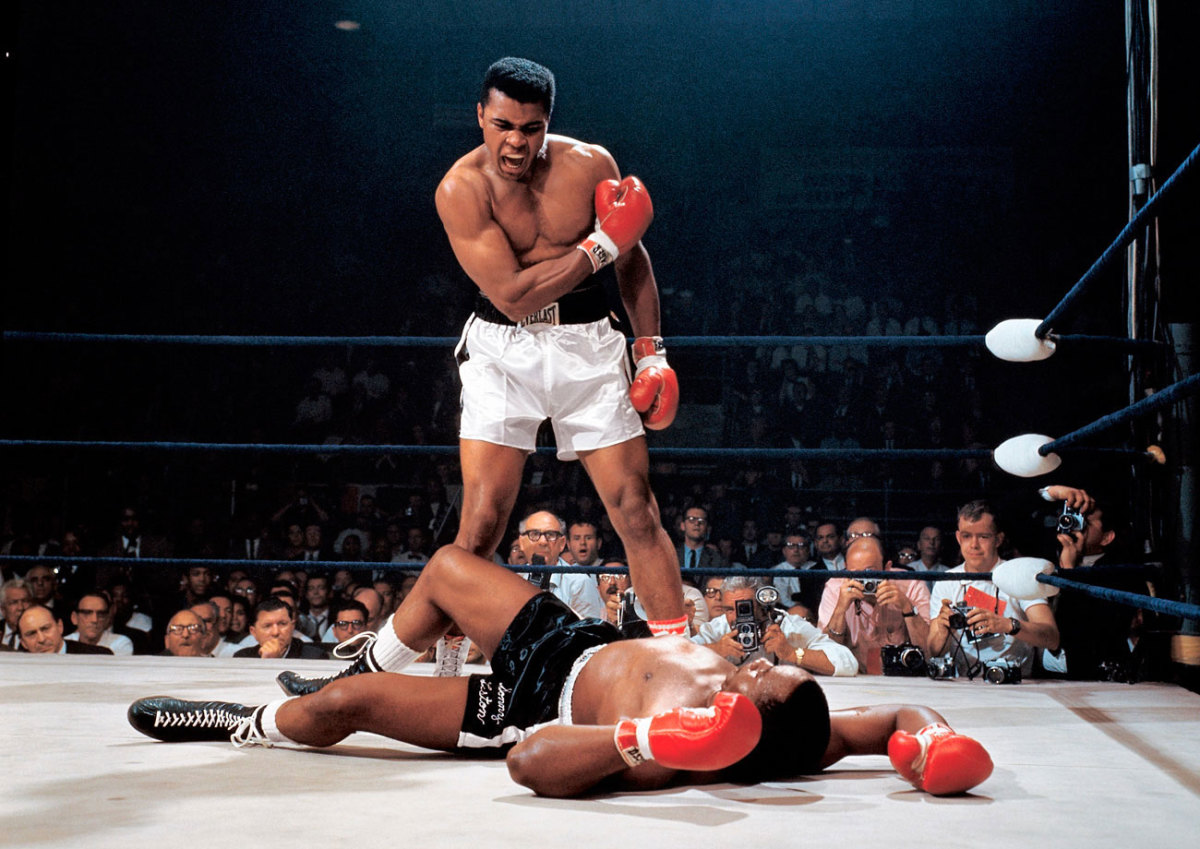
In one of the most iconic and controversial moments of his career, Ali stands over Sonny Liston and yells at him after knocking the former champ down in the first round of their 1965 rematch. Skeptics dubbed it "the Phantom Punch," but films show Ali's flashing right caught Liston flush, knocking him to the canvas. Refusing to go to a neutral corner, Ali stood over Liston and told him to "get up and fight, sucker."
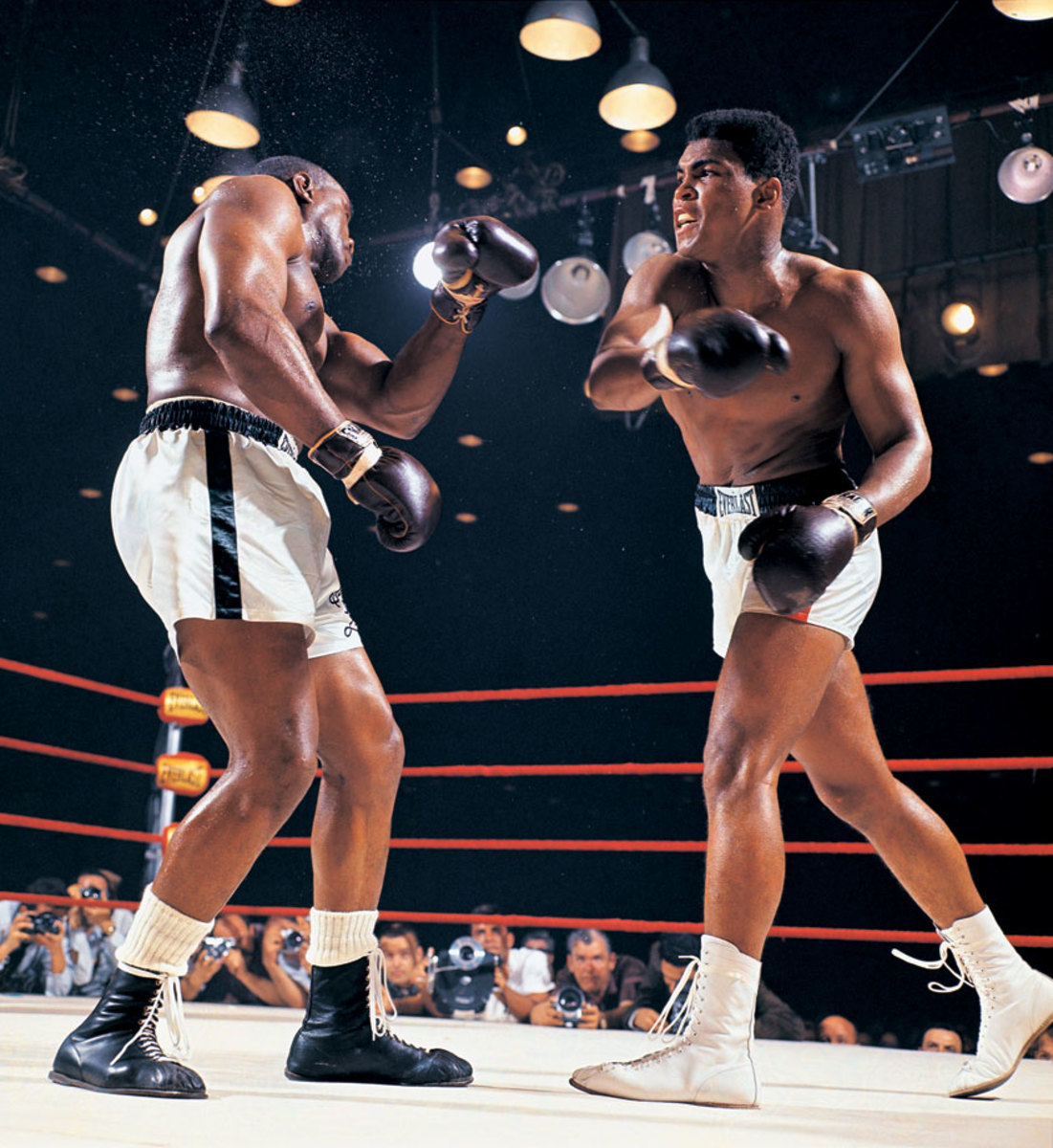
At 22-years-old, Cassius Clay (Muhammad Ali) battered the heavily favored Sonny Liston in a bout that shook the boxing world. The fight ignited the career of one of sports' most charismatic and controversial figures, whose bouts often became social and political events rather than simply sports contests. At the peak of his fame, Muhammad Ali was the best known athlete in the world. Liston, one of the most feared heavyweight champions in history, was a 1-8 favorite over the young challenger known as the Louisville Lip. But Clay, here stinging the champ with a right, used his dazzling speed and constant movement to dominate the action and pile up points.
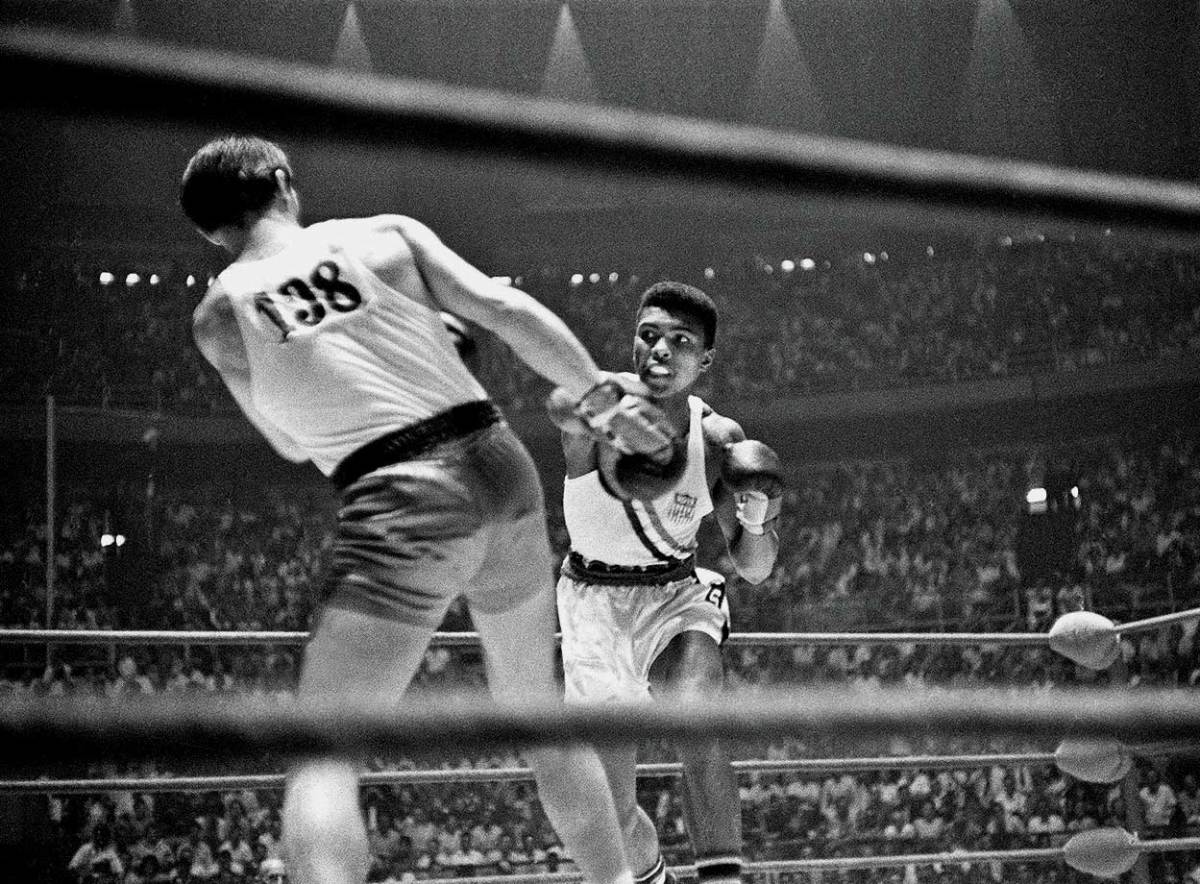
Cassius Clay punches Zbigniew Pietrzykowski of Poland during their gold medal bout at the 1960 Rome Olympics. Clay defeated Pietrzykowski 5-0 for the light heavyweight gold medal.
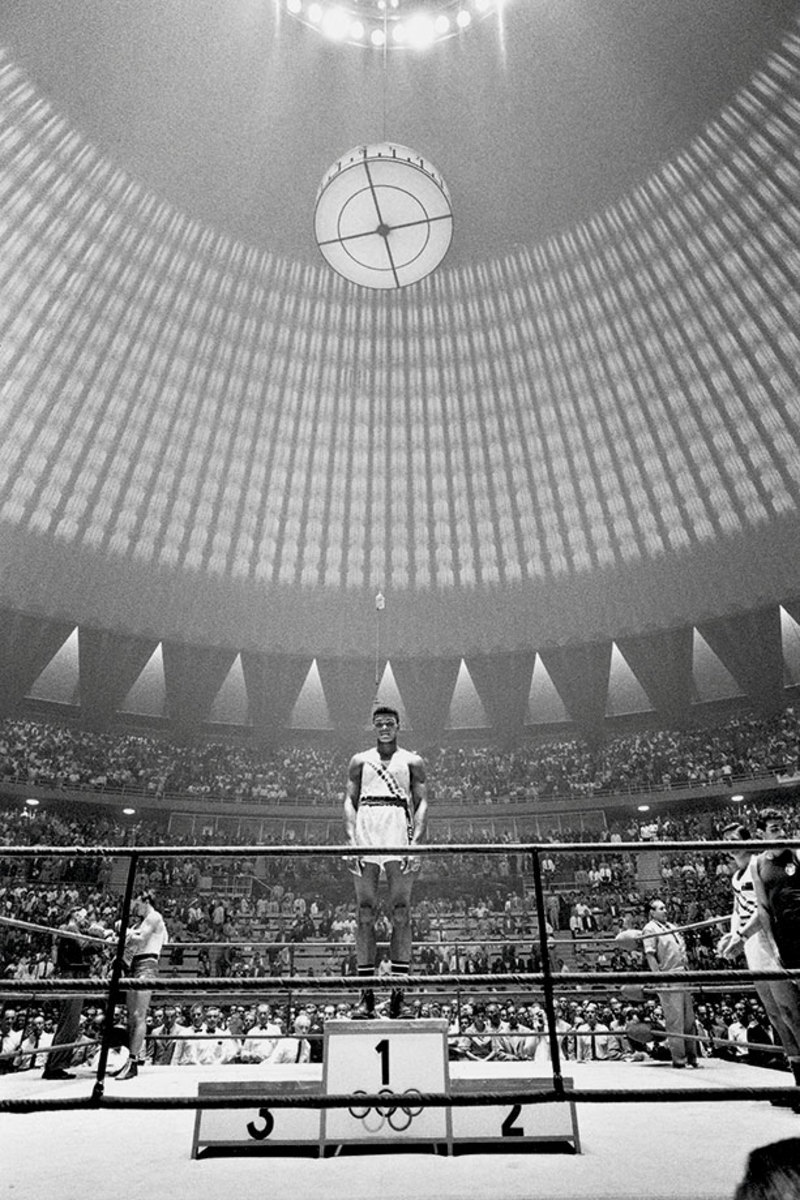
For the 18-year-old from Louisville, here atop the medal stand after his Olympic victory, all roads led from Rome. Clay finished his amateur career with a record of 100-5 and made his professional debut two months after the Games.
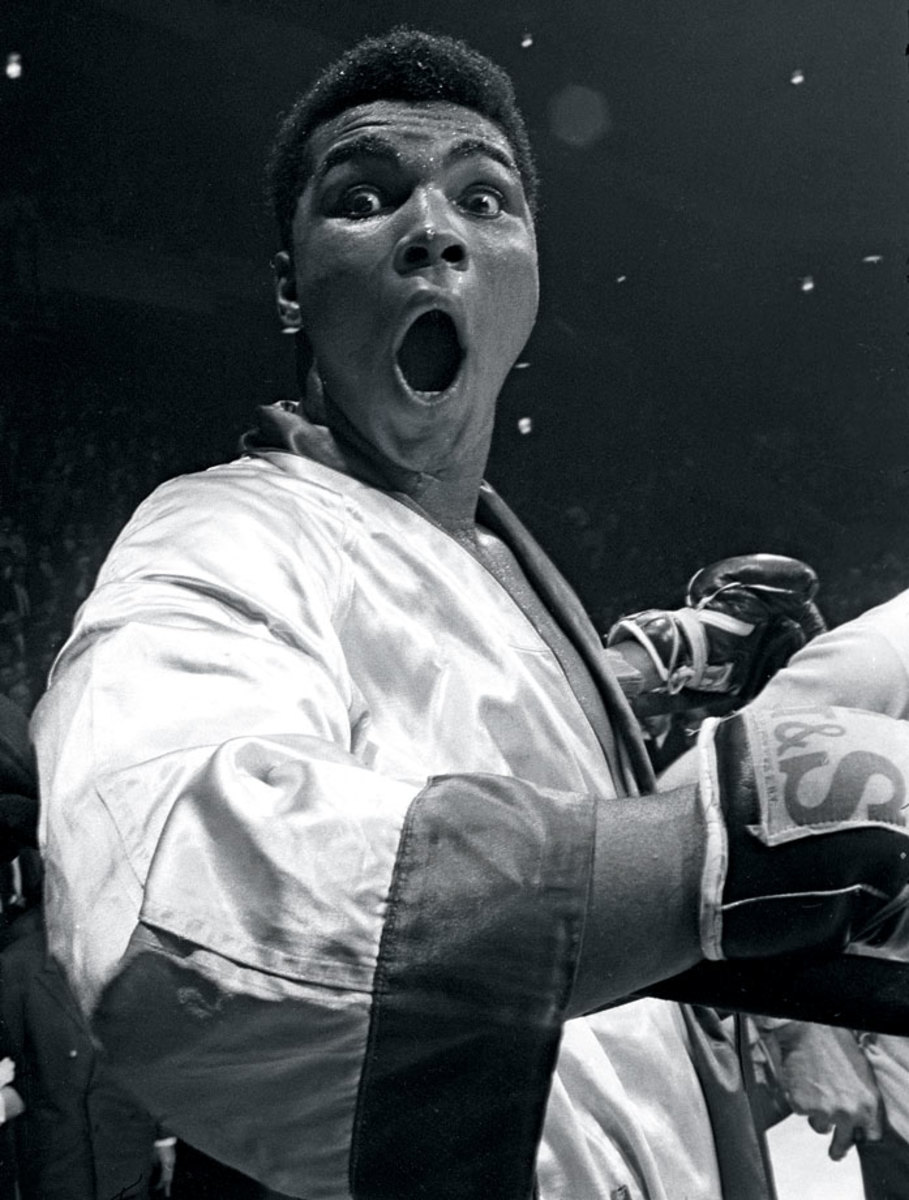
Undefeated in his first 17 pro fights, Clay mugged for the camera before the start of his 1963 bout against Doug Jones in Madison Square Garden.
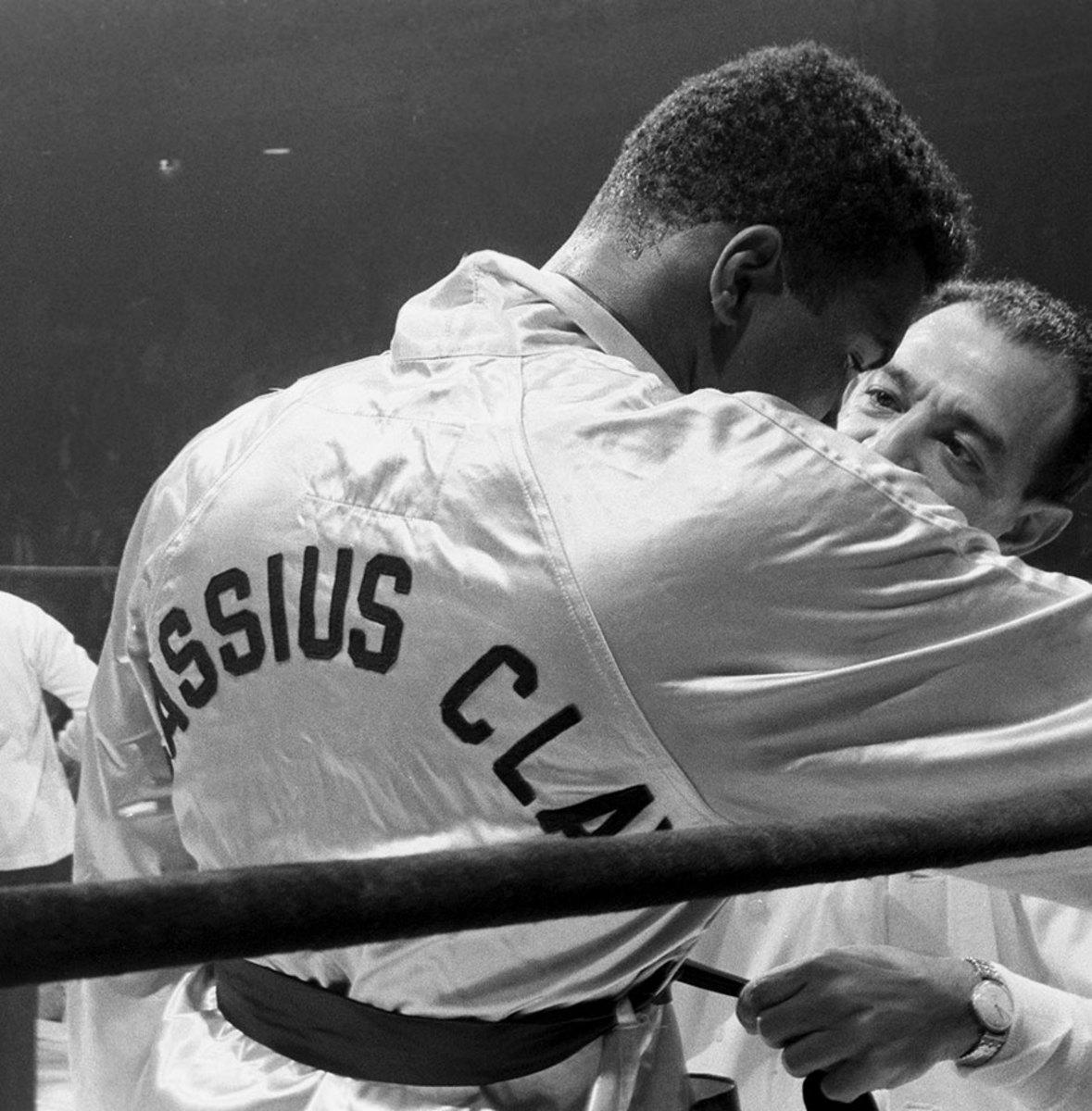
Trainer Angelo Dundee urged his young charge to get serious before the opening bell against Jones. Clay followed instructions and emerged from a tough fight with a unanimous decision victory. Three months later he would stop Henry Cooper and close out 1963 at 19-0.
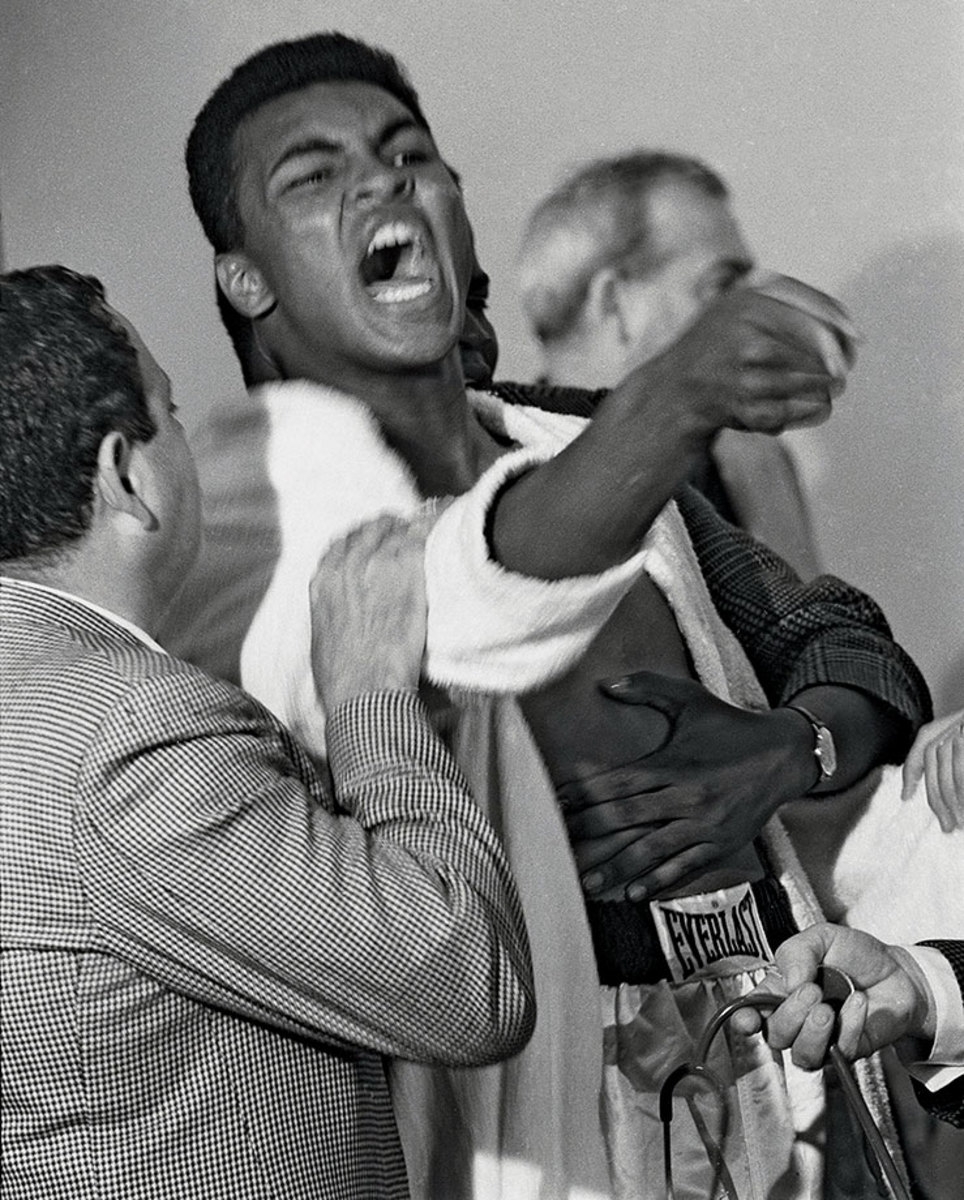
A seemingly hysterical Clay taunted Sonny Liston during the pre-fight physical for their 1964 bout. He had consistently baited the Big Bear during the lead-up to the fight, saying he was going to "use him as a bearskin rug ... after I whup him." The Miami Boxing Commission would fine Clay $2,500 for his outburst at the physical.
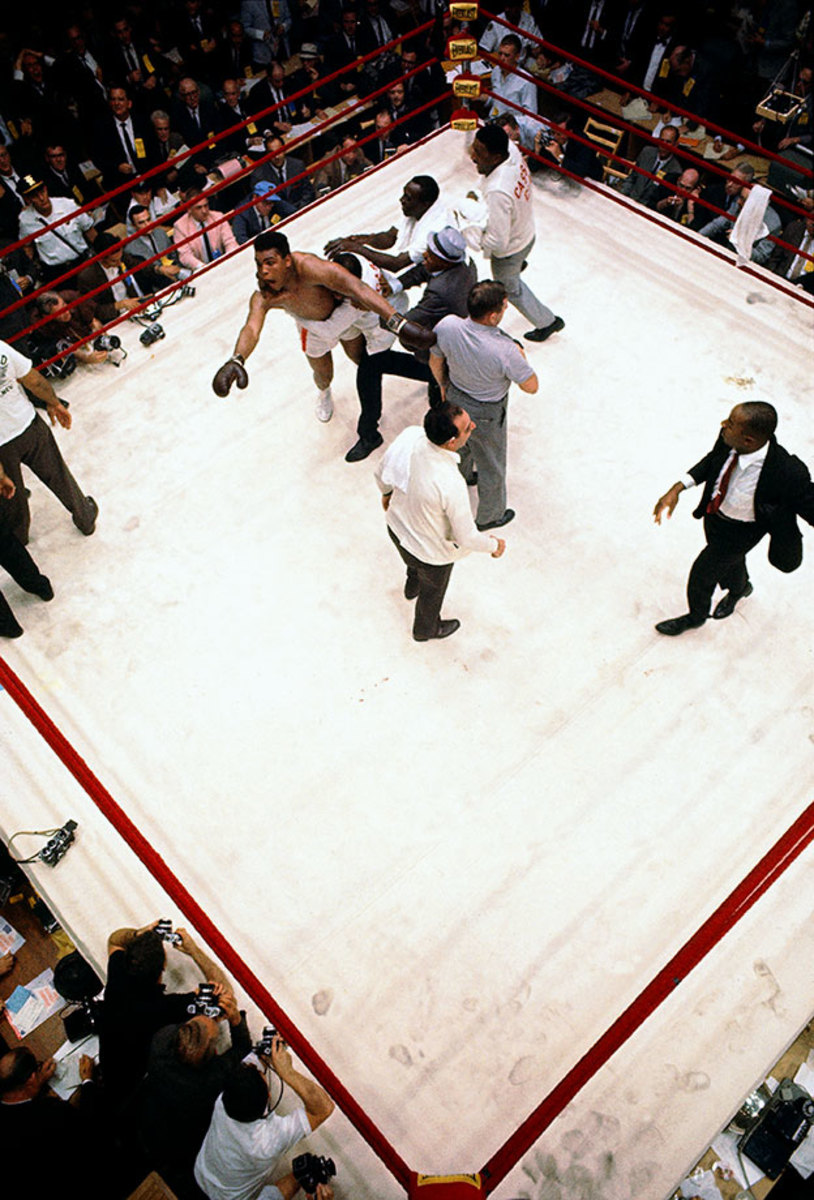
"I shook up the world!" an emotional Clay hollered to ringside reporters after his shocking defeat of Liston. And he did just that, claiming the heavyweight title at age 21 after a clearly beaten Liston, complaining of a shoulder injury, failed to answer the bell for the seventh round.
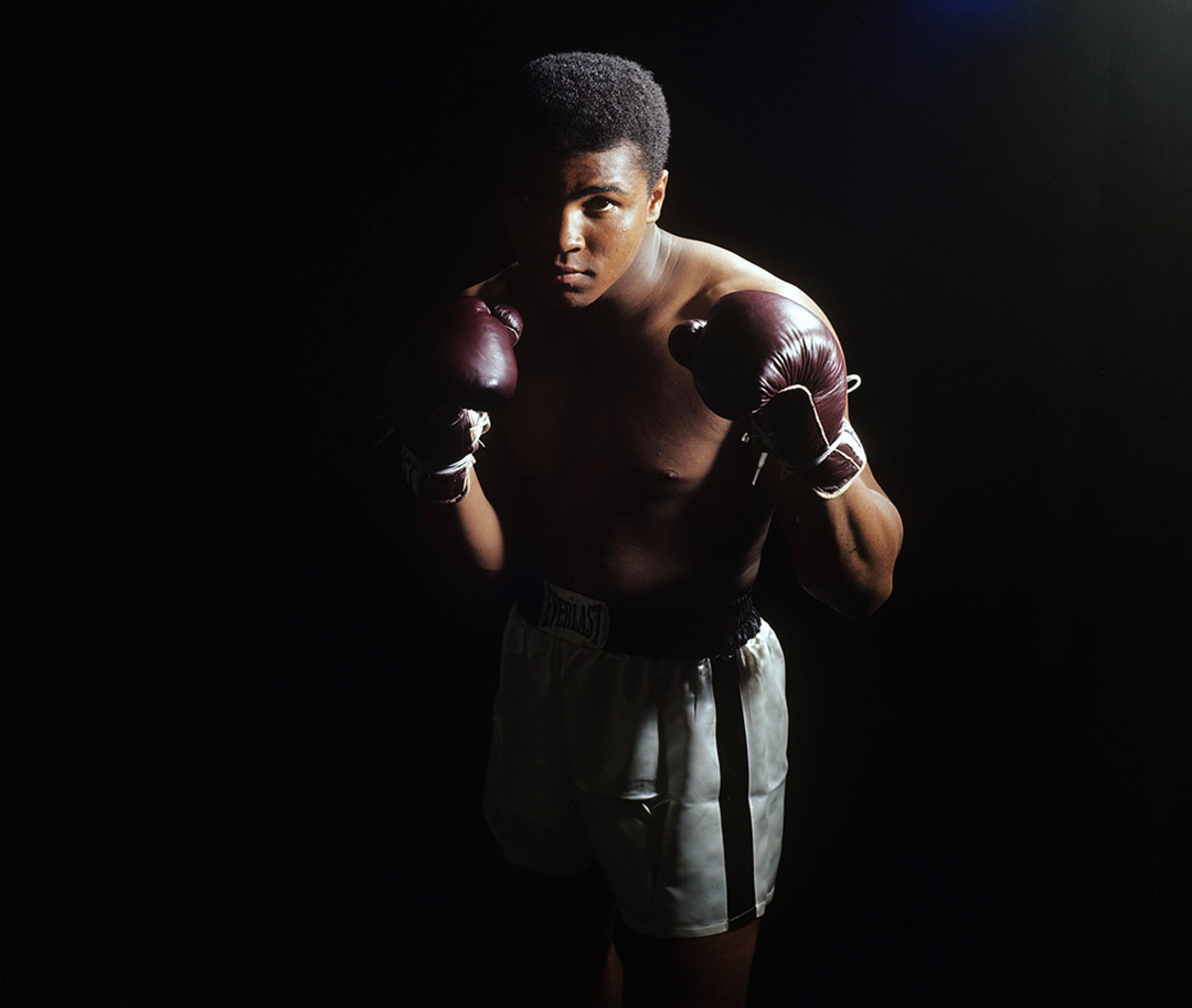
Draped in shadow, the young king — now known as Muhammad Ali — stared down the camera during a photo shoot in April 1965, one month before his rematch against Sonny Liston.
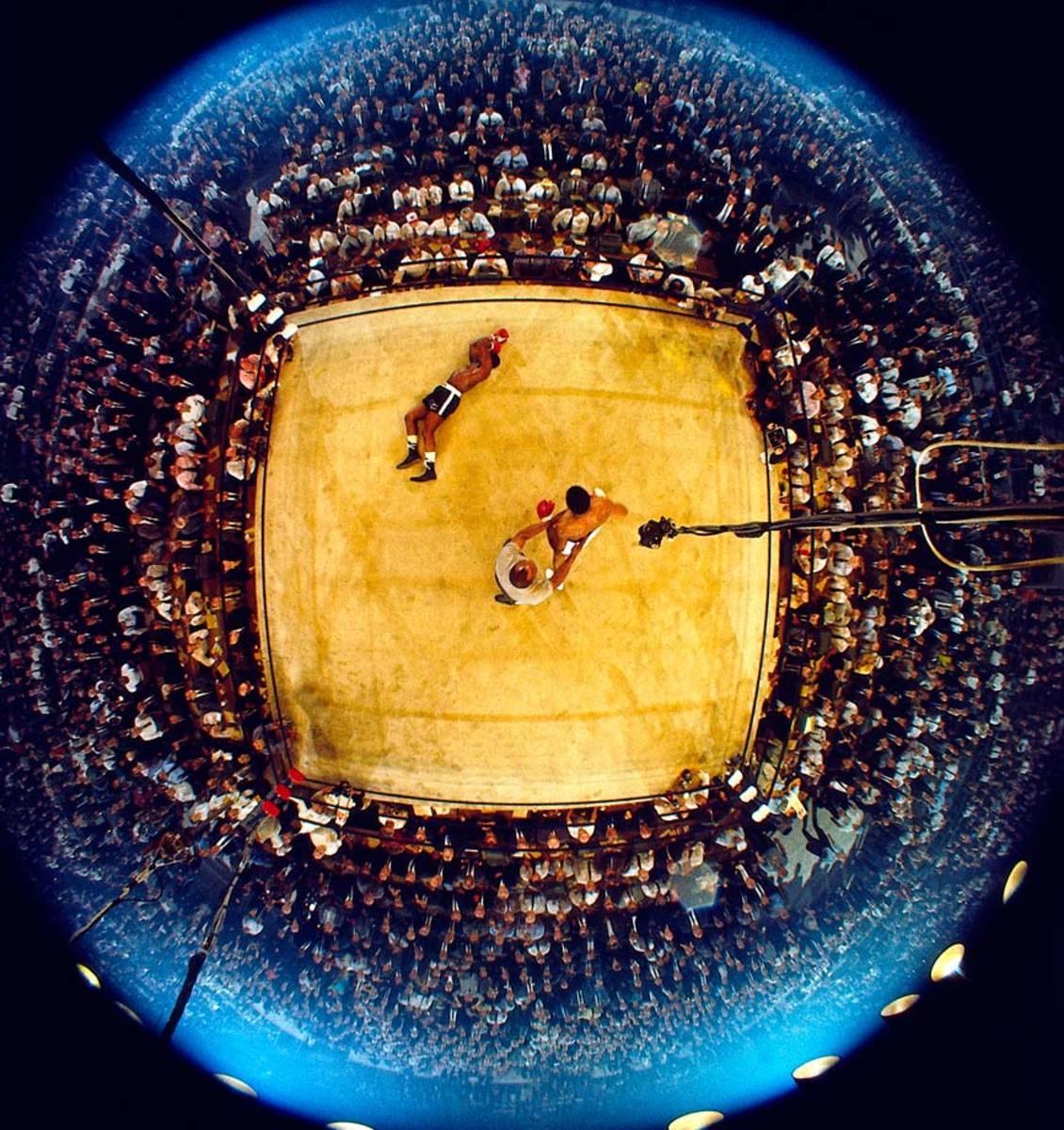
As Liston lingered on the canvas and the referee, former heavyweight champ Jersey Joe Walcott, tried to control Ali, the 2,434 spectators on hand in the Lewiston, Me., hockey arena — a record low for a heavyweight championship fight — tried to make sense of what all that had happened in less than two minutes after the opening bell.
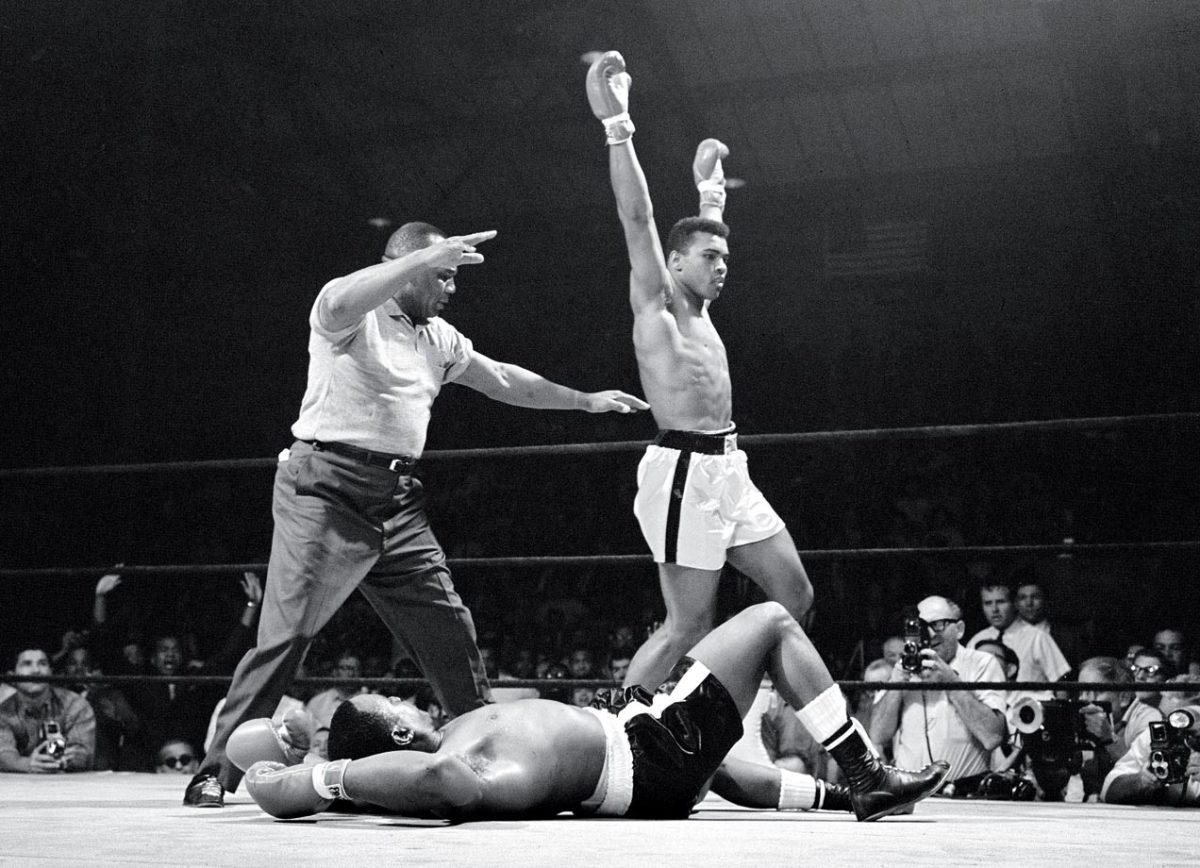
The celebration over Liston continued. In a chaotic ending, Ali was awarded a knockout when Nat Fleischer, publisher of The Ring, informed referee Jersey Joe Walcott from ringside that Liston had been on the canvas for longer than 10 seconds after Ali knocked him down. The bout remains one of the most controversial in boxing history, with many observers insisting that Liston took a dive.
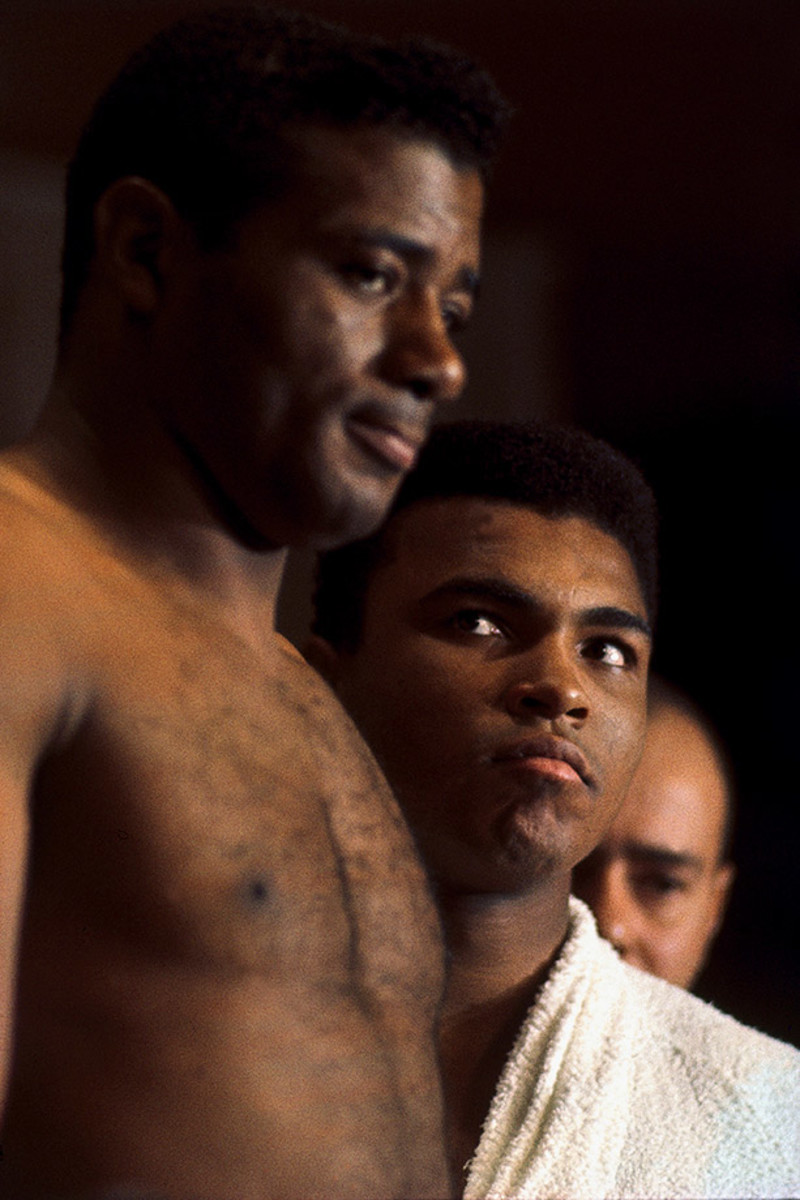
Ali's second title defense came in November 1965, against former two-time heavyweight champion Floyd Patterson. During the build-up to the bout, the normally soft-spoken Patterson earned the new champ's wrath by refusing to call Ali by his Muslim name. At the weigh-in, Ali's glare made it clear that he intended Patterson to pay for the disrespect.
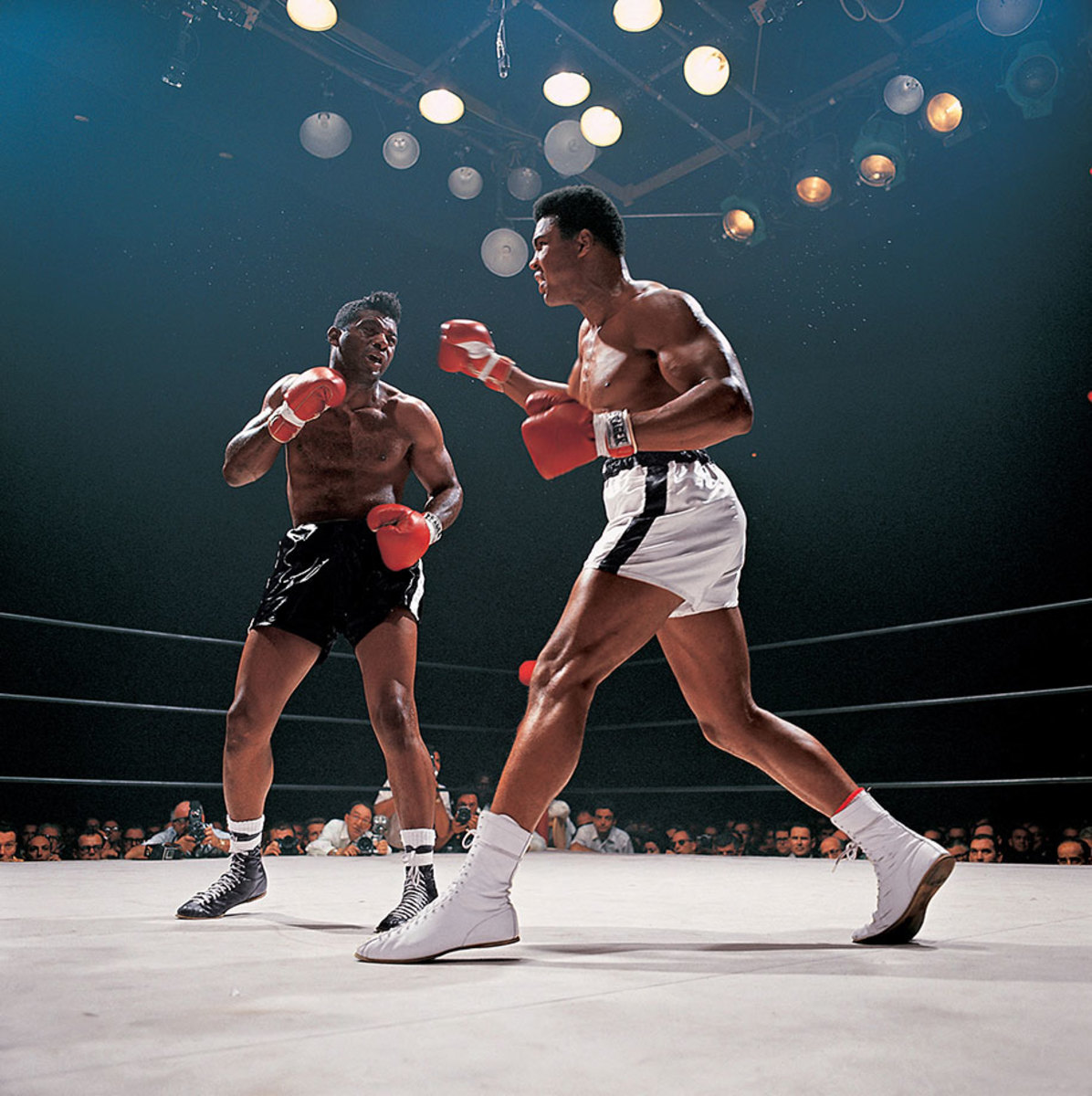
In cruelly efficient performance, Ali punished Patterson — who was hobbled by a painful back injury — seemingly toying with the former champ throughout the bout, hitting him at will and calling, "What's my name?" before finally winning on a 12th-round TKO.
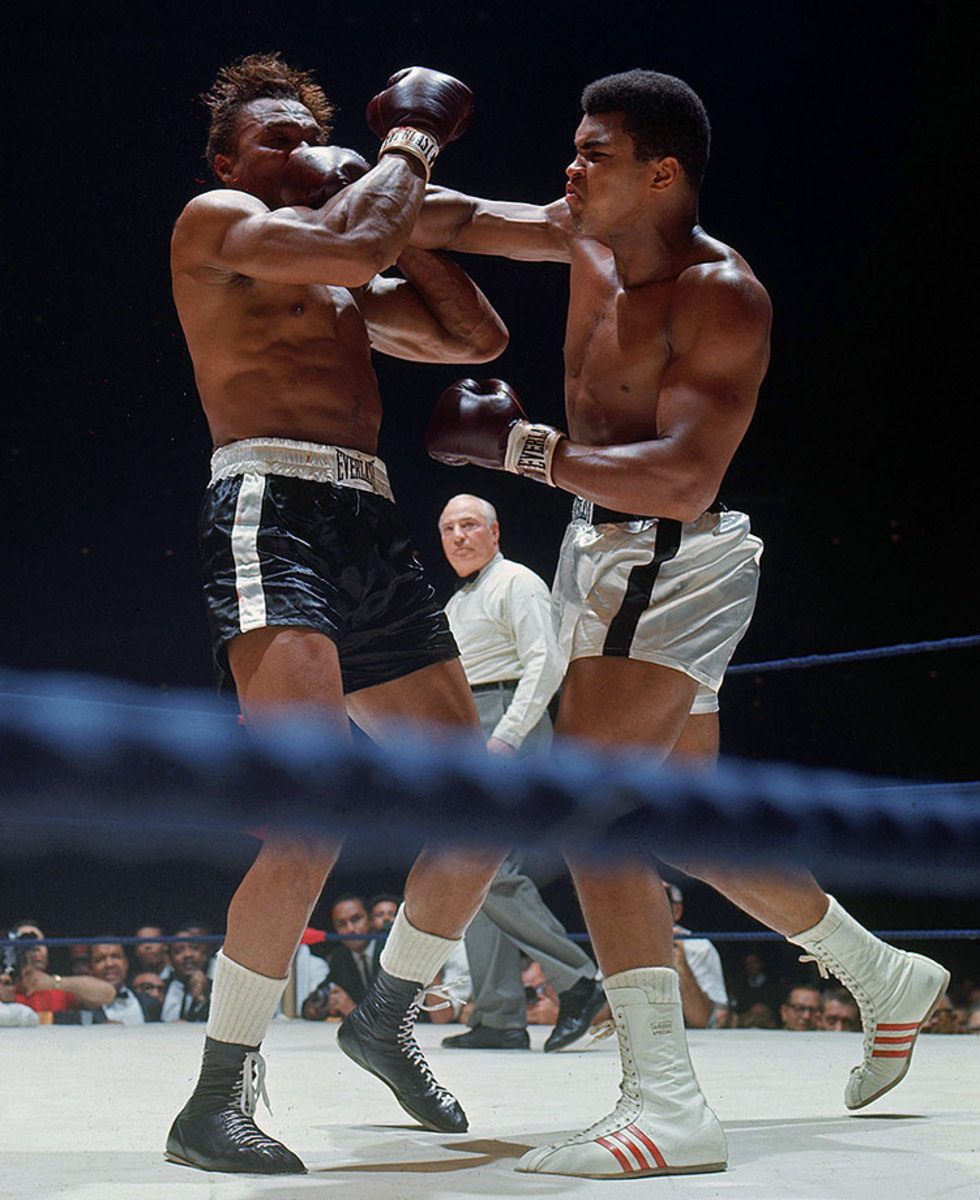
Capping off a five-fight campaign in 1966, Ali faced Cleveland Williams in the Houston Astrodome on Nov. 14. Known as the Big Cat, the heavily-muscled Williams was a power puncher who had racked up 51 knockouts in 71 fights. But he was also 33, barely recovered from a gunshot wound sustained the year before, and up against a young champion very much in his prime. Ali wasted little time in unleashing a withering attack.
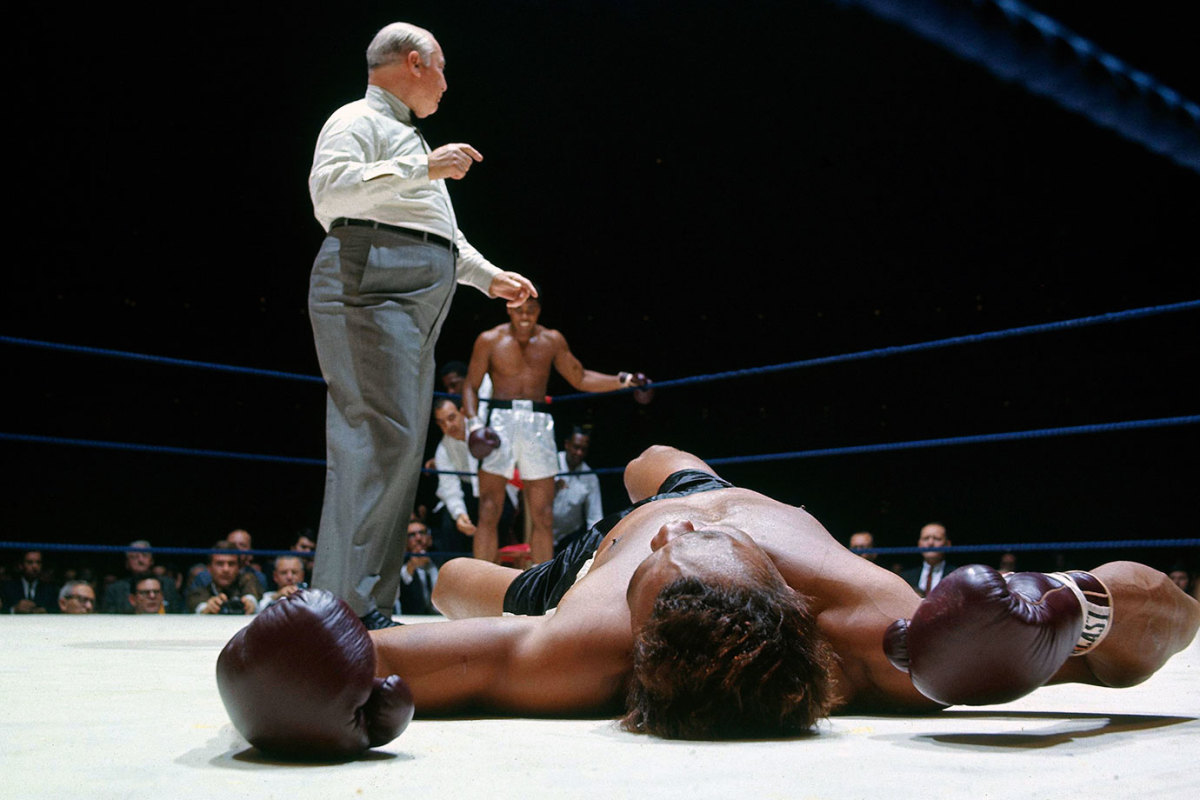
Float and sting: In a display of speed and combination punching unmatched in heavyweight history, Ali overwhelmed Williams from the start. The challenger, here down for the third time in round 2, would be saved by the bell before referee Harry Kessler could count him out, but it would only postpone the inevitable.
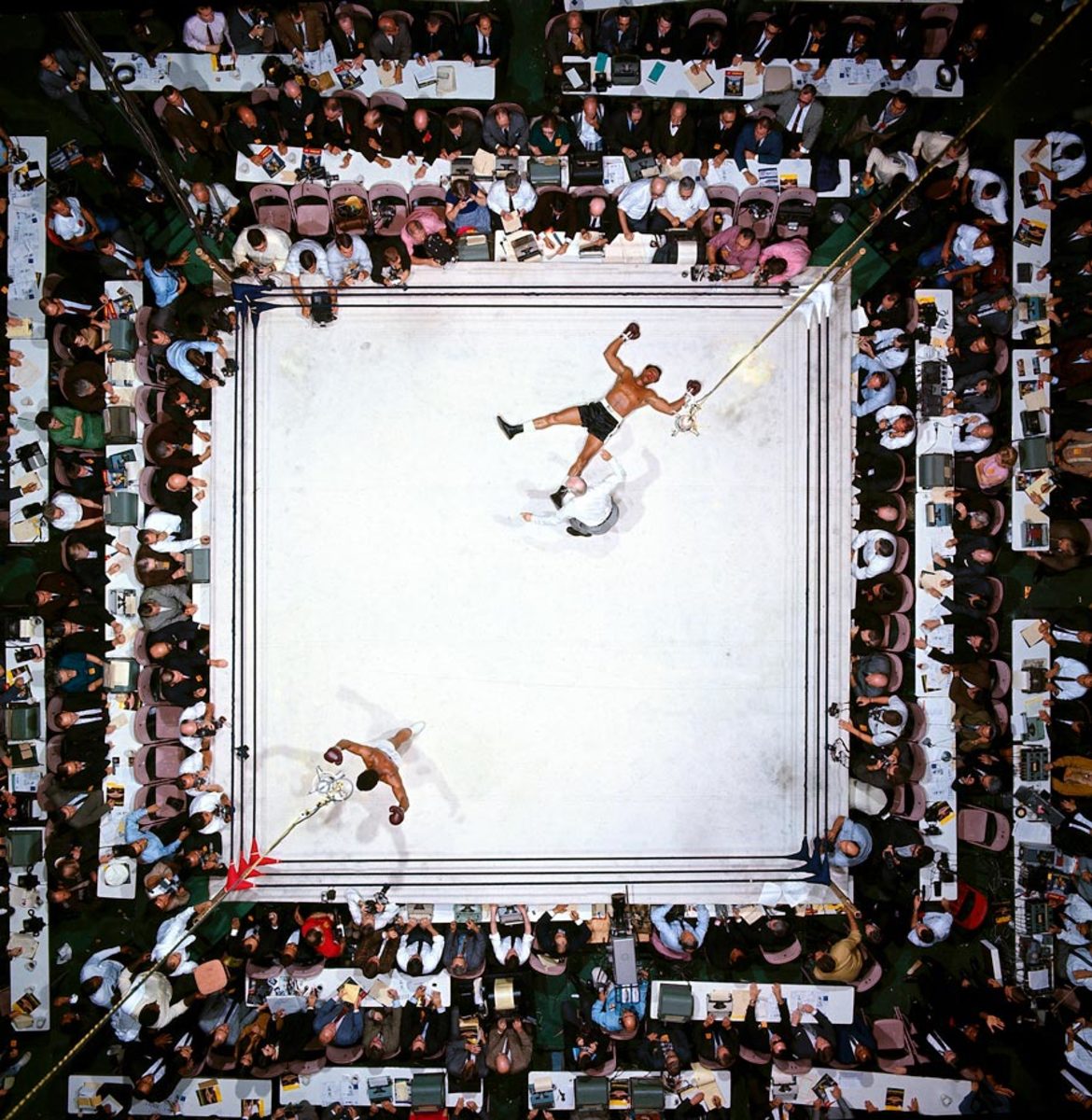
Ali dropped Williams again early in the third round, and Kessler waved the mismatch over at 1:08 of the third.
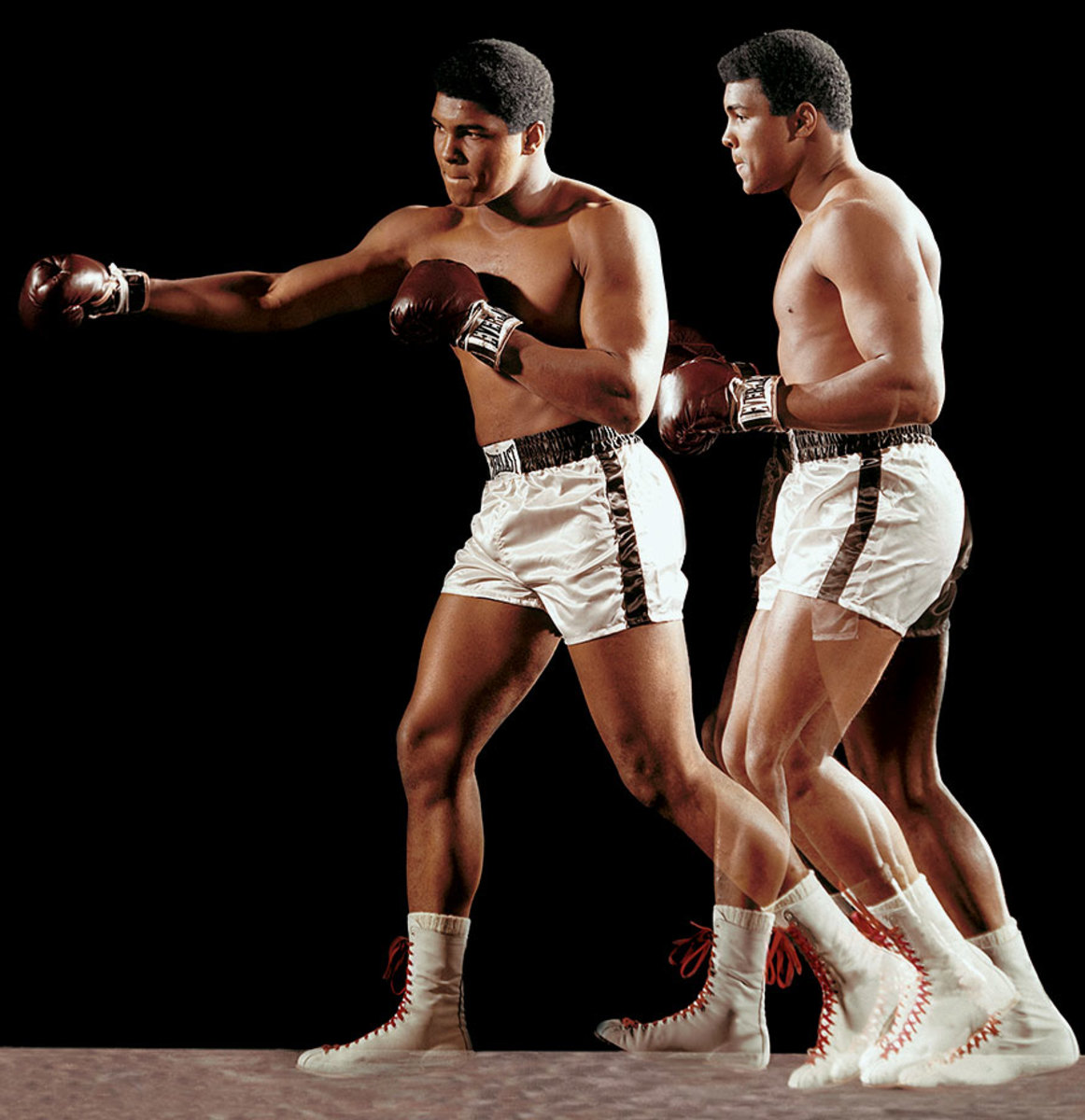
In a multiple-exposure portrait, Ali demonstrates his signature double-clutch shuffle during a photo shoot in December 1966.
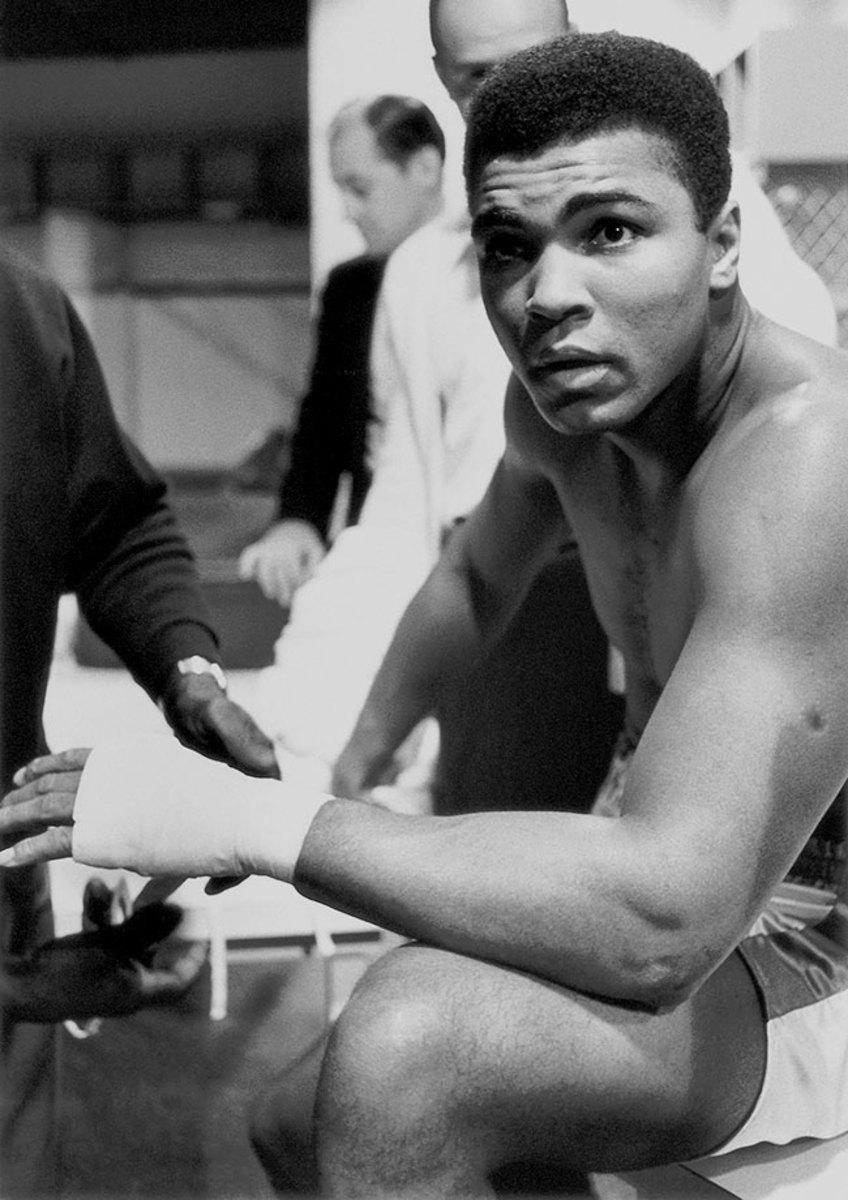
Ali sits in the locker room before his February 1967 fight against Ernie Terrell. Like Patterson before him, Terrell refused to call the champion by his Muslim name. Also like Patterson, he paid a stiff price, as Ali punished Terrell for 15 ugly rounds before winning by unanimous decision.
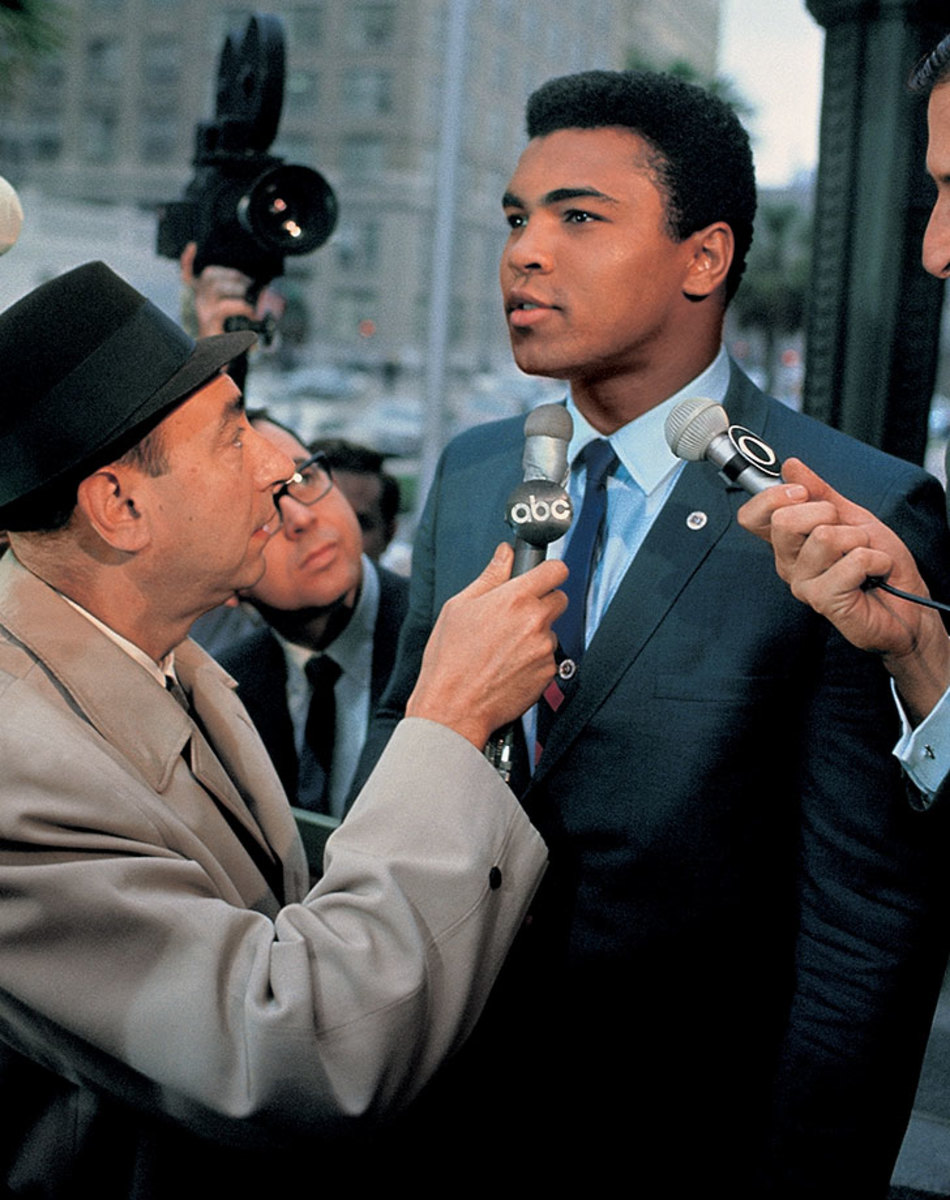
Outside the Armed Forces Examining and Entrance Station in Houston in April 1967, Ali spoke to the press about his refusal to be inducted into military service. Among those on hand was ABC's Howard Cosell, who would be a staunch supporter of the fighter's stance. The decision cost Ali his boxing license and his heavyweight title, and he was sentenced to five years in prison but remained free pending an appeal.
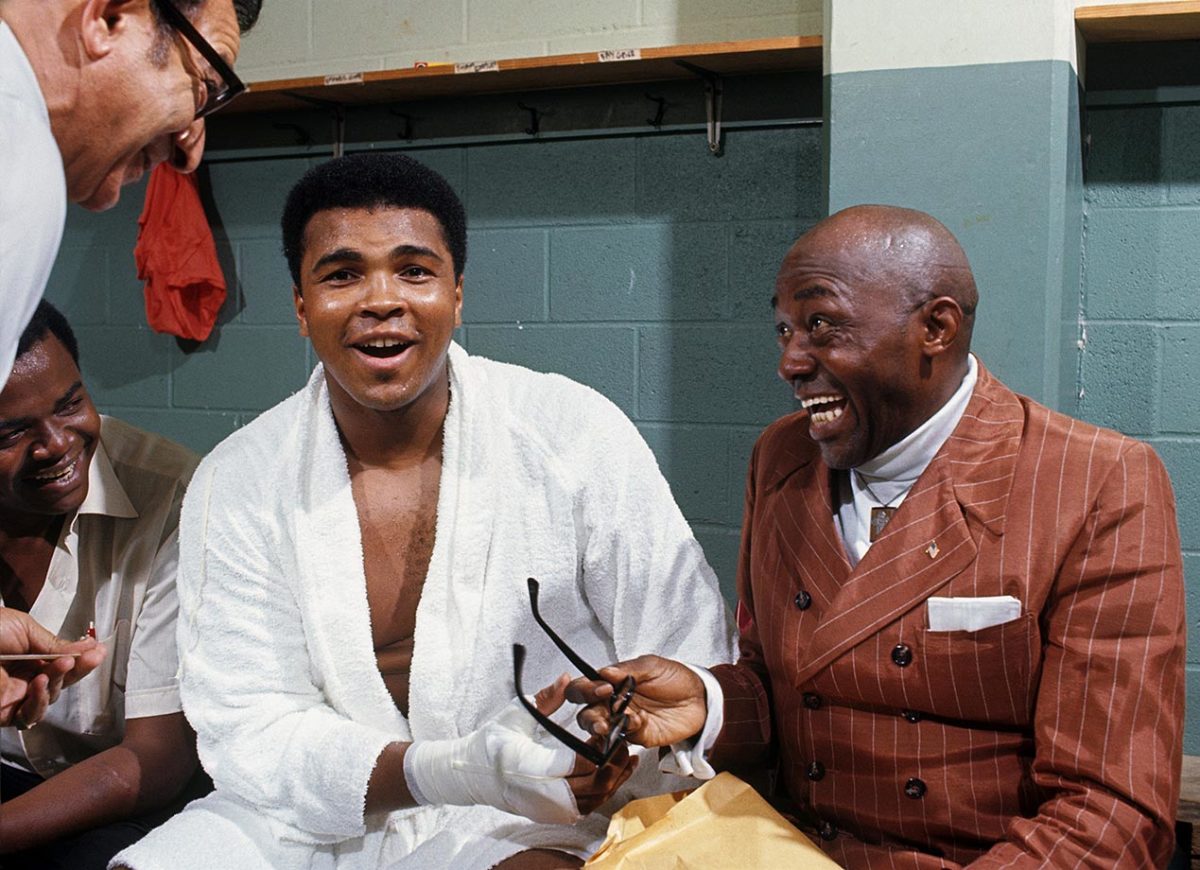
In professional exile for three and a half years because of his draft case, Ali sought to return to boxing in 1970. He began with a night of exhibition bouts at Morehouse College in Atlanta, where before going into the ring, he shared a locker room laugh with actor and comedian Lincoln Perry (right), better known by his stage name of Stepin Fetchit. The friendship between the two black icons would later be examined in an acclaimed play by Will Power, Fetch Clay, Make Man.
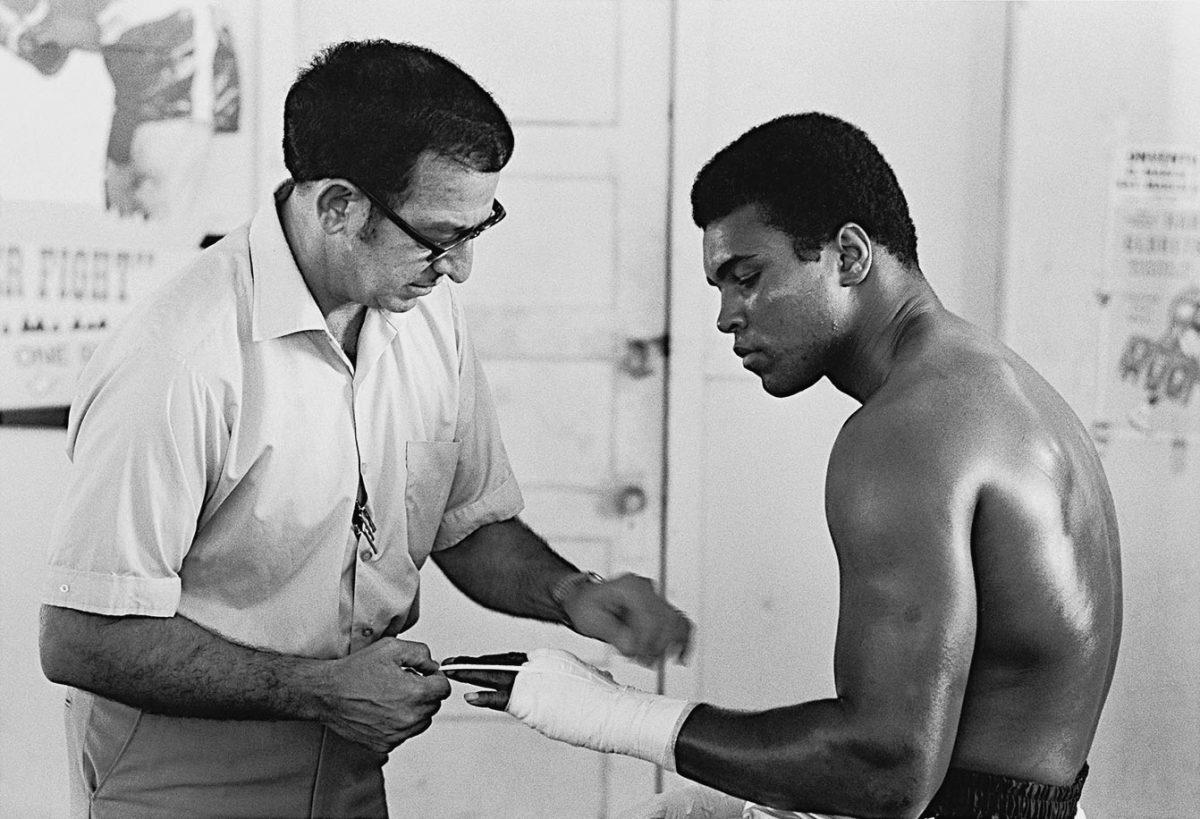
After the Atlanta Athletic Commission at last granted Ali a license, the deposed champion went back into serious training. He was, as ever, in the capable hands of trainer Angelo Dundee, here wrapping boxing's most famous fists at the 5th Street Gym in Miami in October 1970.
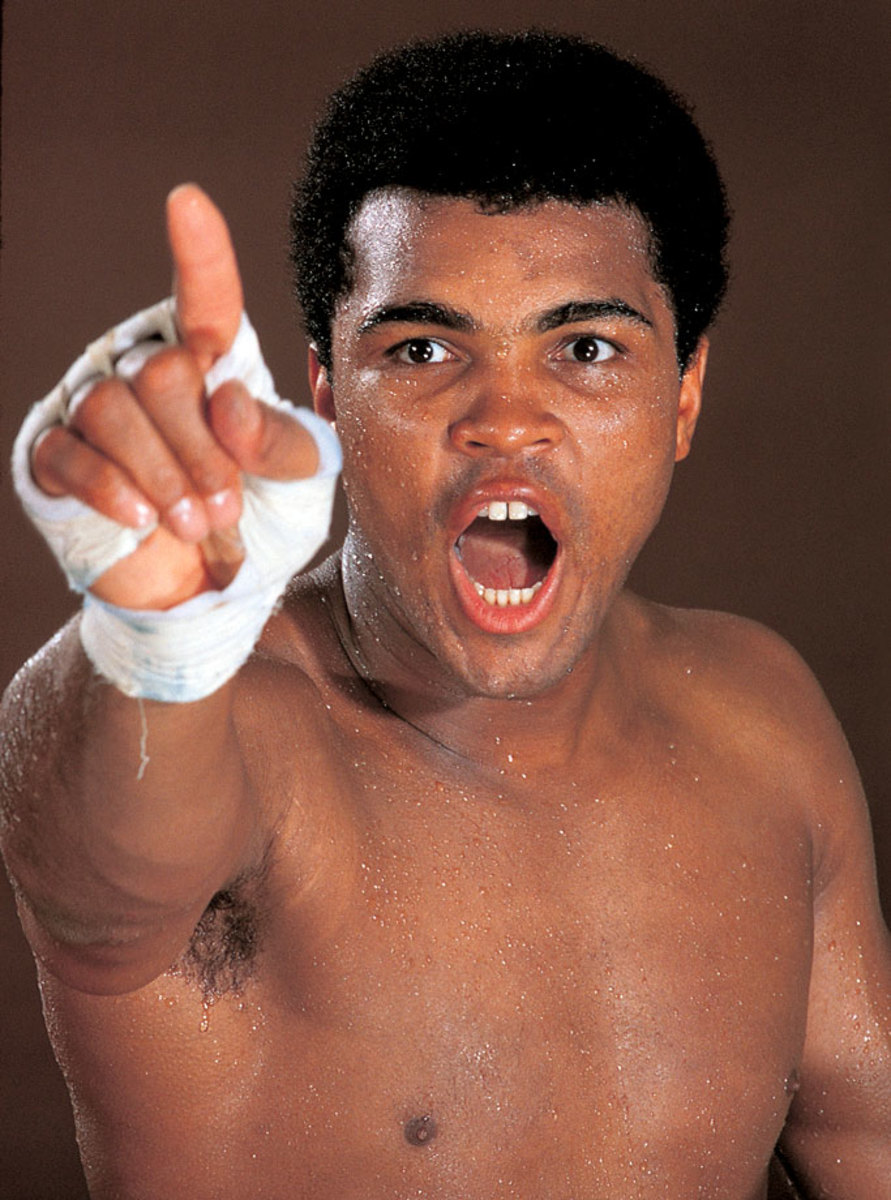
With his return to the ring scheduled for Oct. 26, 1970 in Atlanta, against dangerous contender Jerry Quarry, Ali made it clear to all who would listen that he was on a mission to reclaim the title that had been stripped of him.
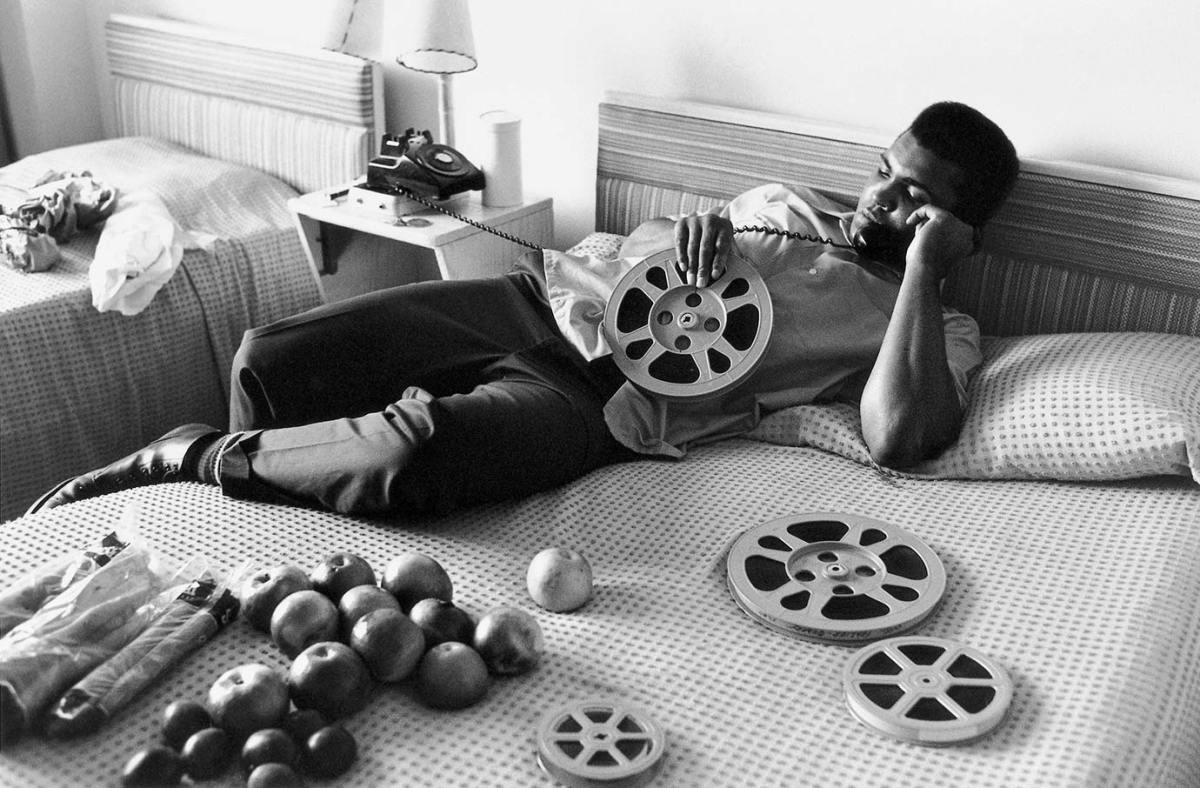
Reel to spiel: For the ever-loquacious Ali, even a rare moment of down time — like this afternoon in 1970 in a Miami hotel room — was a chance to do some talking.
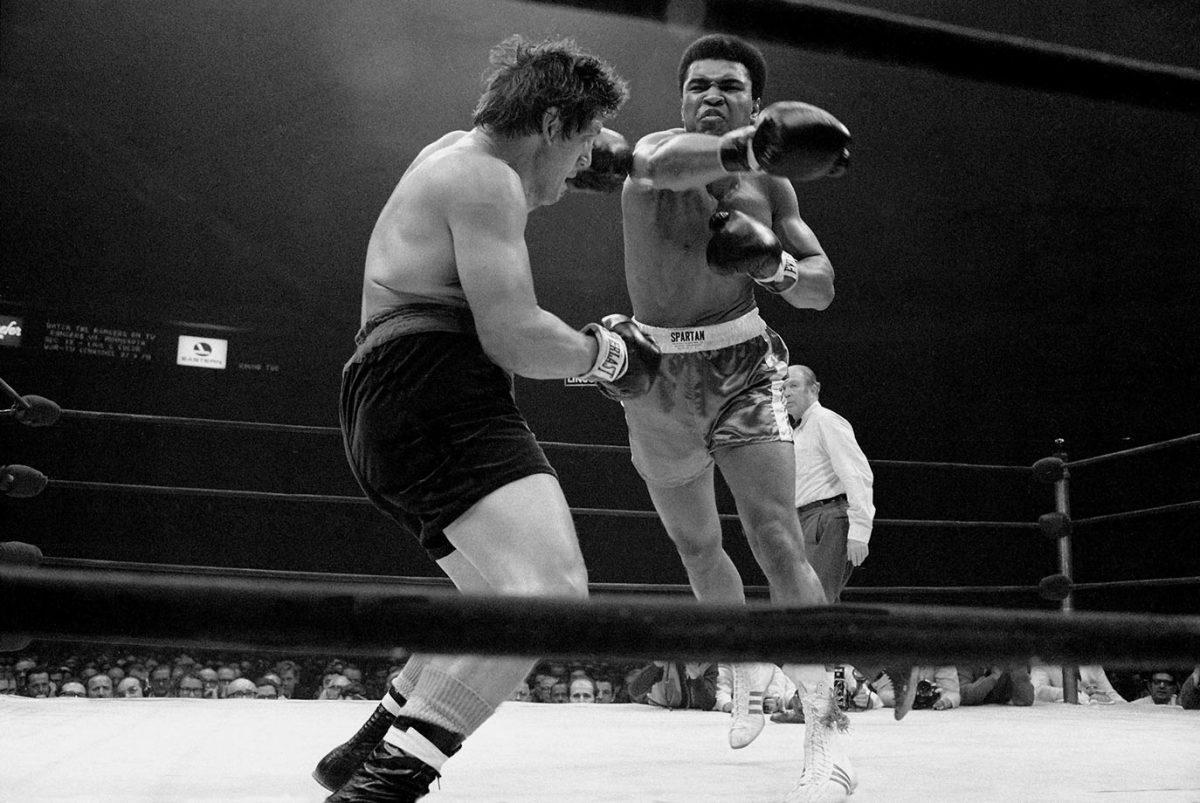
Despite Ali's long layoff, his comeback campaign would include no easy tune-up bouts. He stopped Quarry in three rounds on Oct. 26, 1970, then, just six weeks later — an unthinkably short interlude by today's standards — took on Argentine contender Oscar Bonavena in Madison Square Garden. Here, Ali fires a right at the rugged and awkward Bonavena, who took the fight to the former champion all night.
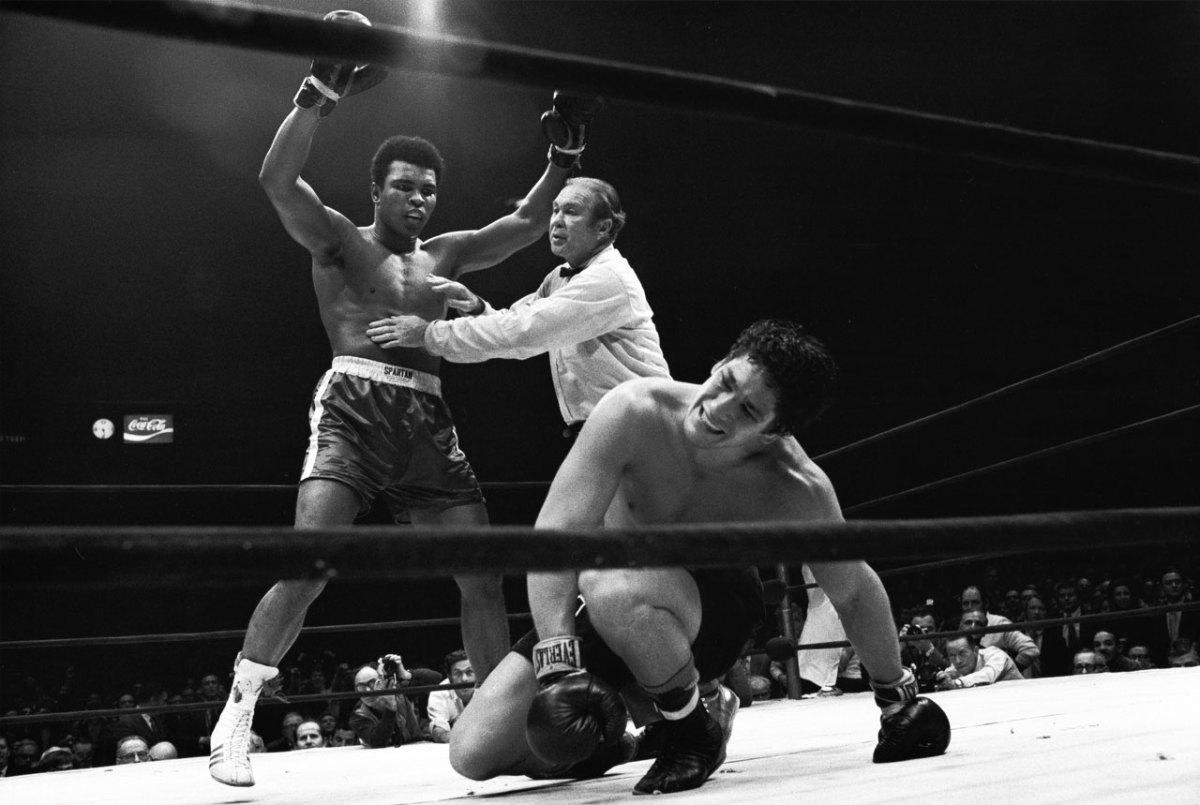
After a long, often sloppy bout, Ali — here being held back by referee Mark Conn — produced one of the most dramatic finishes of his career, dropping Bonavena three times in the 15th and final round to automatically end the fight. The win cleared the way for a showdown with Joe Frazier, the man who had taken the heavyweight title in Ali's absence.
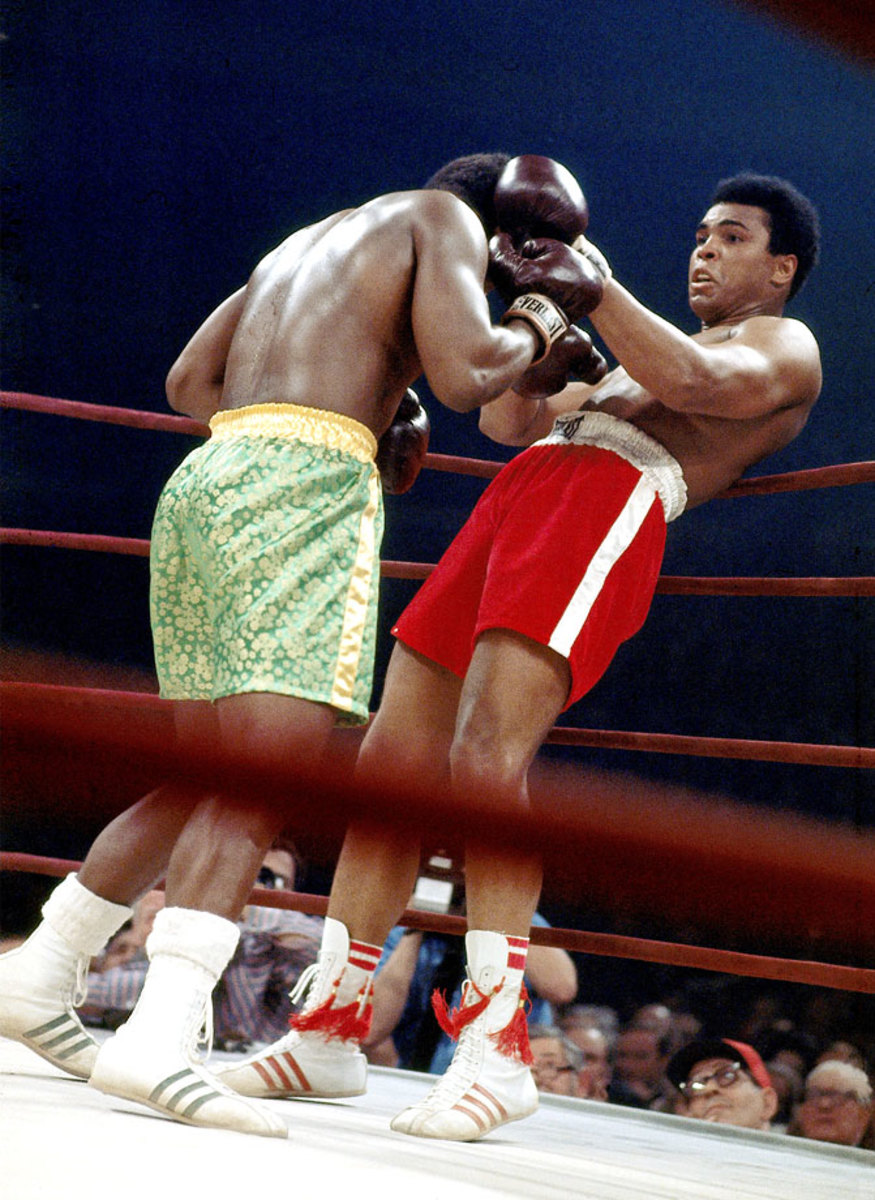
On the night of March 8, 1971, the eyes of the world were on a square patch of white canvas in the center of Madison Square Garden. There, Ali and Joe Frazier met in what was billed at the time simply as The Fight, but has come to be known, justifiably, as the Fight of the Century. For 15 rounds the two undefeated heavyweights battled at a furious pace, with each man sustaining tremendous punishment. In the end Frazier prevailed, dropping Ali in the final round with a tremendous left hook to seal a unanimous decision and hand The Greatest his first loss in 32 professional fights.
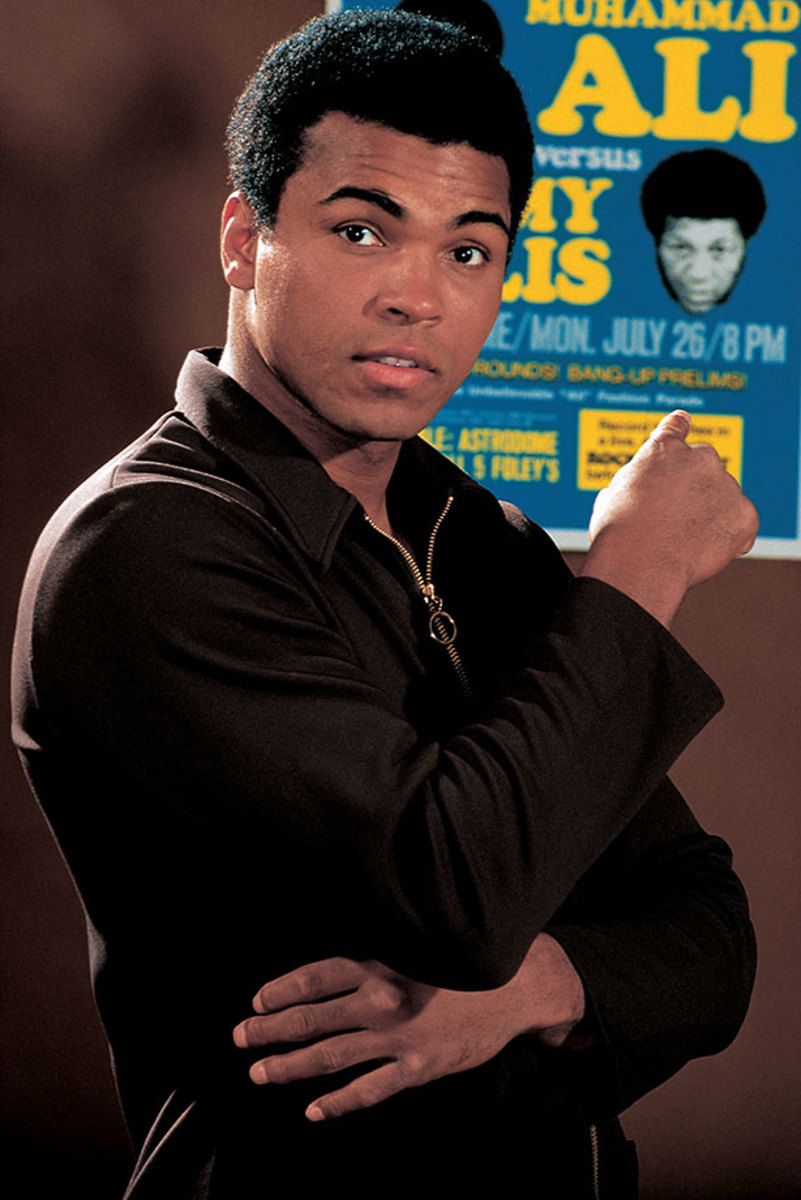
Ali poses with the fight poster for his upcoming fight against Jimmy Ellis during a photo shoot in July 1971. Ellis was an old friend of Ali's — both were trained by Angelo Dundee — and knew his fighting style well from many rounds of sparring.
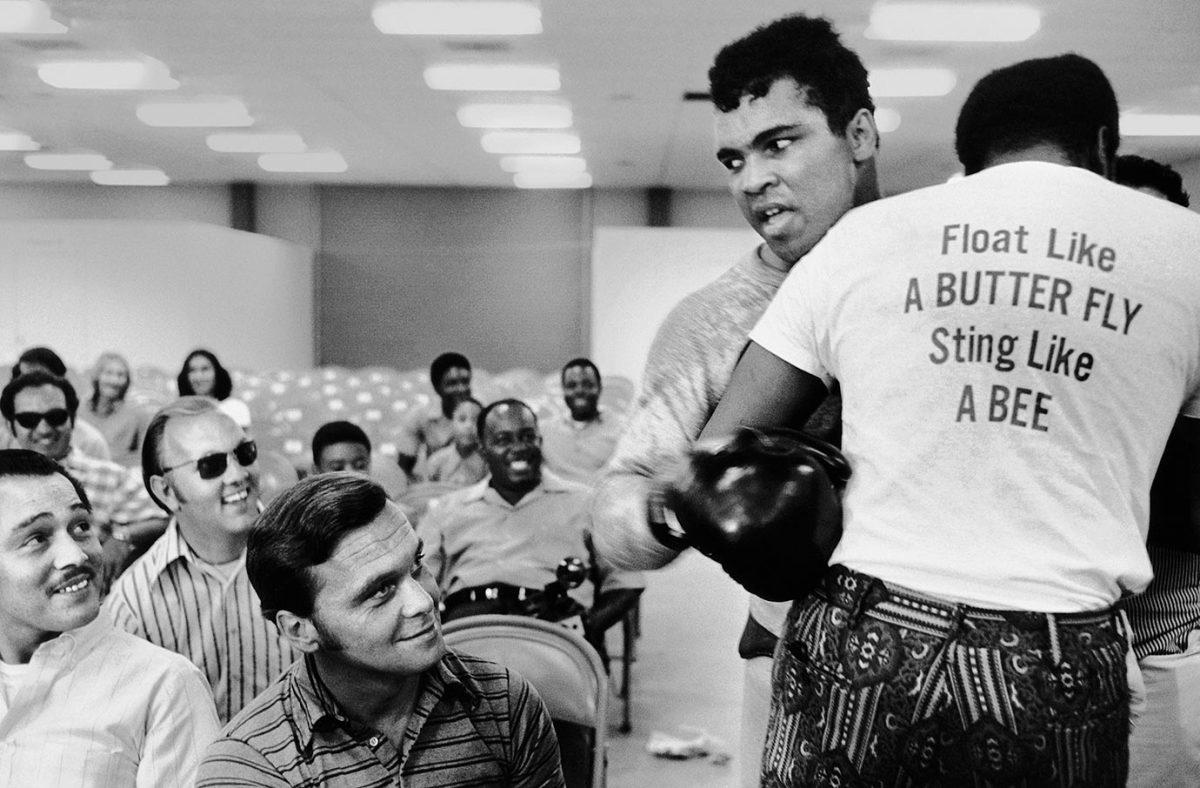
For those sportswriters lucky enough to cover Ali on a regular basis, each day brought surprises and, more often than not, plenty of laughs. of Trainer Drew Bundini Brown helps Ali train for his fight against Ellis. Ali won the bout by technical knockout in the 12th round to claim the vacant NABF heavyweight title.
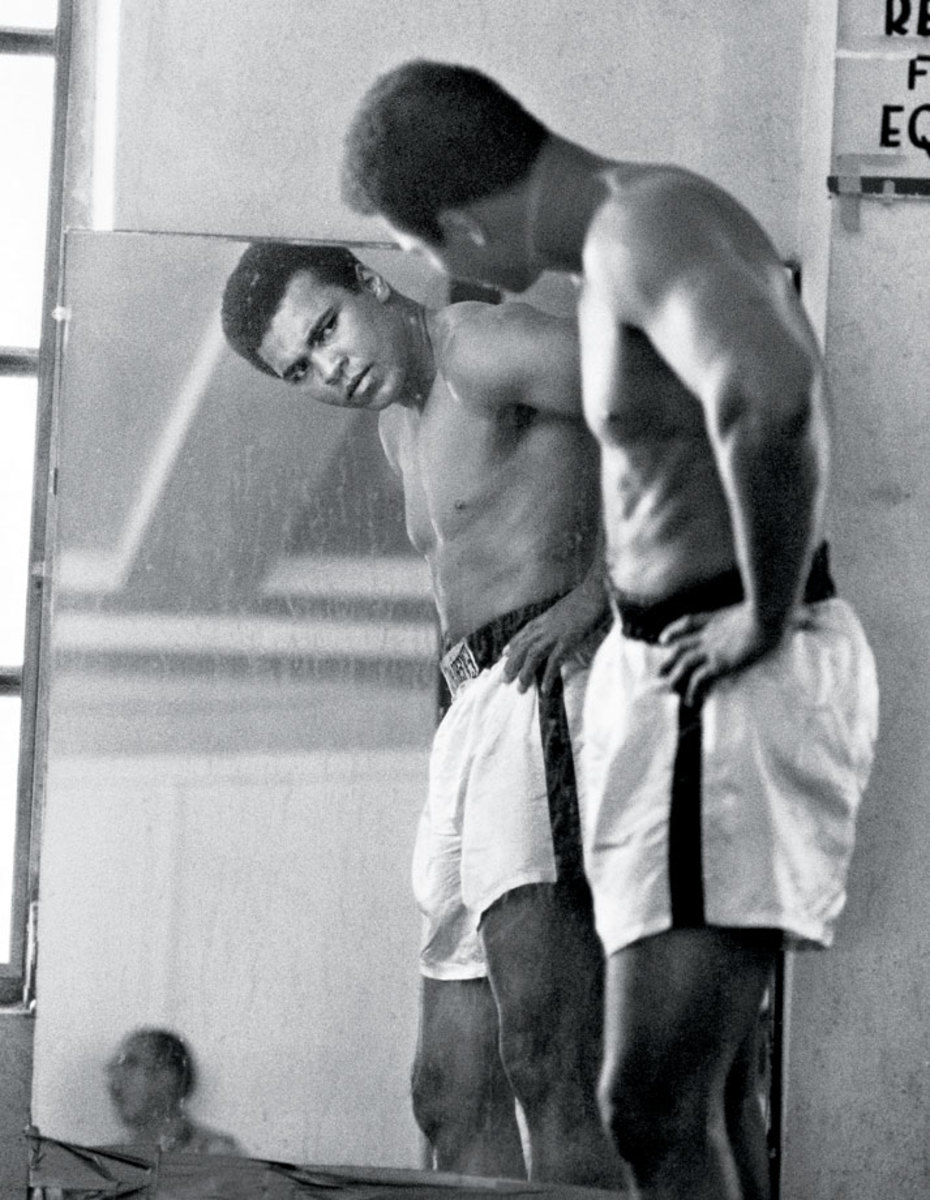
The man in the mirror stares back as Ali examines himself while training for a fight in 1972. He won all six of his fights that year.

The Louisville Lip stands next to George Foreman before Ali's fight versus Jerry Quarry in June 1972. Ali won by technical knockout in the seventh round. Foreman at the time was 36-0. Ali would not get his shot against Foreman for more than two years.
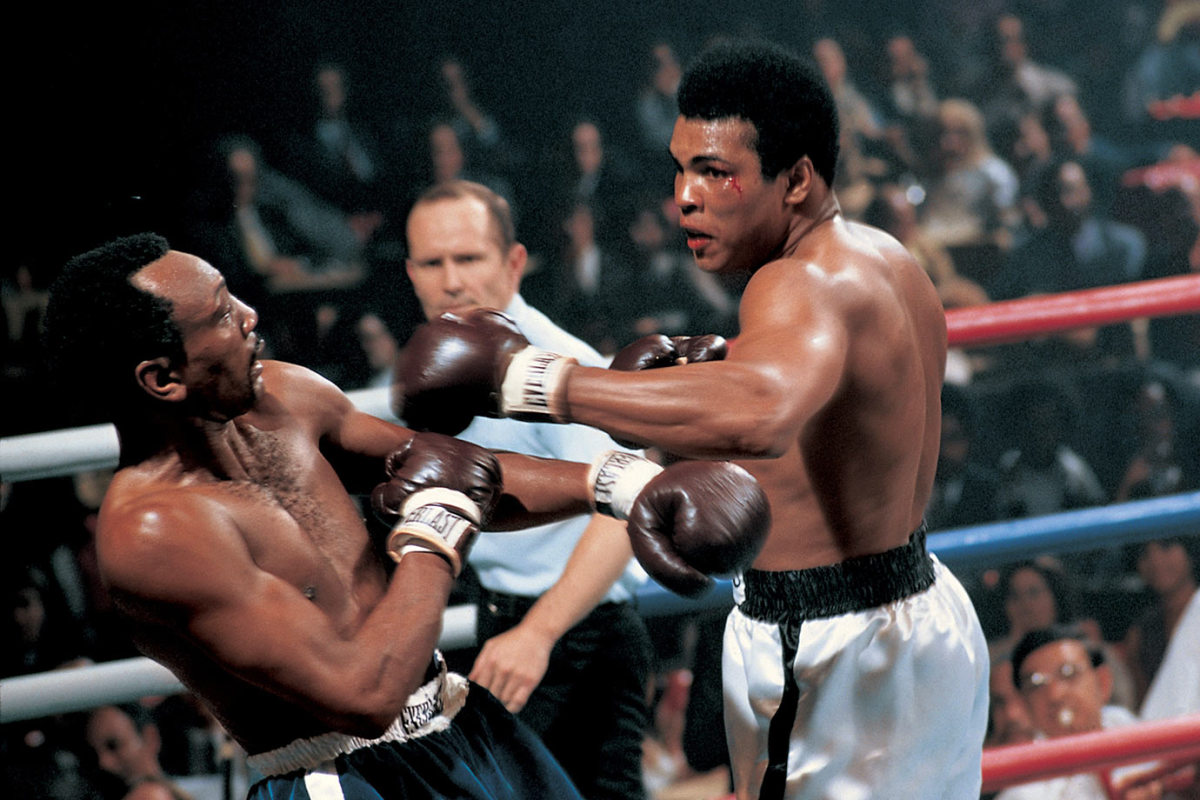
Ali throws a left hook at Bob Foster in their 1972 fight at Stateline, Nev. Although Ali knocked Foster out, Foster did leave his mark: a cut above Ali's left eye, his first as a professional.
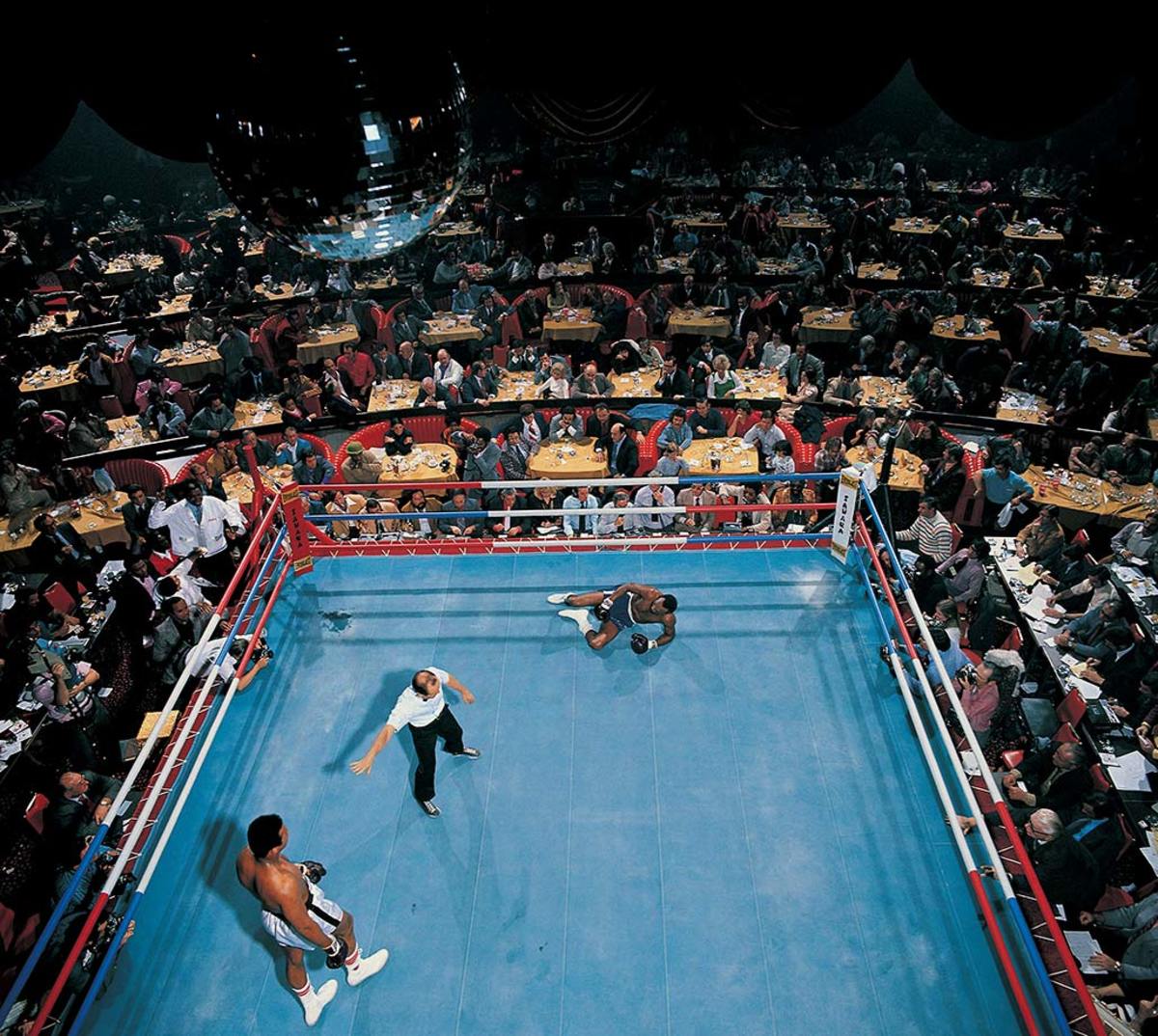
Foster lies on the canvas after getting knocked down by Ali. Ali knocked Foster down four times in the fifth round and twice more in the seventh round before he was finally counted out after Ali knocked him down again in the eighth round.
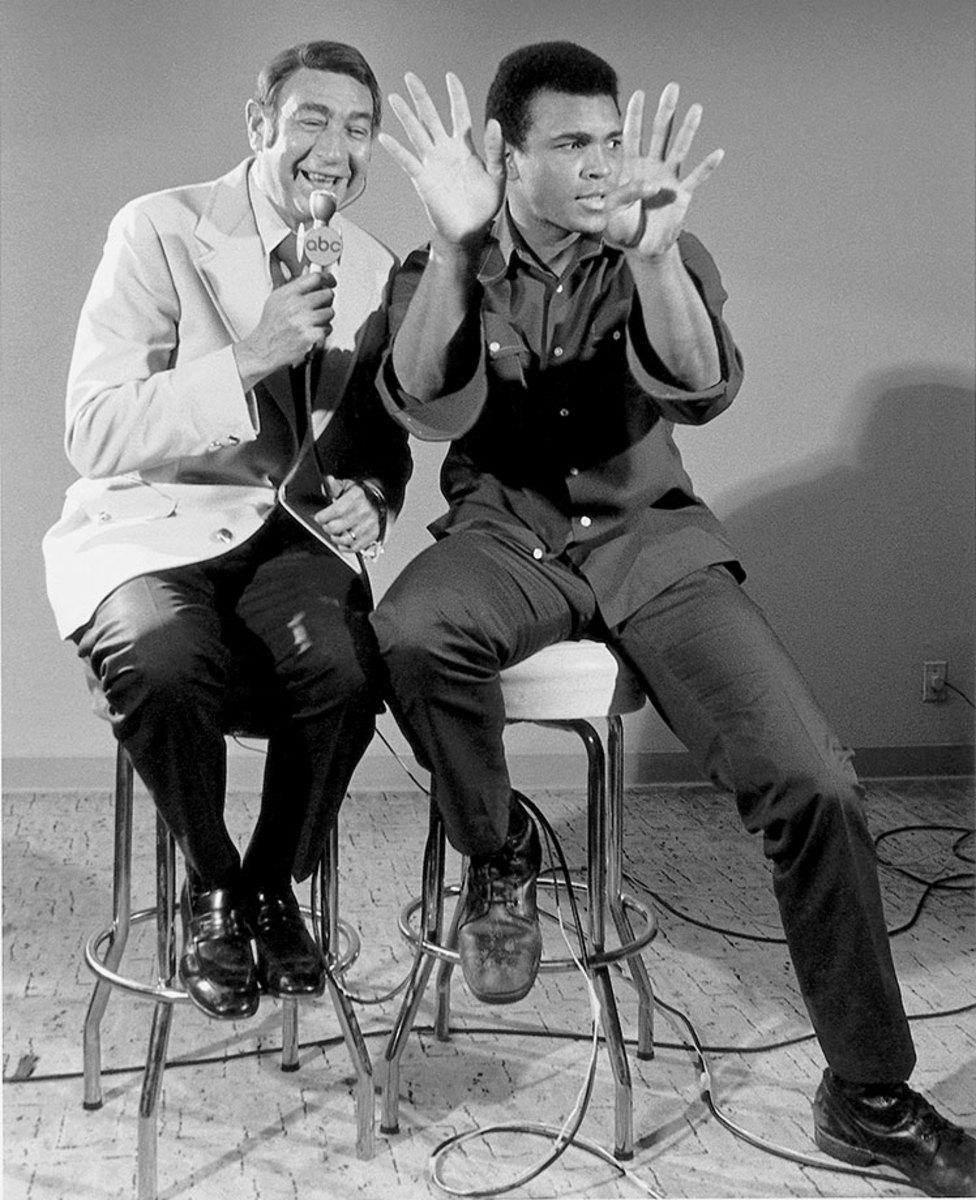
Ali sits with sportscaster Howard Cosell before his fight with Joe Bugner in February 1973. Although unable to knock Bugner out, Ali won comfortably by unanimous decision.
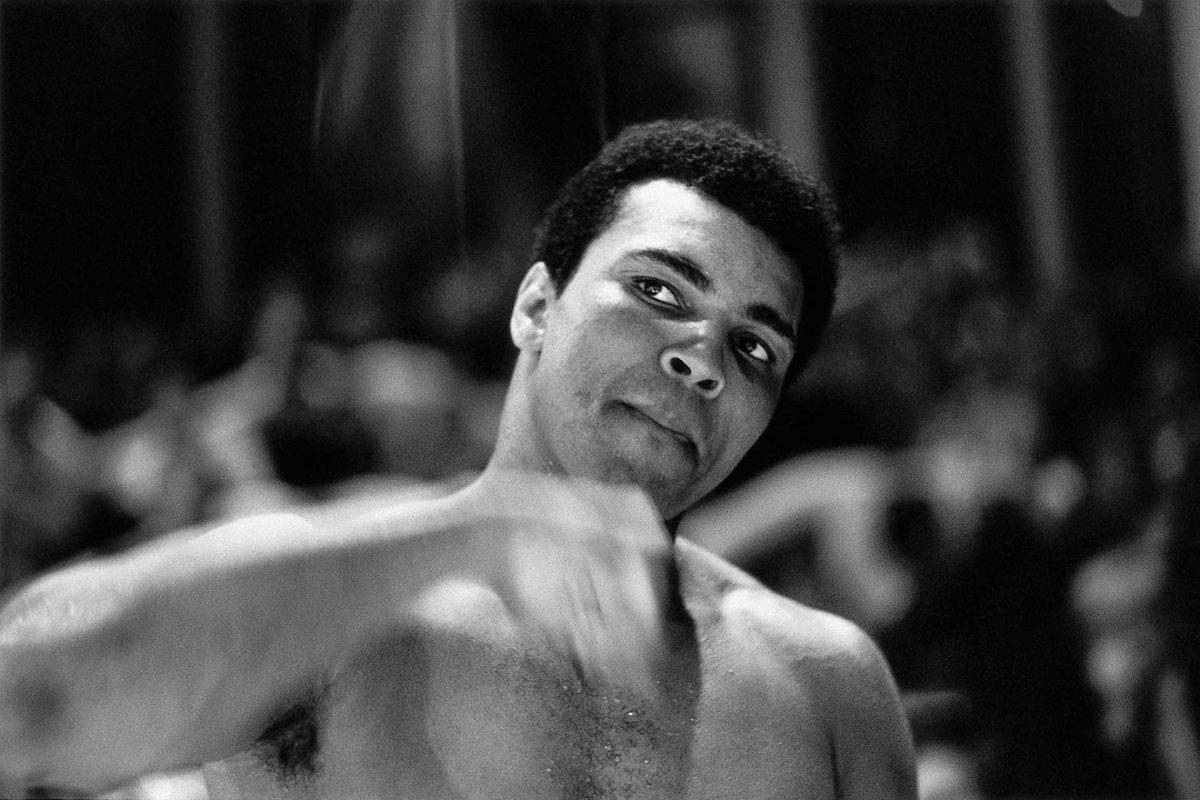
Ali hits a speed bag while warming up for his bout with Bugner in Las Vegas. Ali prepared ferociously for the fight, training 67 rounds the week leading up to the fight, including six rounds the day before the fight.
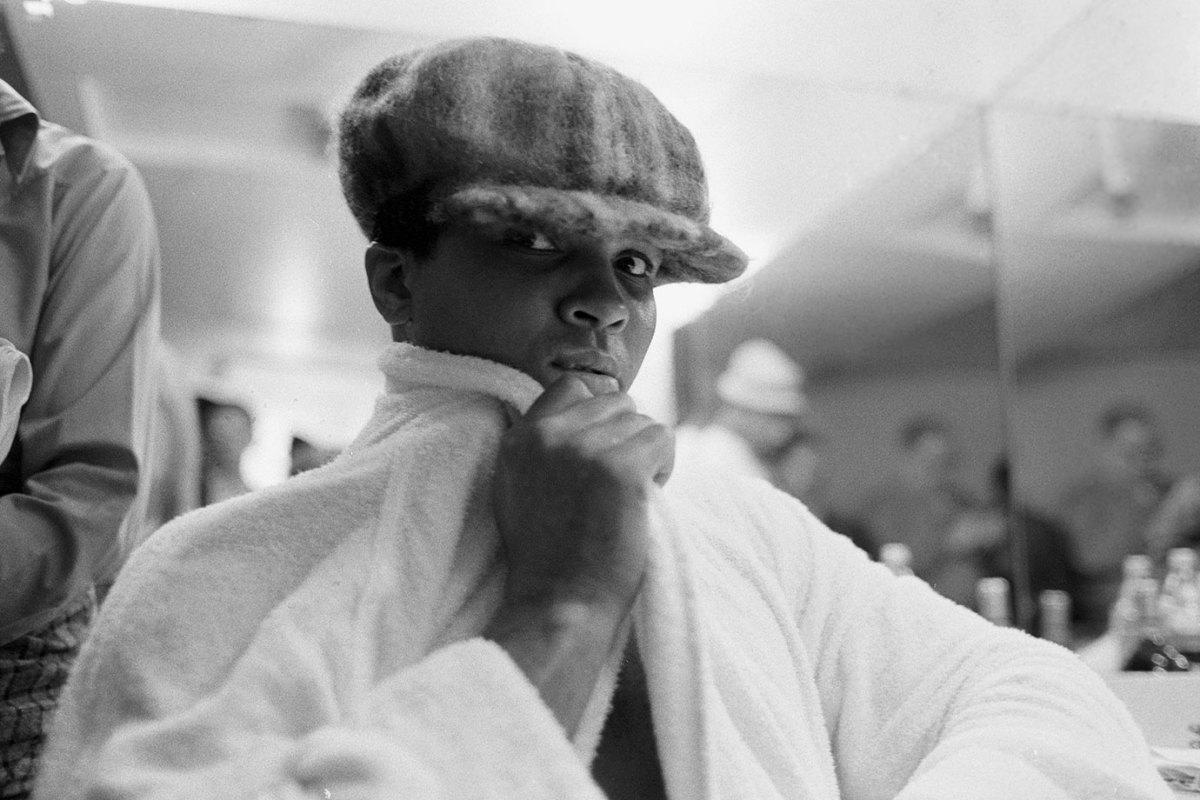
In a lighter pre-fight moment, Ali poses for a portrait wearing a hat in his dressing room before the match with Bugner.
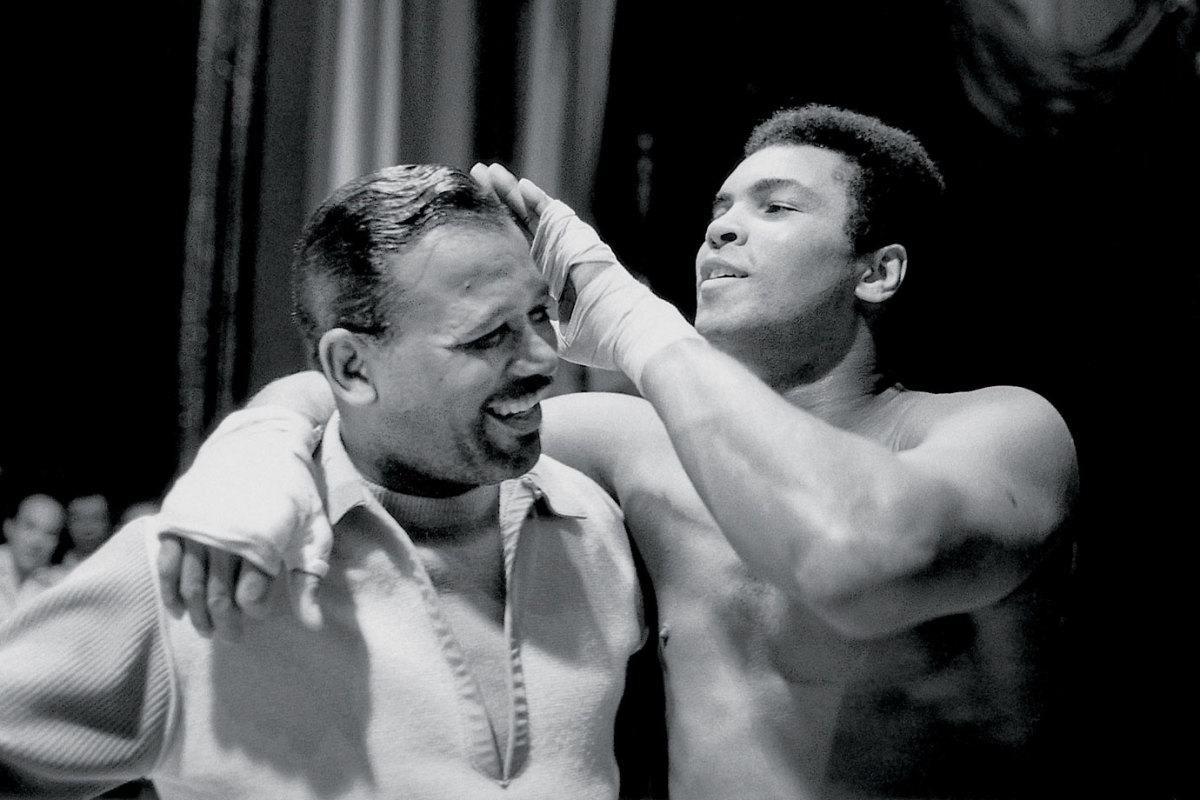
Ali plays with Sugar Ray Robinson's hair in the locker room before his bout with Bugner. The former welterweight and middleweight champion was Ali's childhood idol.
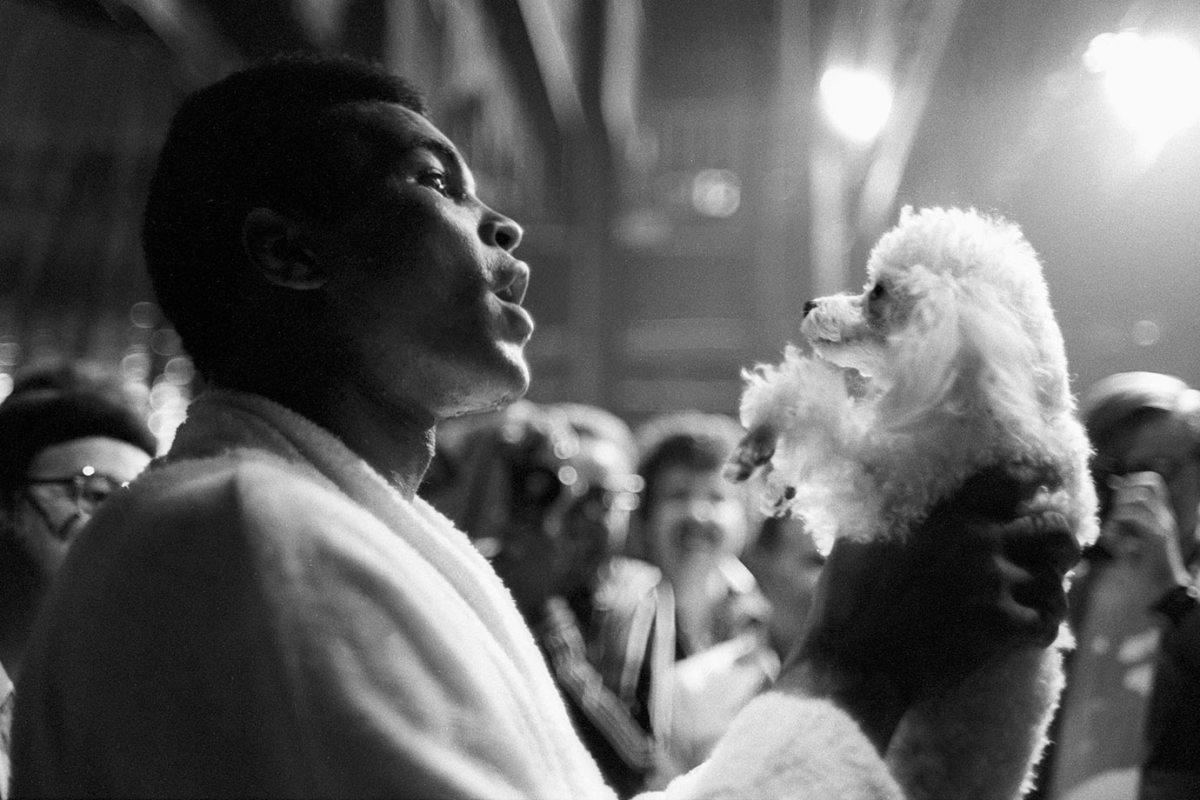
Before the fight with Bugner, Muhammad Ali enjoys a relaxed moment with a poodle at Caesars Palace Hotel. He won the fight with Bugner by unanimous decision.
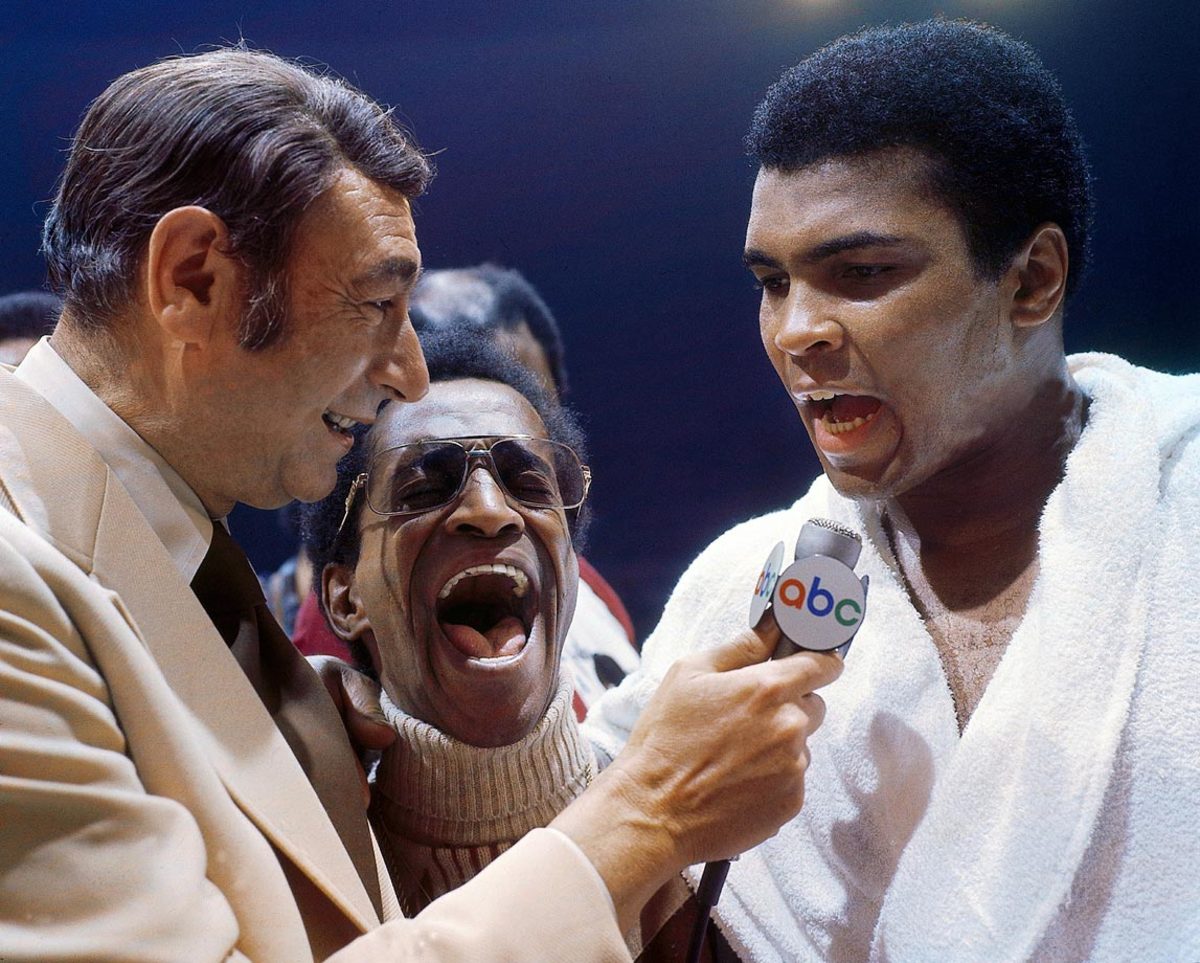
Howard Cosell interviews Ali, with entertainer Sammy Davis Jr. in the middle, after his victory over Joe Bugner by unanimous decision in. Although the fight was never in jeopardy of getting away from him, Ali praised Bugner's legs and said he could be a champion in a few years.
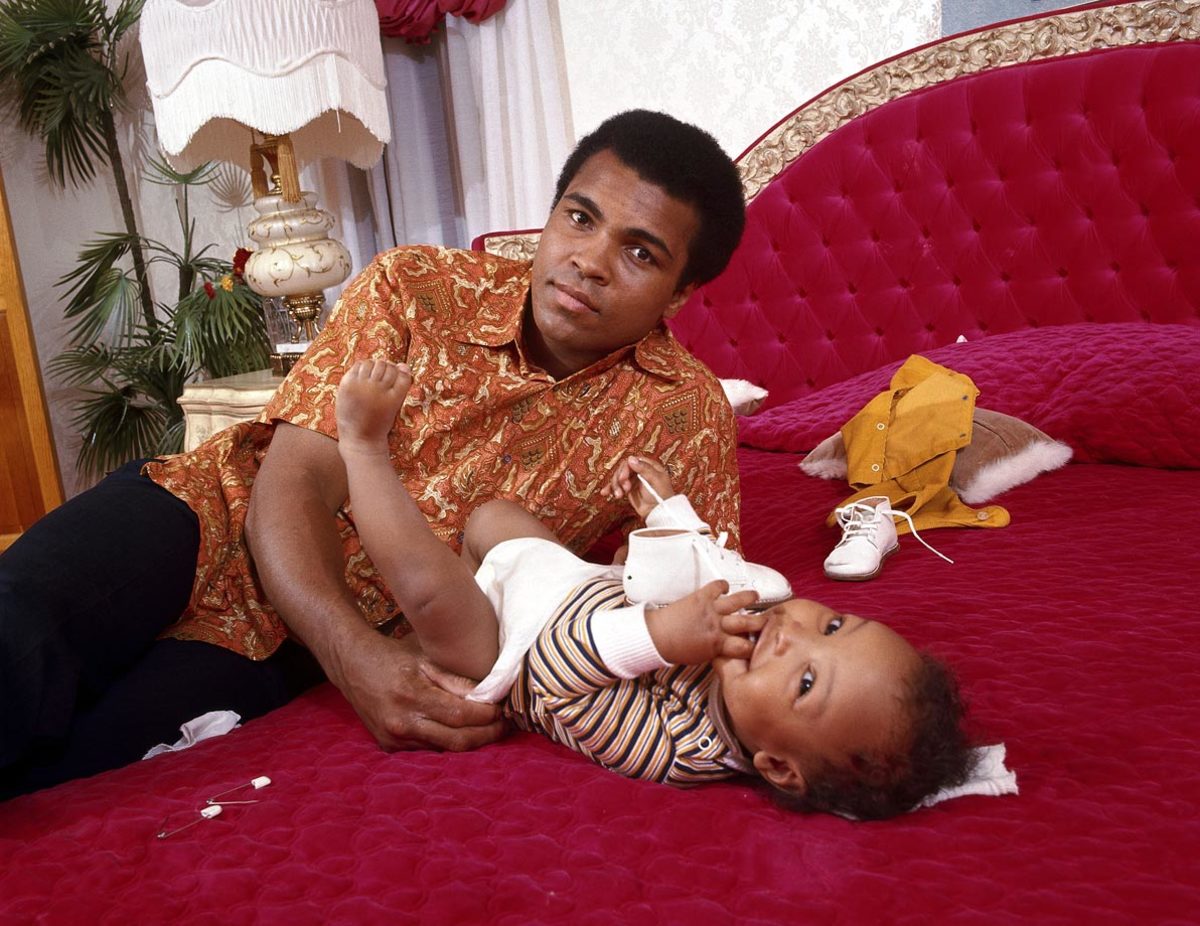
Ali changes the diaper of his son in his bedroom during a photo shoot at the family's home in April 1973. Ali had suffered a broken jaw less than a month earlier in his fight against Ken Norton.
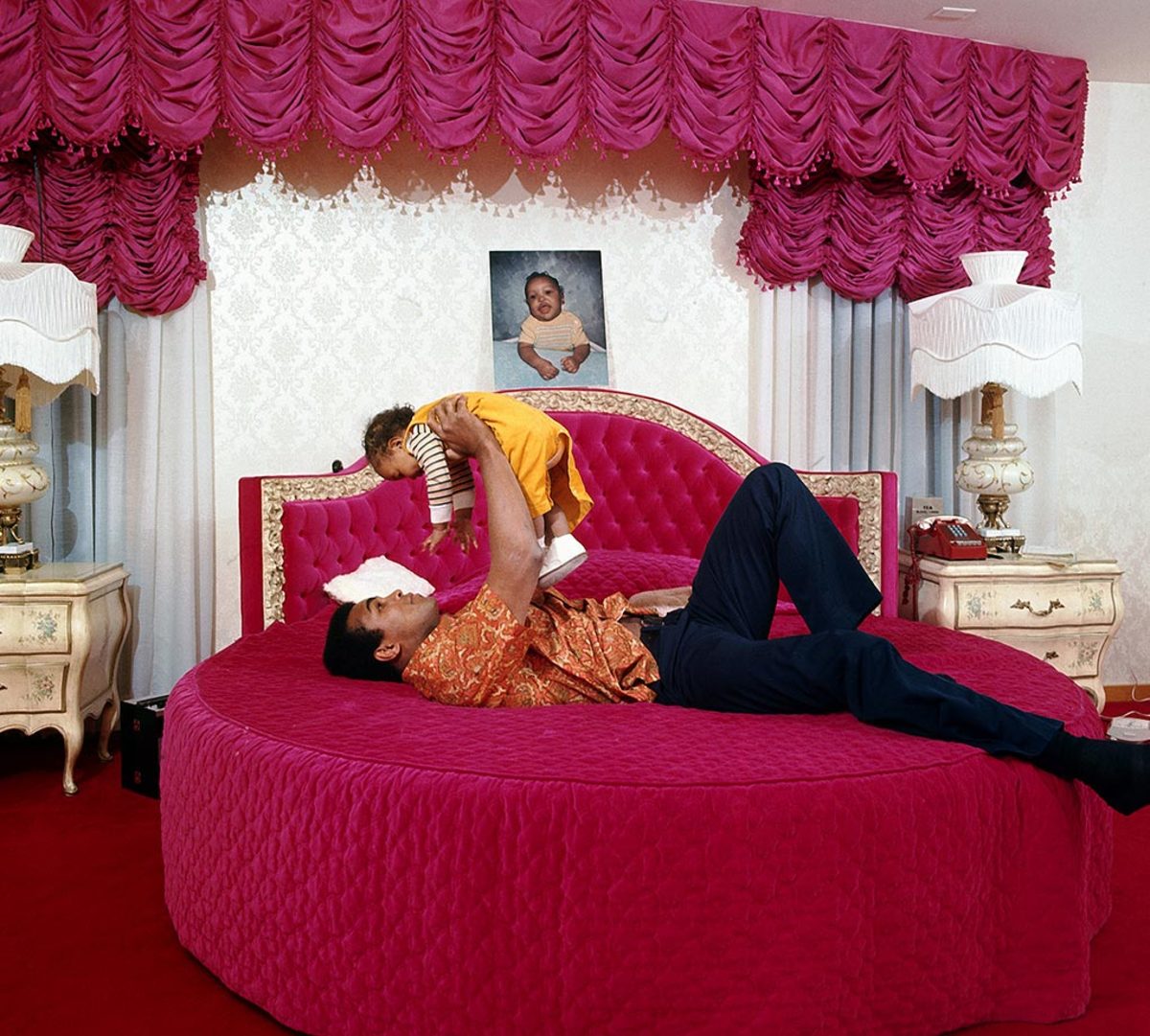
In the wake of his split decision loss to Norton, Ali plays with his son in his bedroom at home in Cherry Hill, N.J.
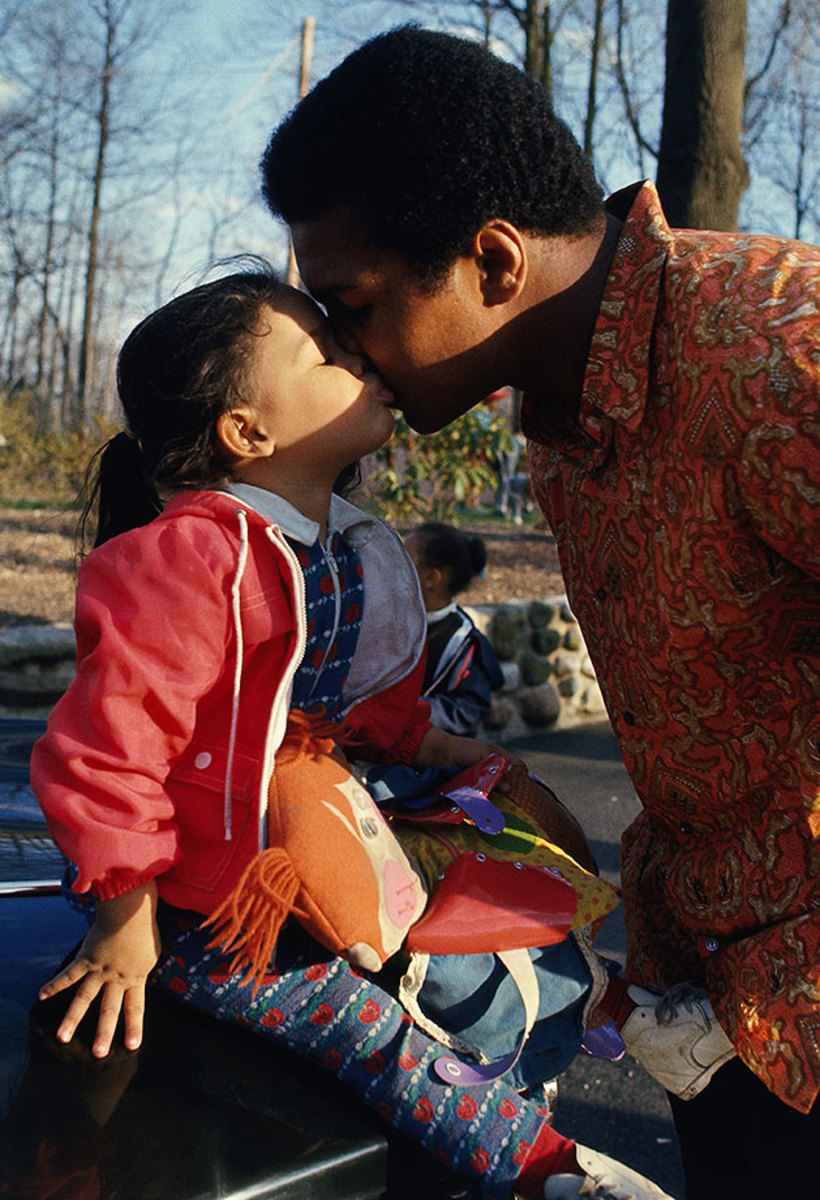
Ali kisses his daughter Jamillah outside of their home following the loss to Norton, just the second defeat of his career.
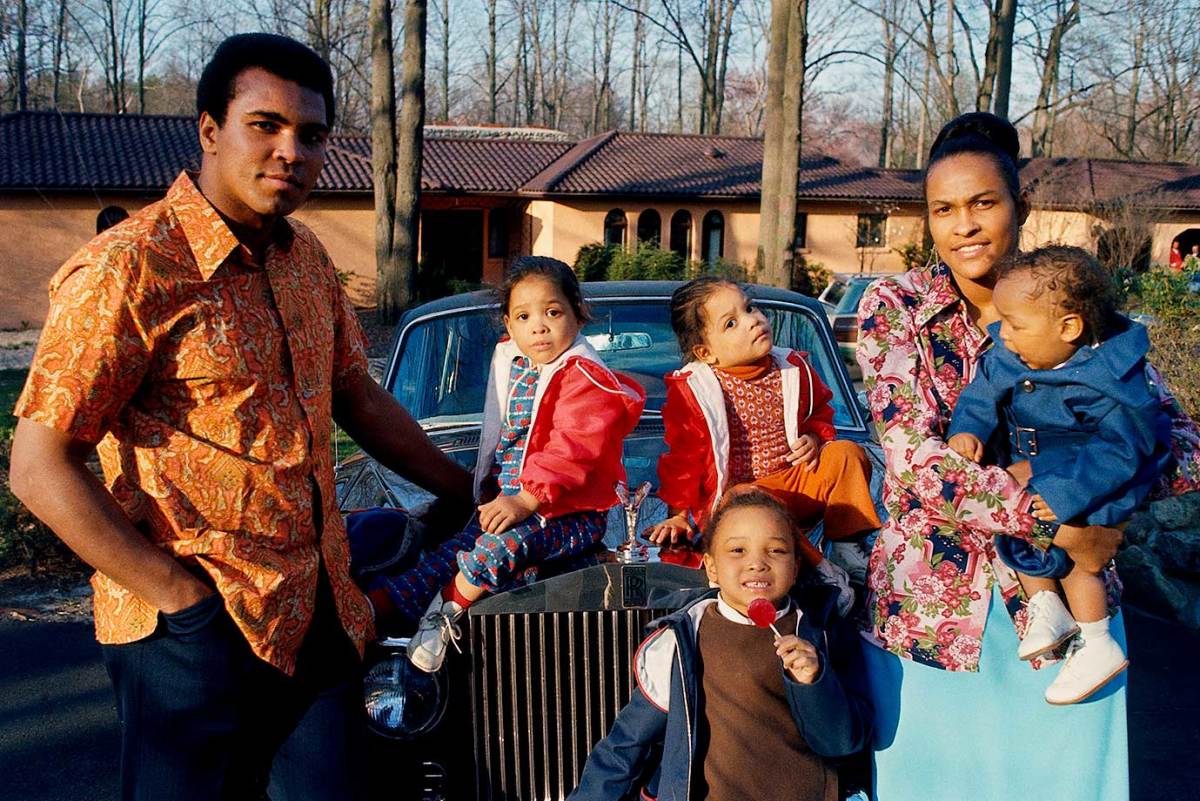
The Ali family standing outside their New Jersey home. To the right of Muhammad Ali are his twin daughters, Jamilllah and Rasheda, daughter Maryum and his wife, Khalilah, holding their son Ibn Muhammad Ali Jr.
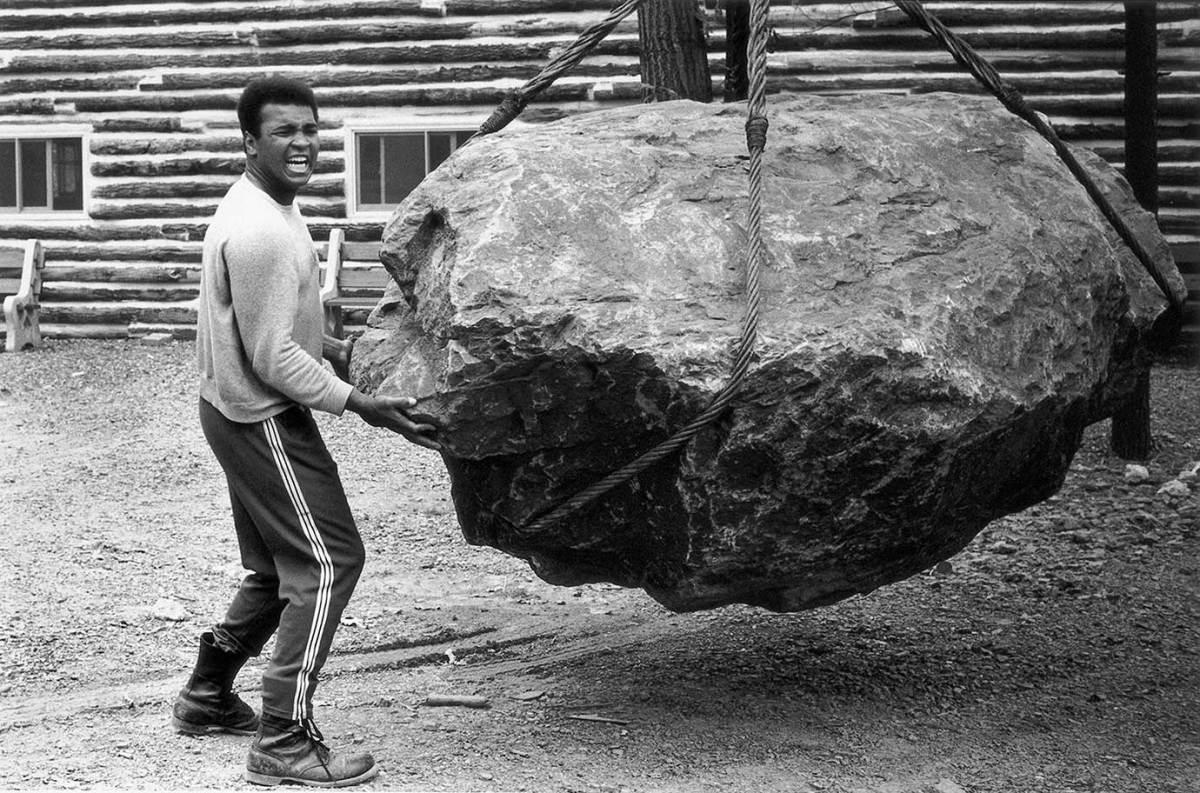
At his training camp cabin, Ali pushes a boulder during a photo shoot in Deer Lake, Penn., in August 1973. Ali was training for his rematch against Ken Norton, who broke his jaw five months earlier.
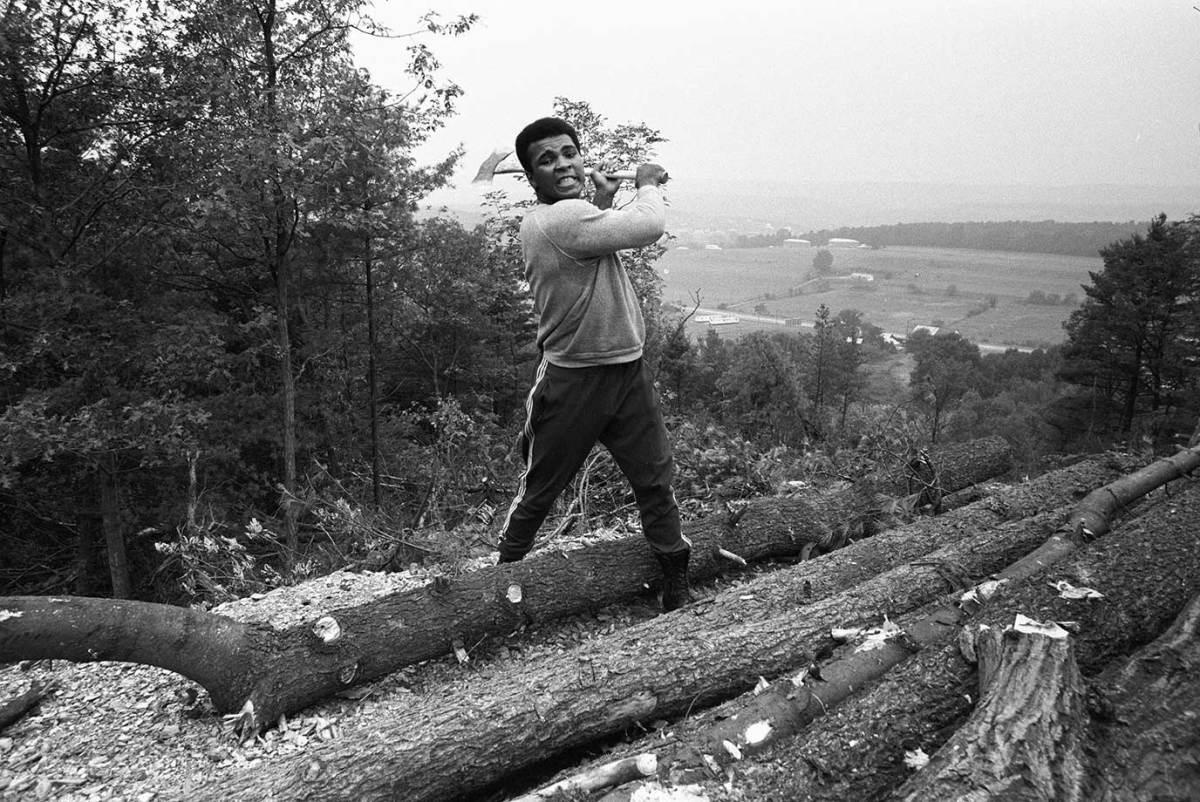
Ali chops wood at his cabin in Deer Lake. He referred to the training camp as "fighter's heaven" and used it to prepare for fights away from the spotlight.
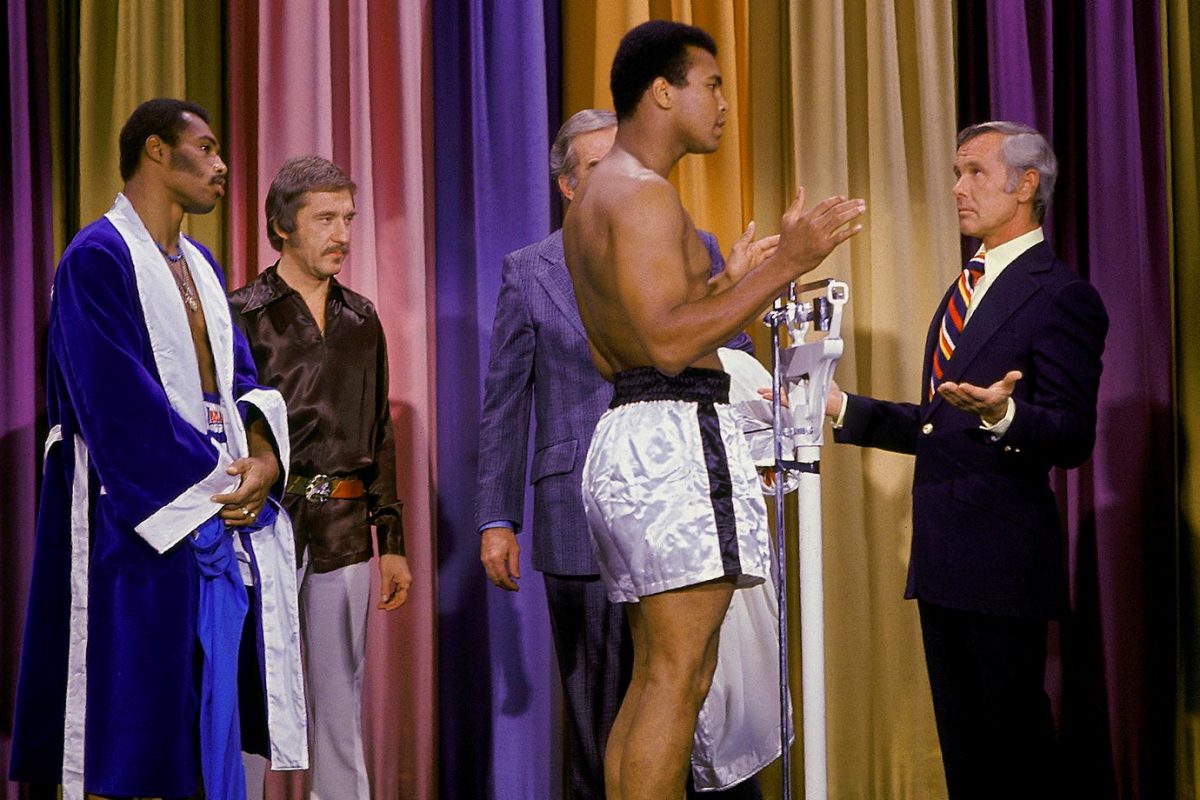
The fighters weigh in on the Tonight Show with Johnny Carson ahead of Ali and Ken Norton's September 1973 fight.
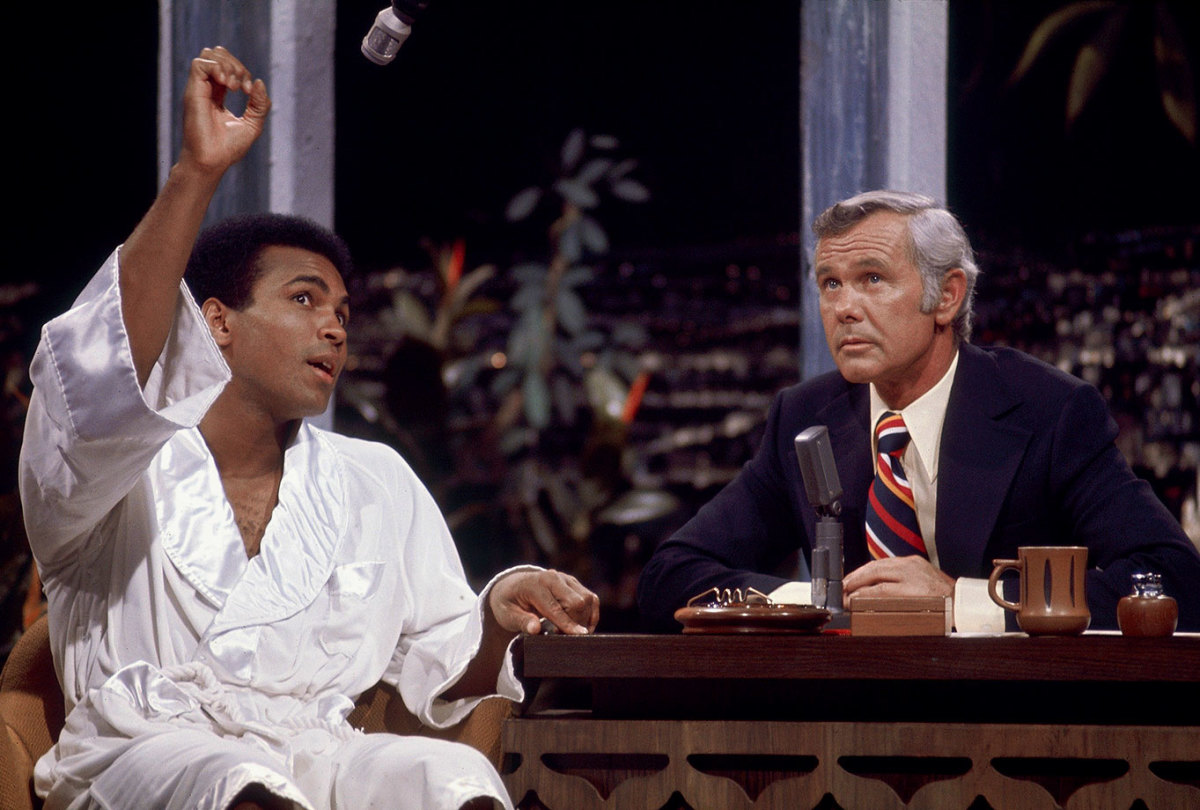
Johnny Carson listens to Ali on the Tonight Show three days before his rematch with Norton. Ali would avenge his earlier loss to Norton, winning a narrow split decision.
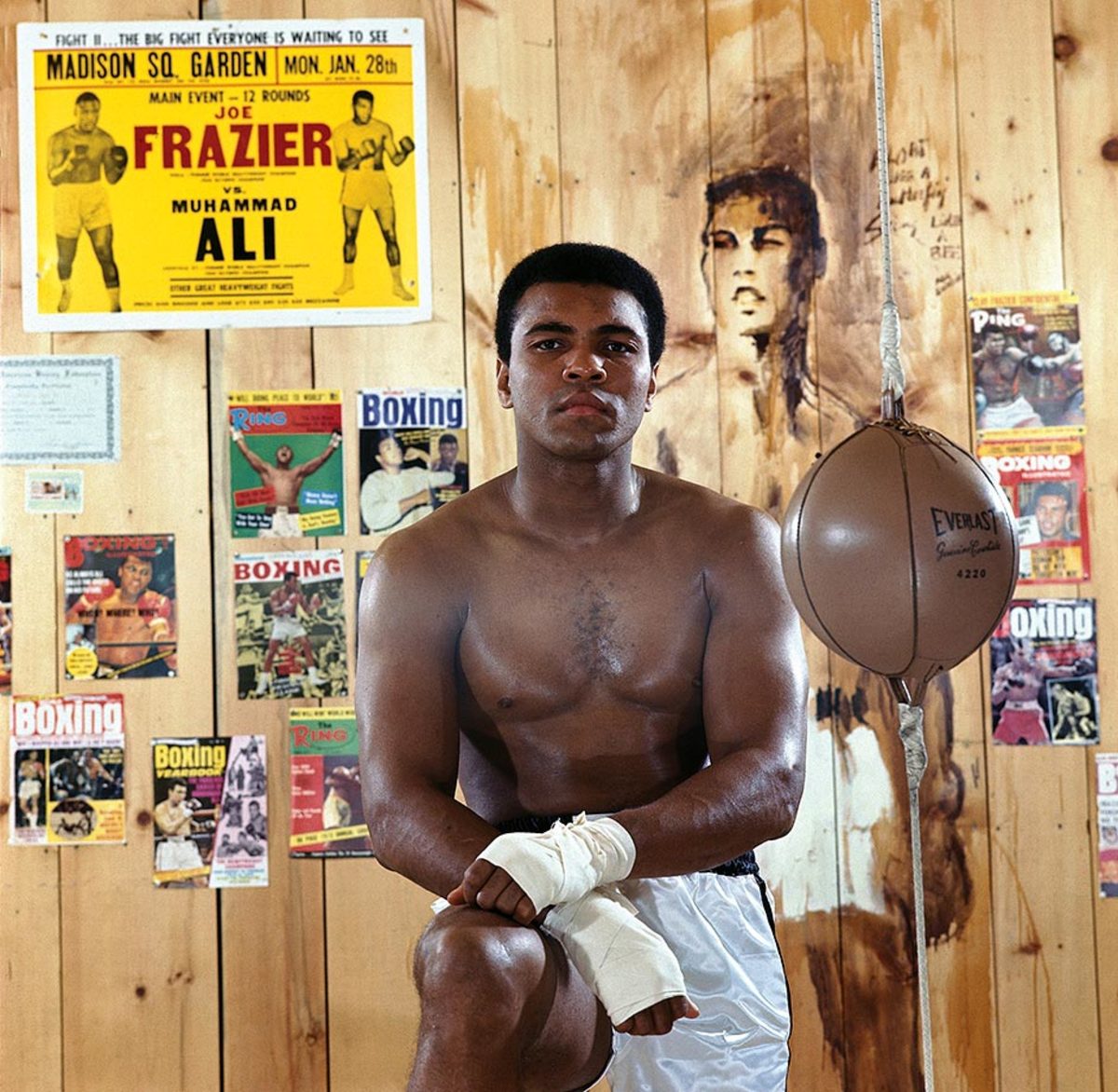
Ali poses in front of posters and magazine covers from throughout his career at his training camp cabin in Deer Lake in 1974.
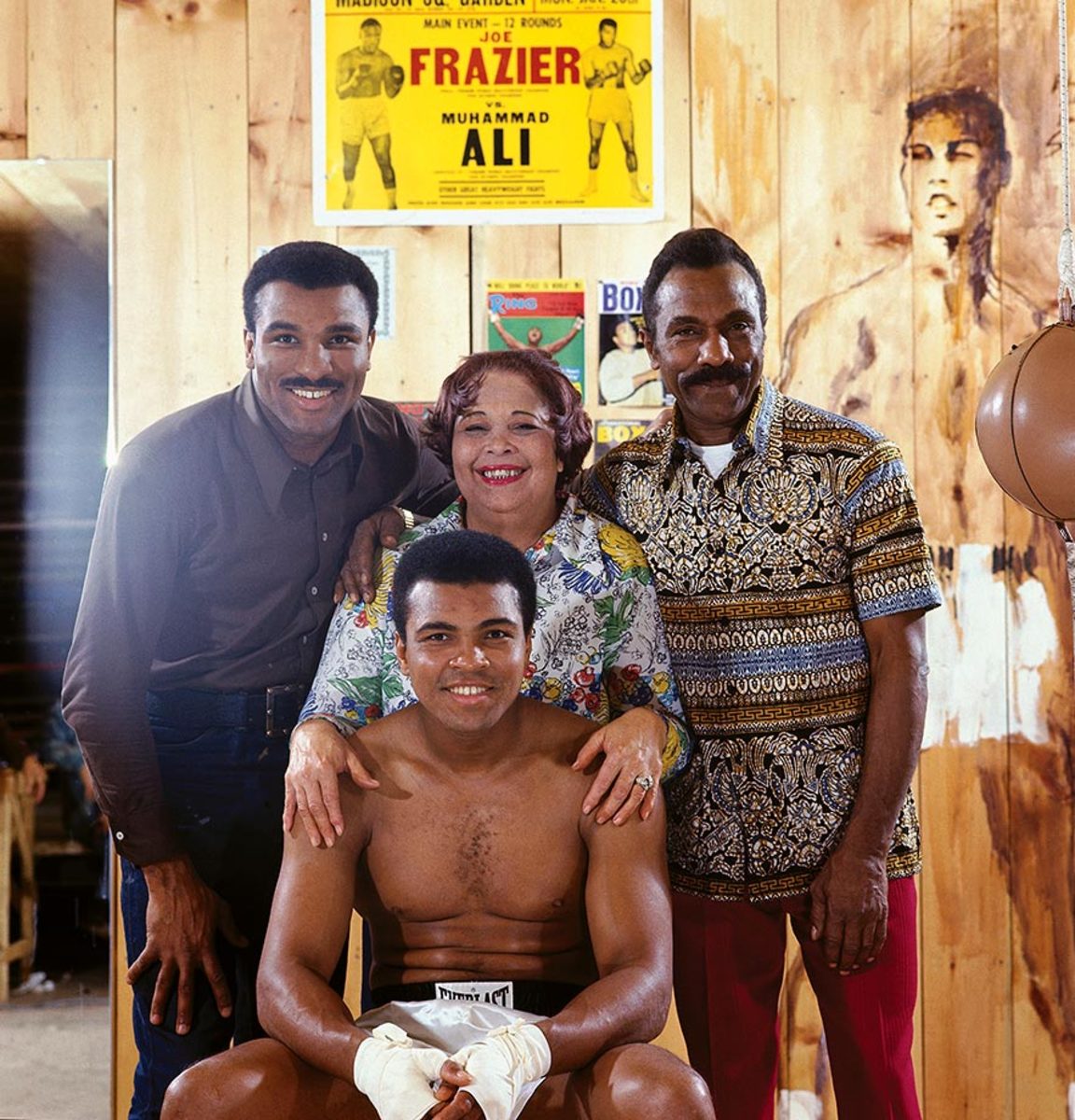
Ali poses with members of his family in front of a poster from his first fight with Joe Frazier. Ali's brother, Rahman Ali; mother, Odessa Clay; and father, Cassius Clay Sr. stand behind the boxer.
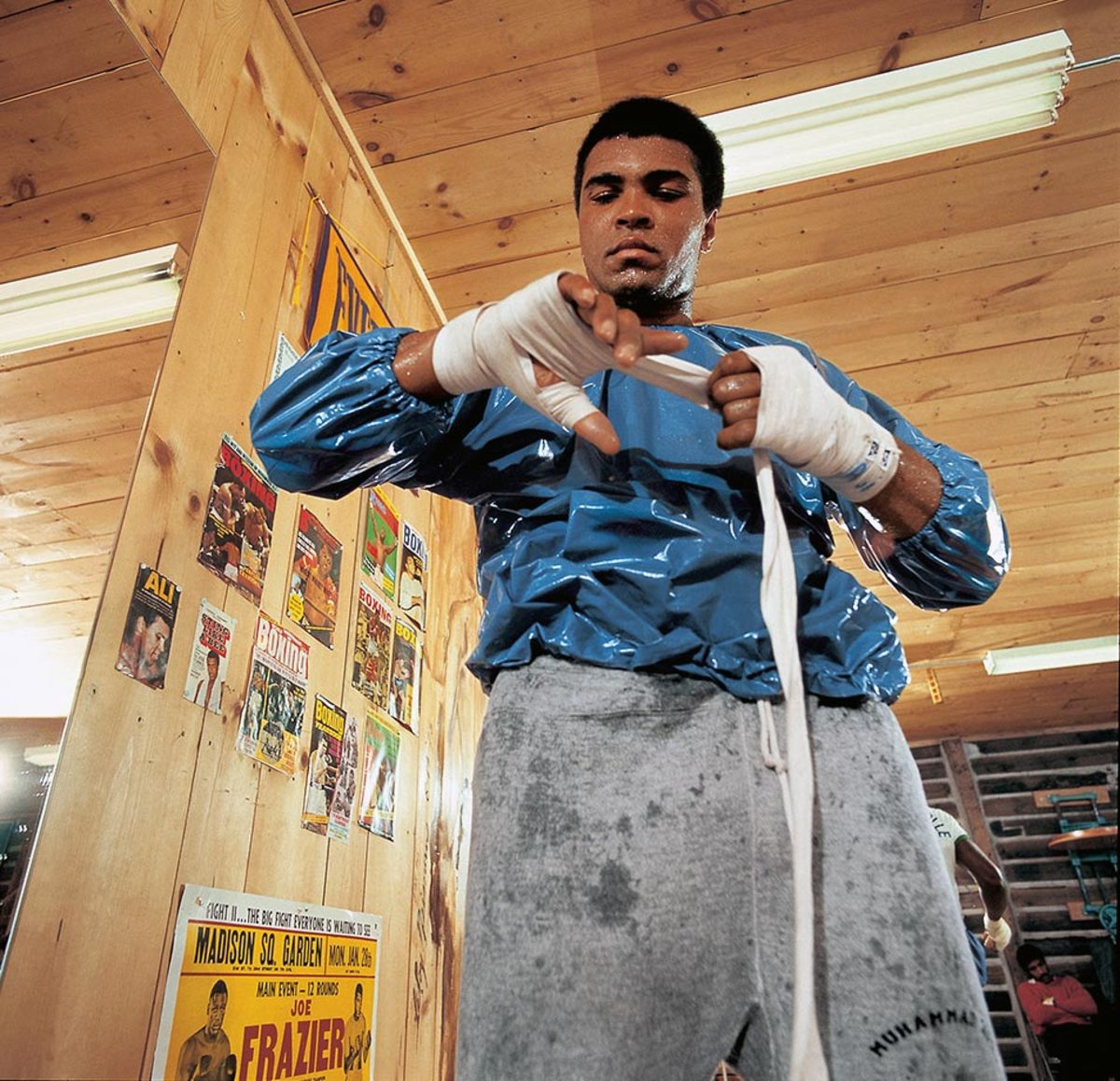
Less than three weeks before his rematch with Joe Frazier on Jan. 28, 1974, Ali wraps his hands while wearing a sauna suit at his training camp cabin.
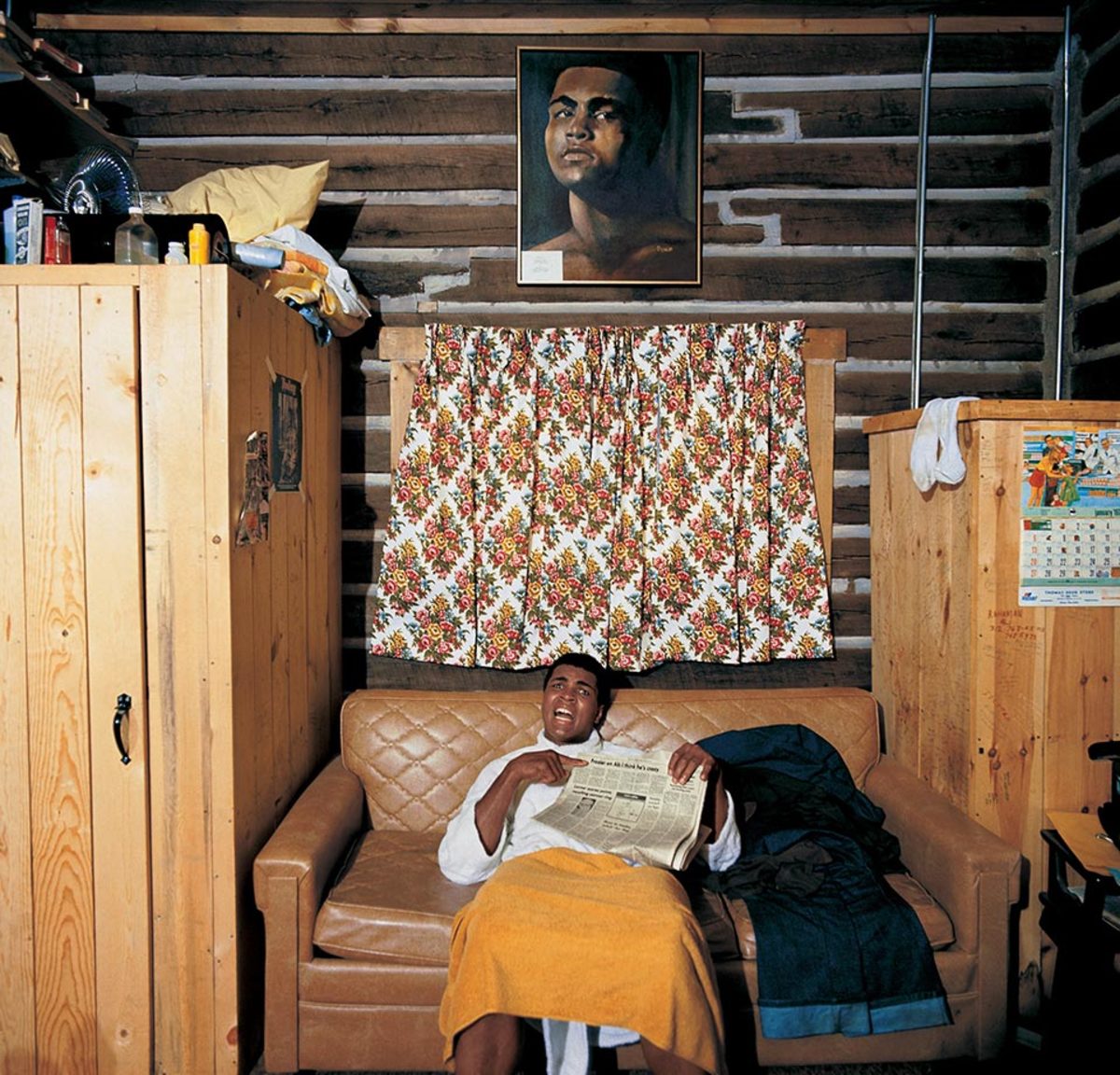
Ali holds a newspaper at his cabin in January 1974. He is pointing to a headline that reads, "Frazier On Ali, I Think He's Crazy." Ali and Frazier fought for the second time later that month with Ali winning by a unanimous decision.
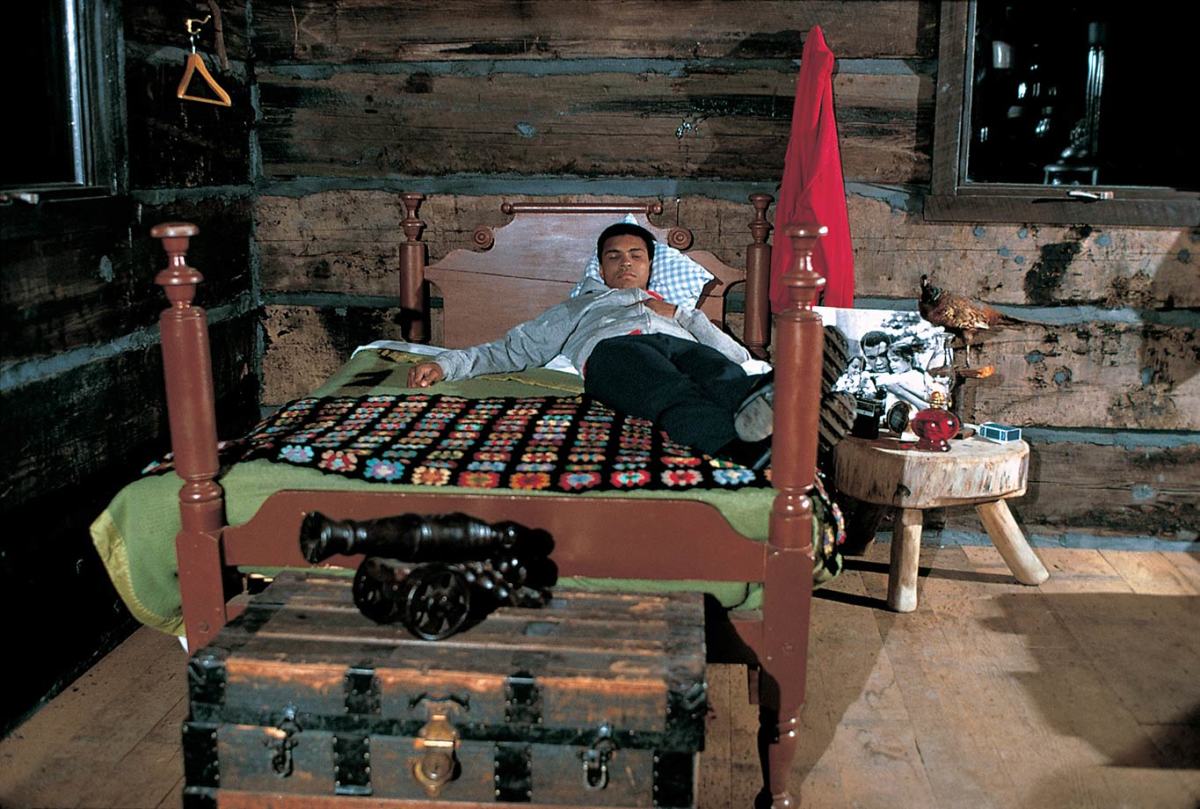
Ali lies on his bed at his cabin during the January 1974 photo shoot.
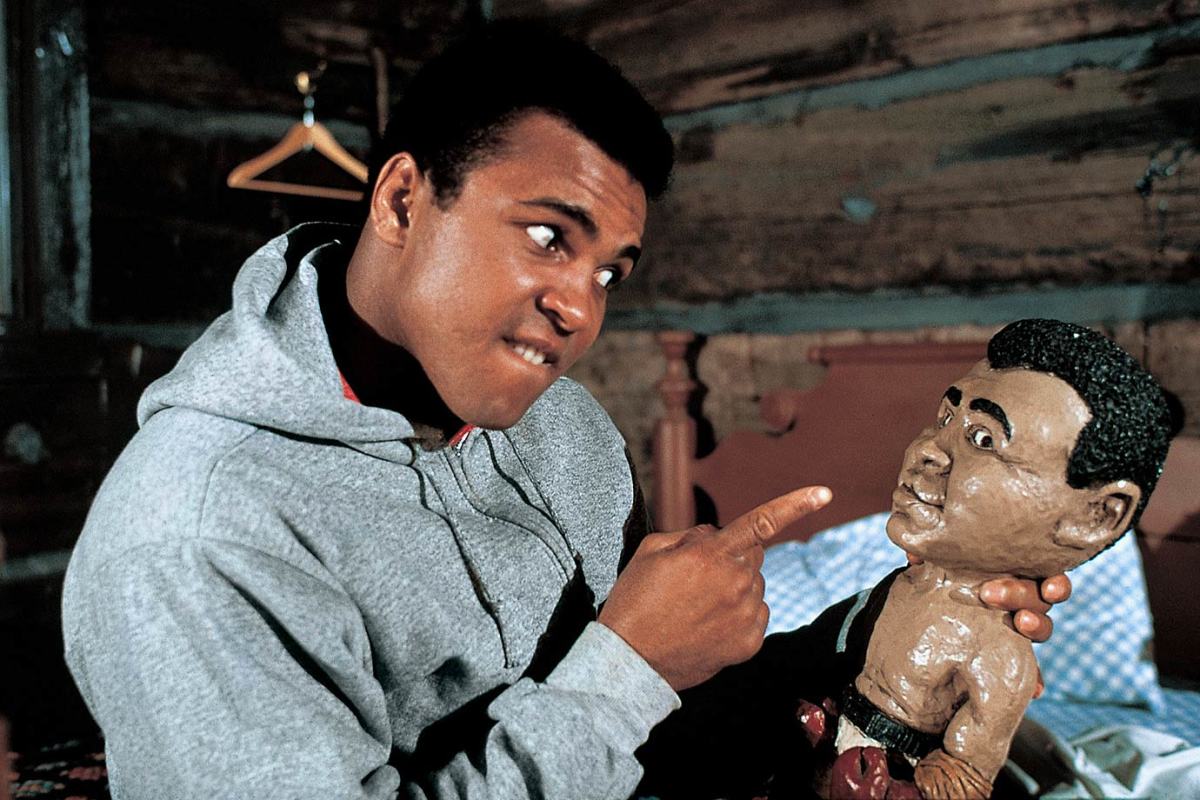
His smaller incarnation stares straight back as Ali plays with a doll of himself during the same 1974 shoot at his training camp cabin.
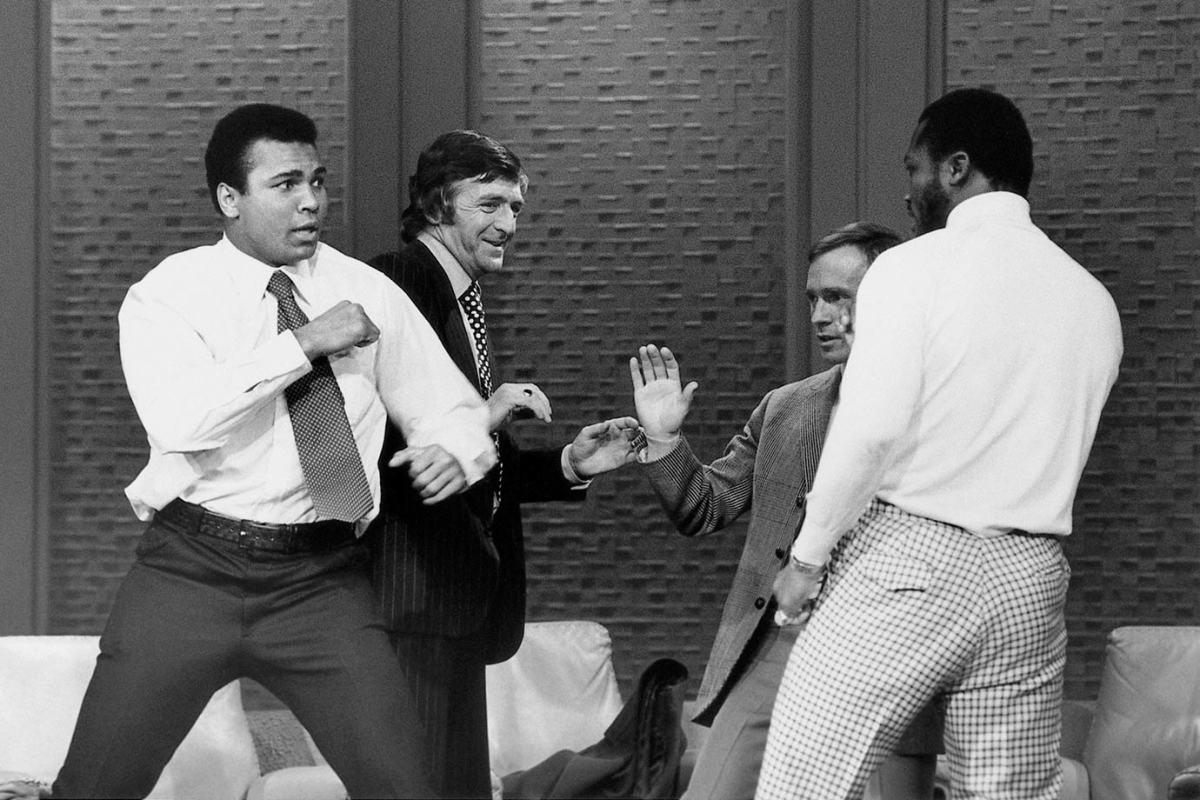
Ali and Joe Frazier fight on the set of The Dick Cavett Show while reviewing their 1971 bout in advance of their 1974 rematch. Ali called Frazier ignorant, to which Frazier took exception. As the studio crew tried to calm Frazier down, Ali held Frazier by the neck, forcing him to sit down and sparking a fight. The television set fight amped up anticipation of their January 1974 bout.
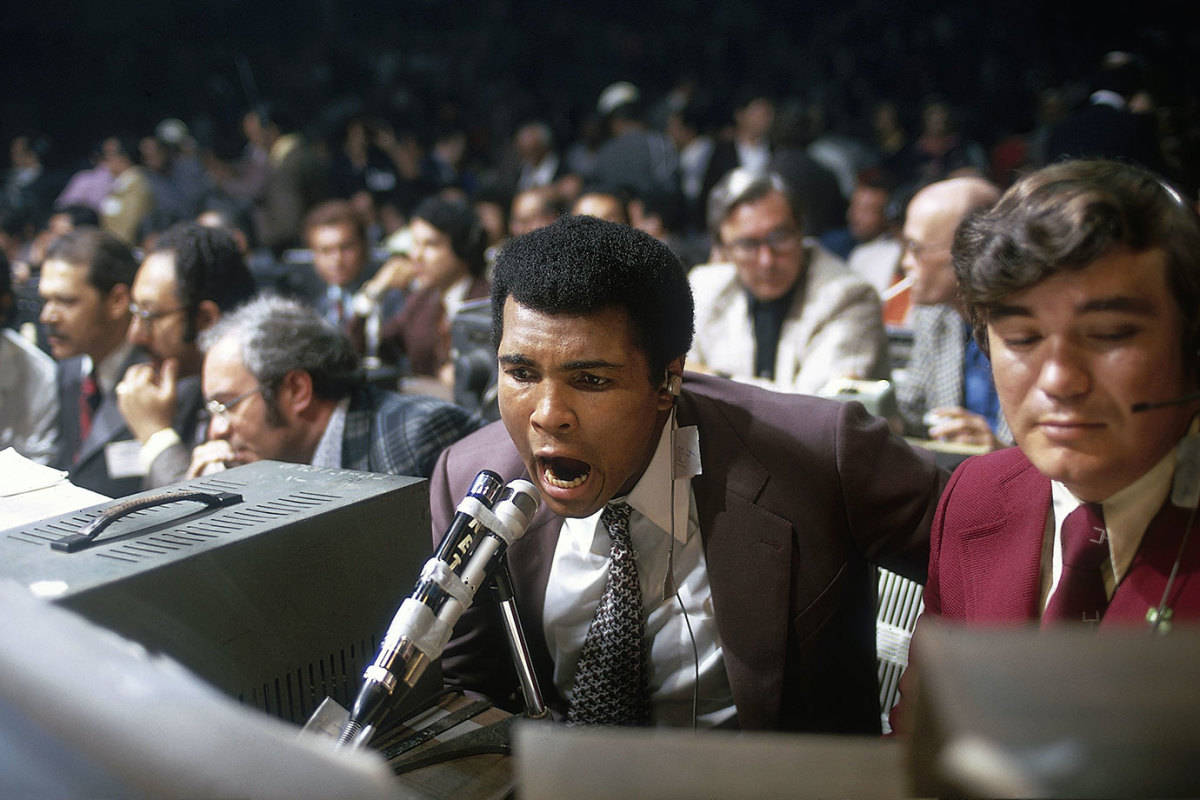
Exploring a different side of the sport, Ali broadcasts the fight between George Foreman and Ken Norton in March 1974. Foreman won the fight by technical knockout in the second round, setting up the showdown with Ali in Zaire.
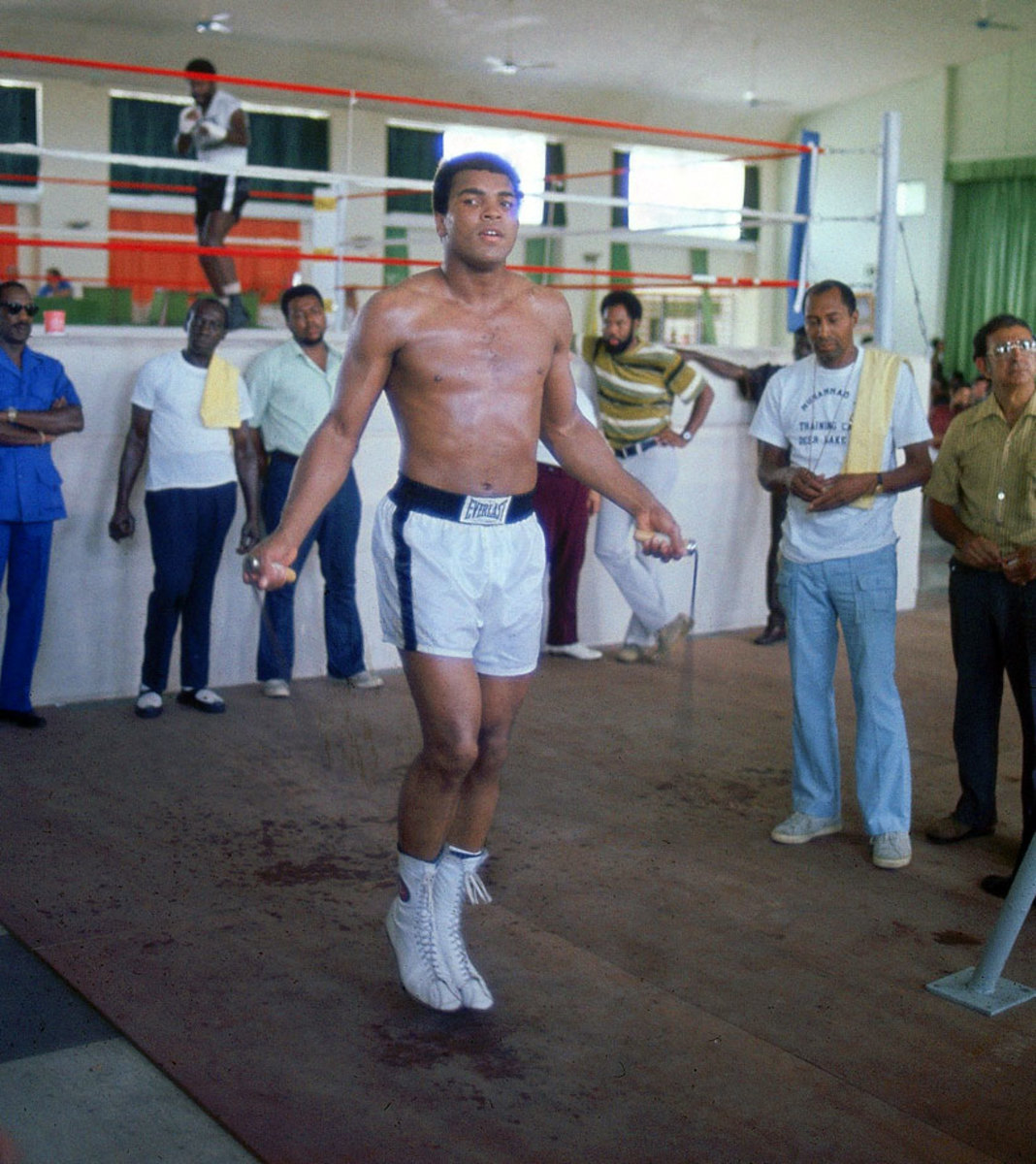
Ali jumps rope at the Salle de Congres in Kinshasa, Zaire, while training for his heavyweight title fight against George Foreman. Both Ali and Foreman spent most of the summer of 1974 training in Zaire to adjust to the climate.
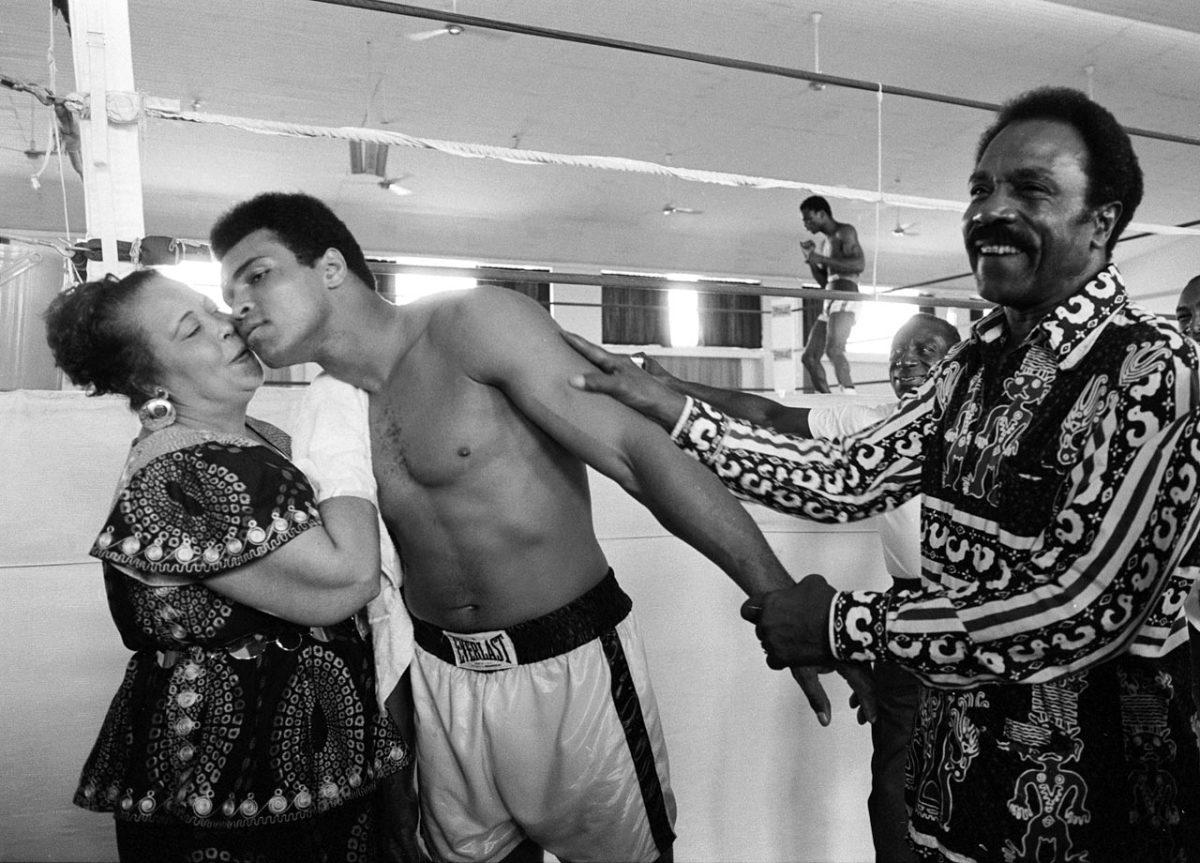
While training before his fight with George Foreman, Ali kisses his mother, Odessa Clay, while his father, Cassius Clay Sr., looks on. Ali's superior strategy and ability to take a punch led him to his upset victory as he absorbed body blows from Foreman before he responded with powerful combinations to Foreman's head.
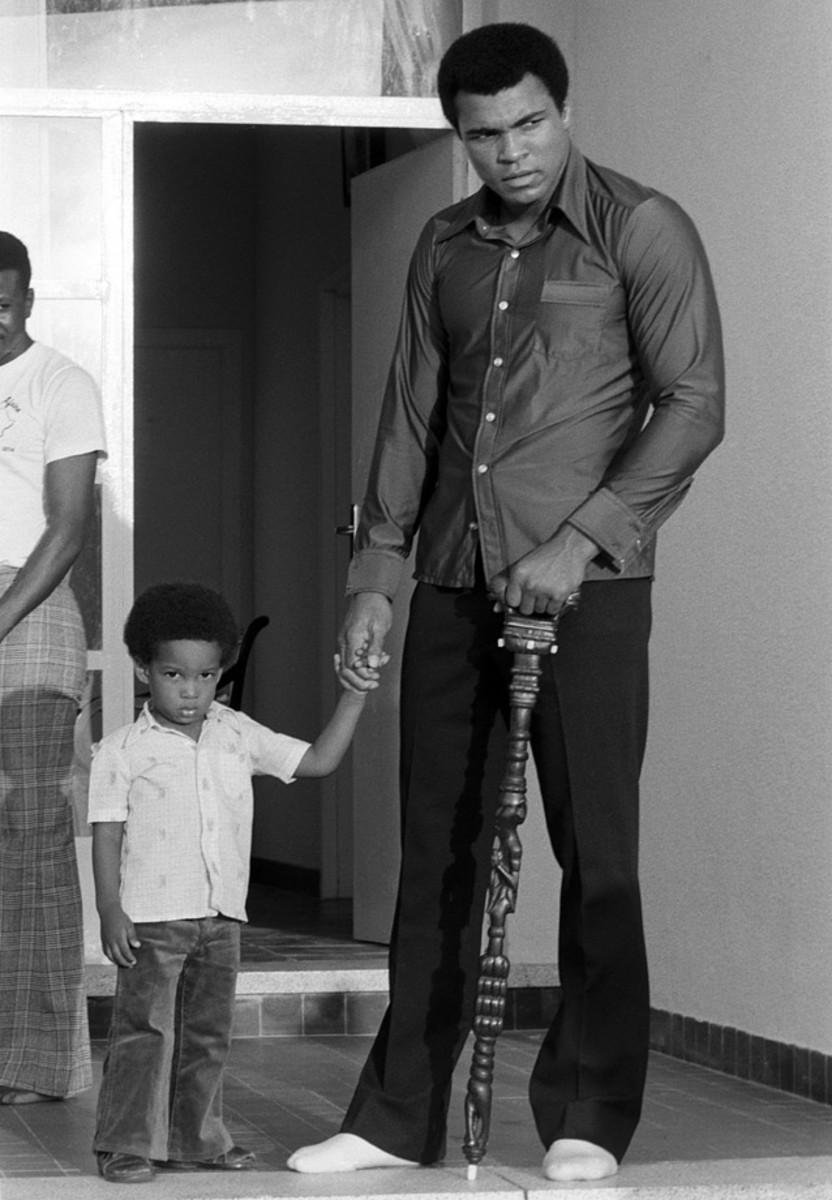
Four days before the fight, Ali holds the hand of his son Ibn in Zaire. Ali successfully courted the favor of the Zaire crowd, prompting chants of "Ali bomaye!" — translated as "Ali, kill him!"
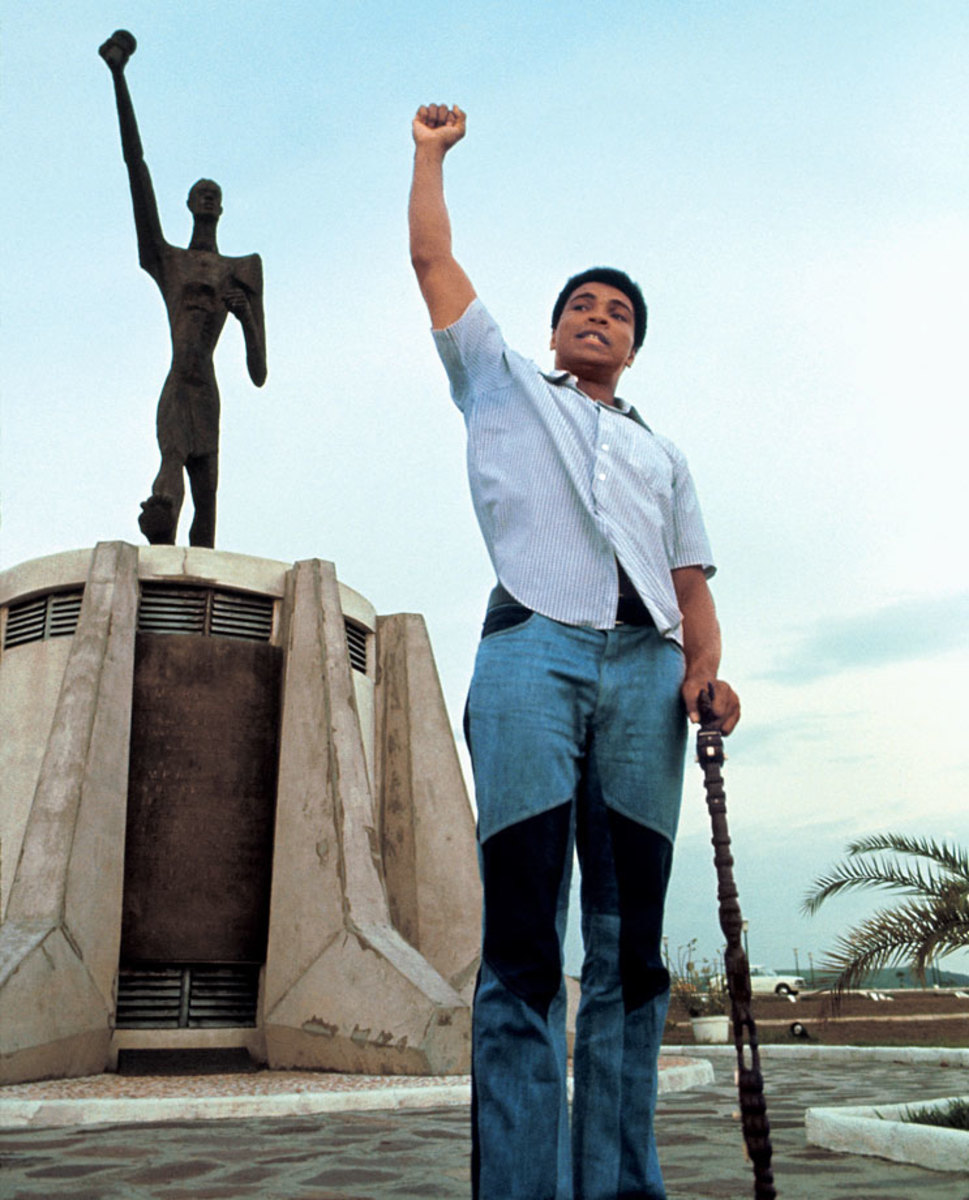
Ali poses in front of the Le Militant statue at the presidential complex that was the site of Ali's January heavyweight title bout with Foreman. The fight was originally set for a month earlier, but Foreman suffered a cut near his eye during training, forcing a delay.
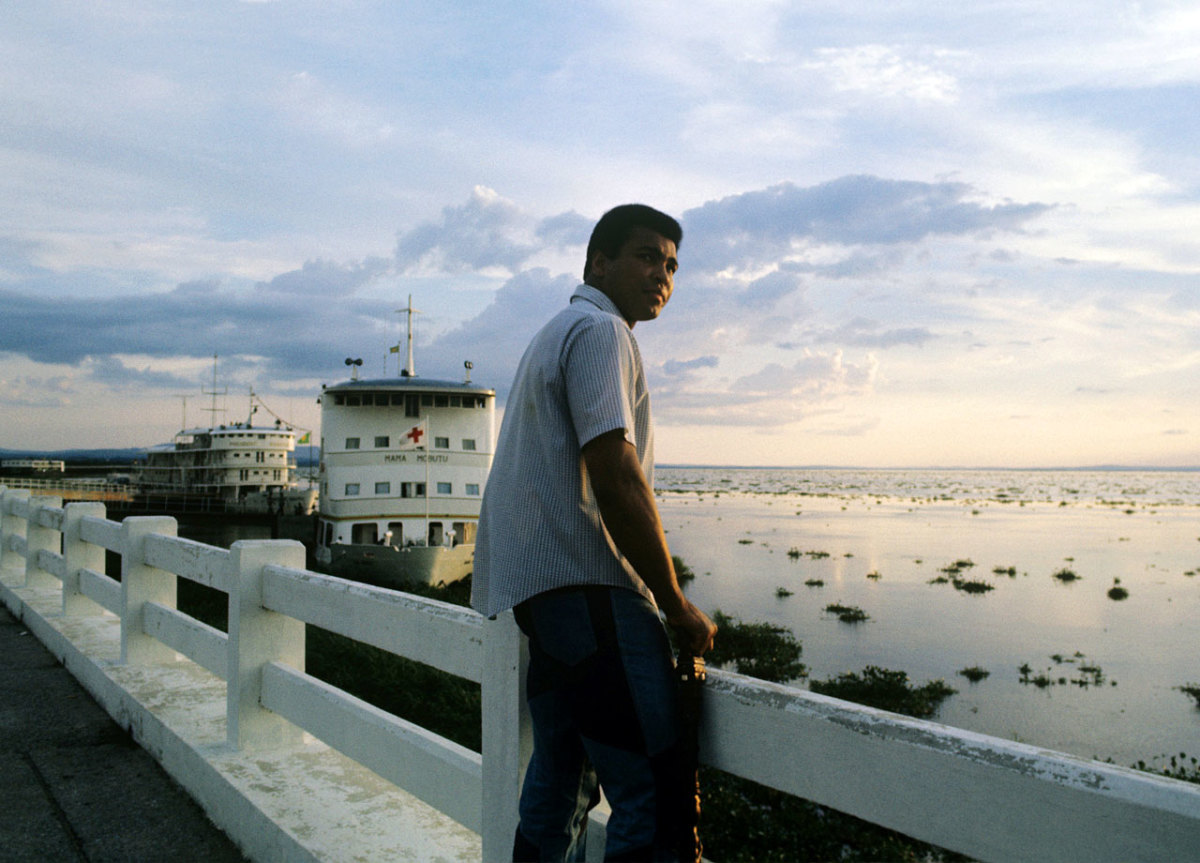
Ali stands against the railing on the River Zaire watching the sunset four days before the Rumble in the Jungle. The fight was sponsored by Zaire to achieve the $5 million purse promoter Don King had promised both Ali and Foreman.
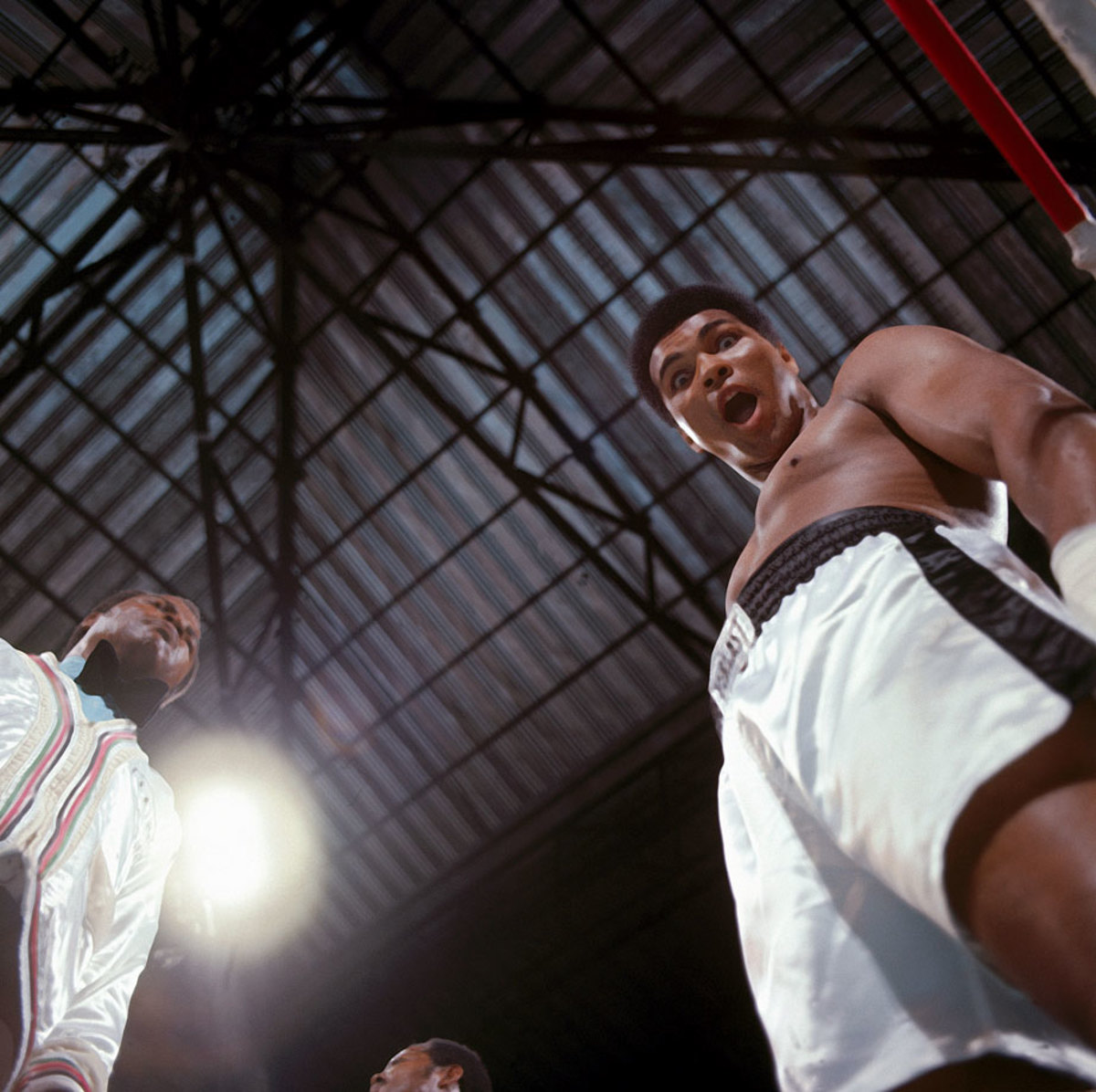
Before employing his famous rope-a-dope strategy against Foreman, Ali makes a face at the camera. Ali allowed Foreman to throw many punches but only into his arms and body, and when Foreman tired himself out from the mostly ineffective punches, Ali took control of the fight.
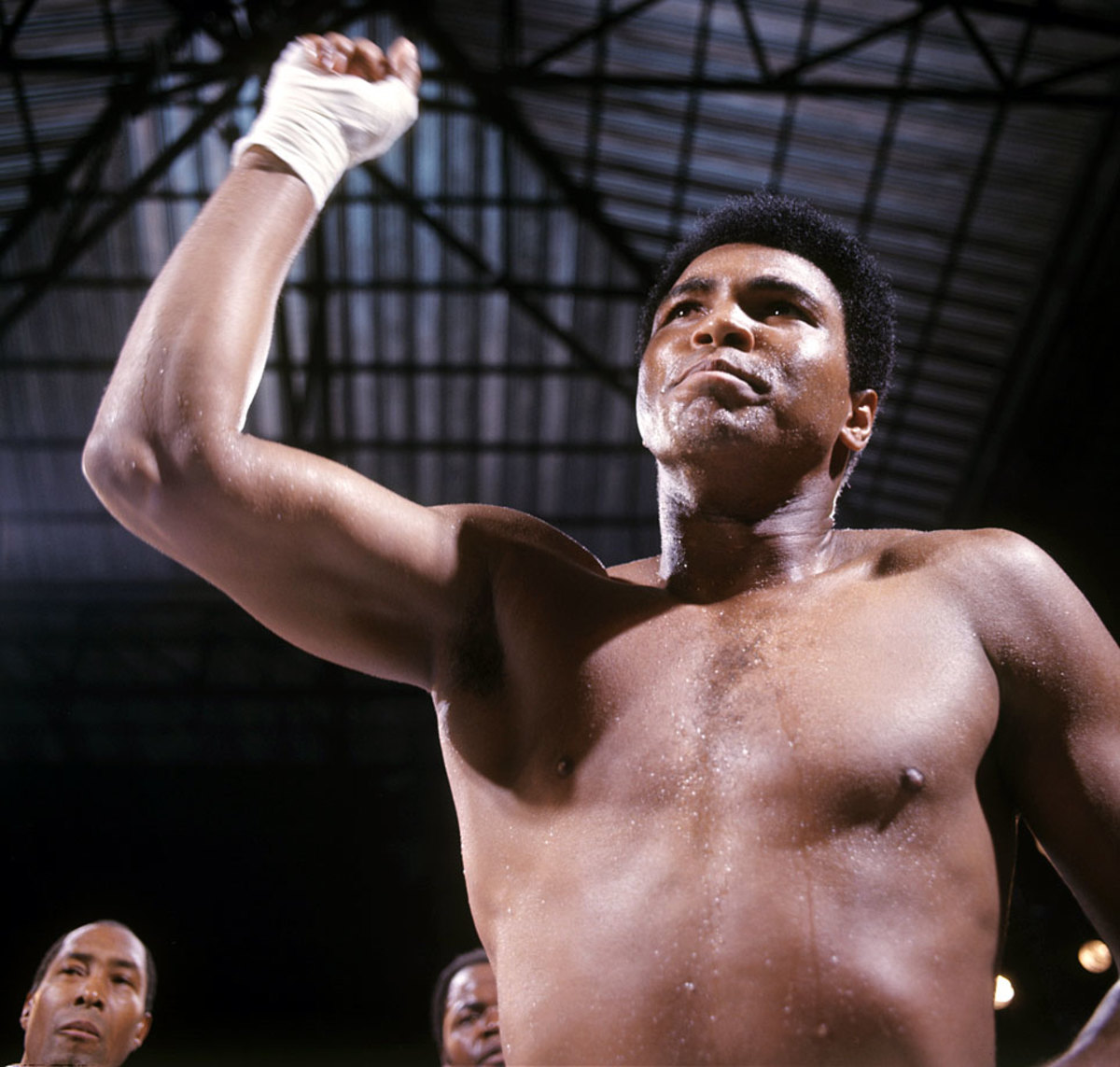
Ali points before his bout with Foreman. The victory over his favored opponent made him the heavyweight champion of the world for the first time since he was stripped of his titles in 1967.
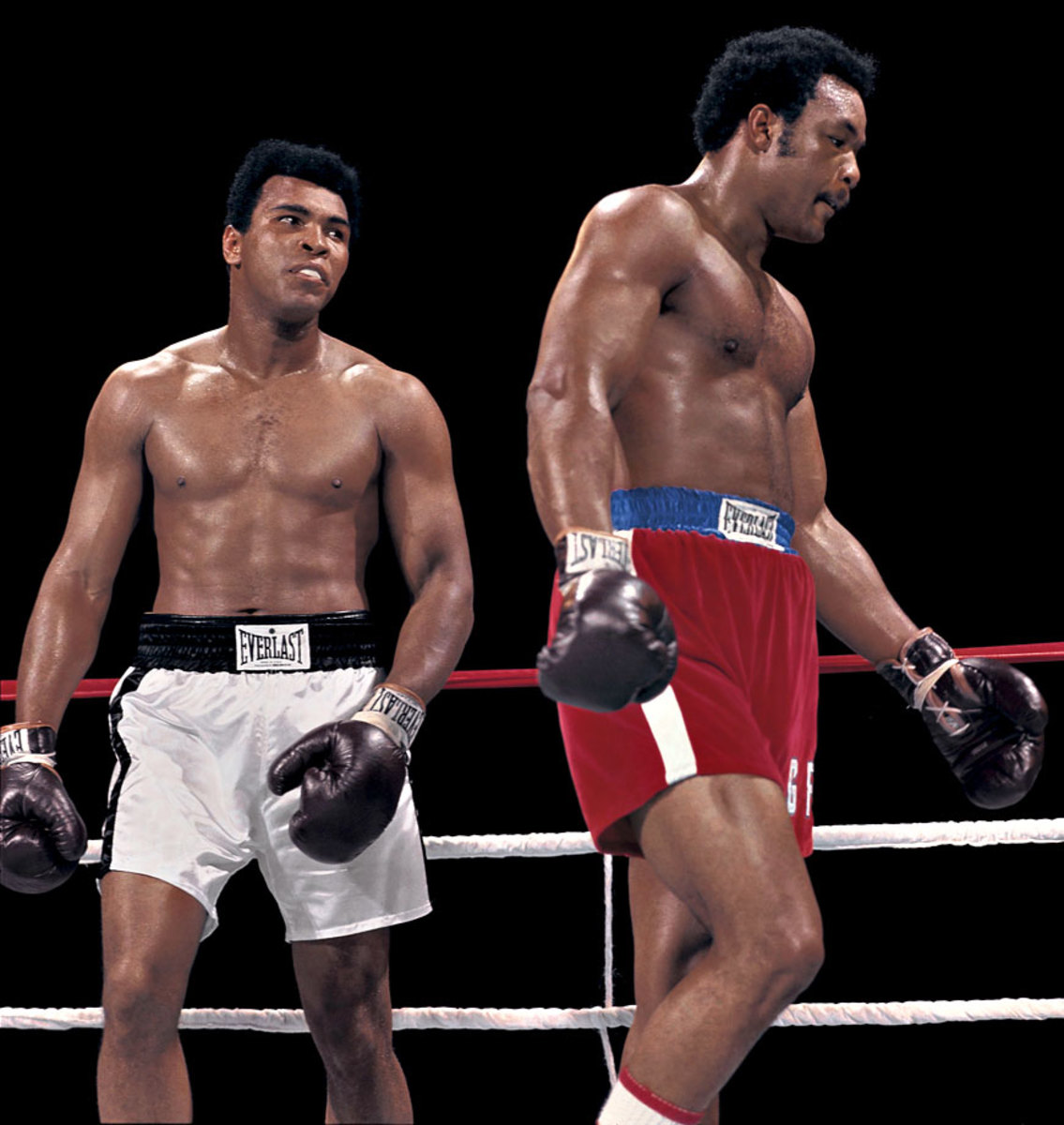
Ali stares at George Foreman during the Rumble in the Jungle. Ali earned his shot at the heavyweight title by defeating Joe Frazier in January 1974, avenging a loss three years earlier.
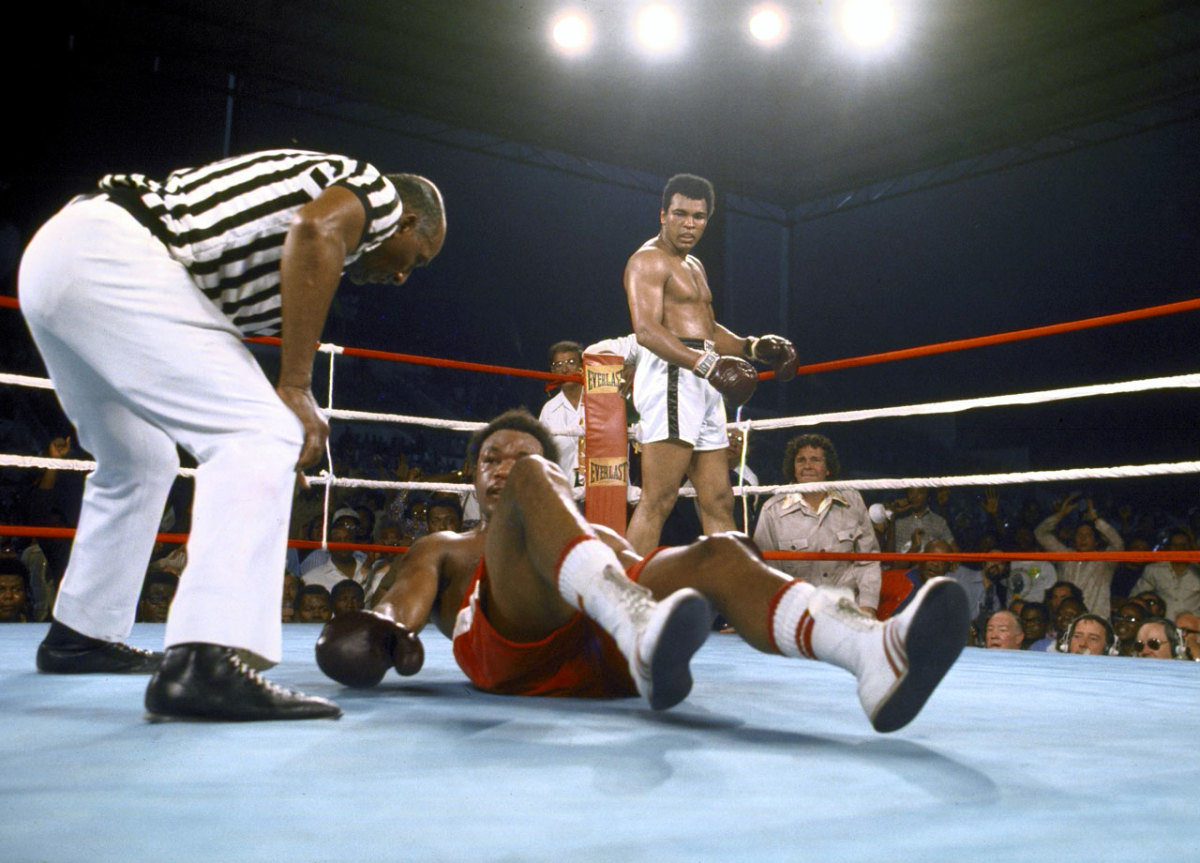
Foreman lies down on the canvas as Ali stands in the background during the Rumble in the Jungle. Ali knocked Foreman down with a five-punch combination in the eighth round, and referee Zack Clayton counted him out.
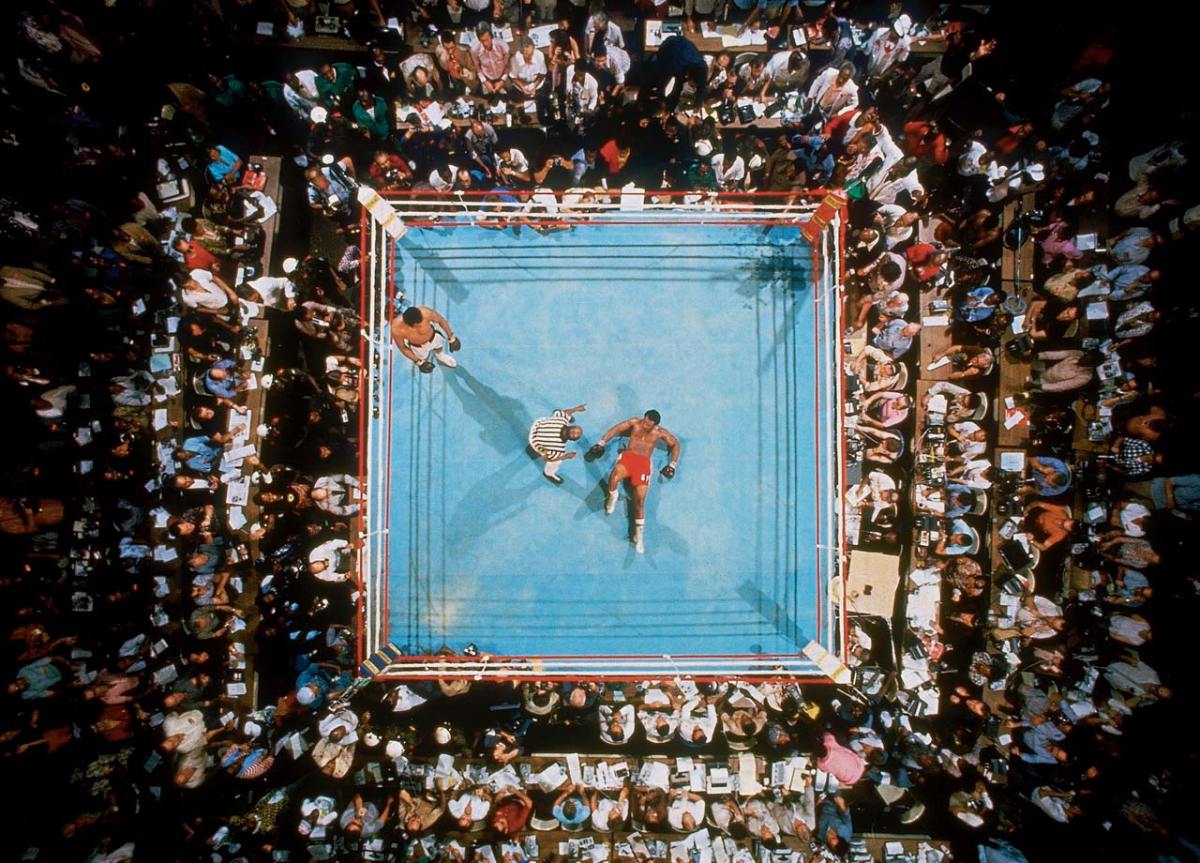
Big George stares at the ceiling as referee Zack Clayton counts him out in the eighth round. The victory made Ali, once again, the heavyweight champion of the world.
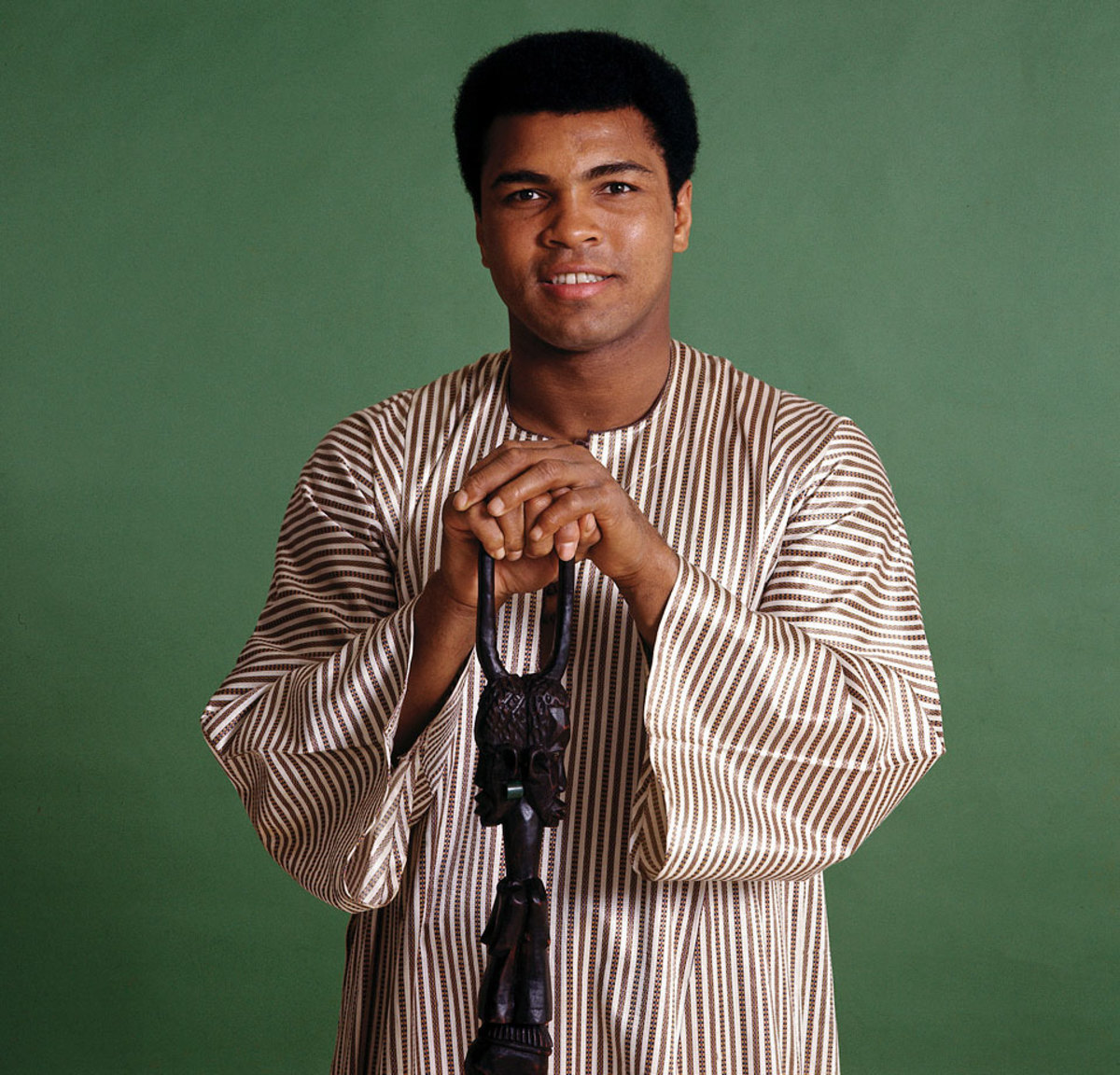
Ali poses for a portrait after being selected as the Sports Illustrated Sportsman of the Year in 1974. Ali wore a dashiki, a men's garment widely worn in West Africa. He also brought the walking stick given to him by Zaire's president.
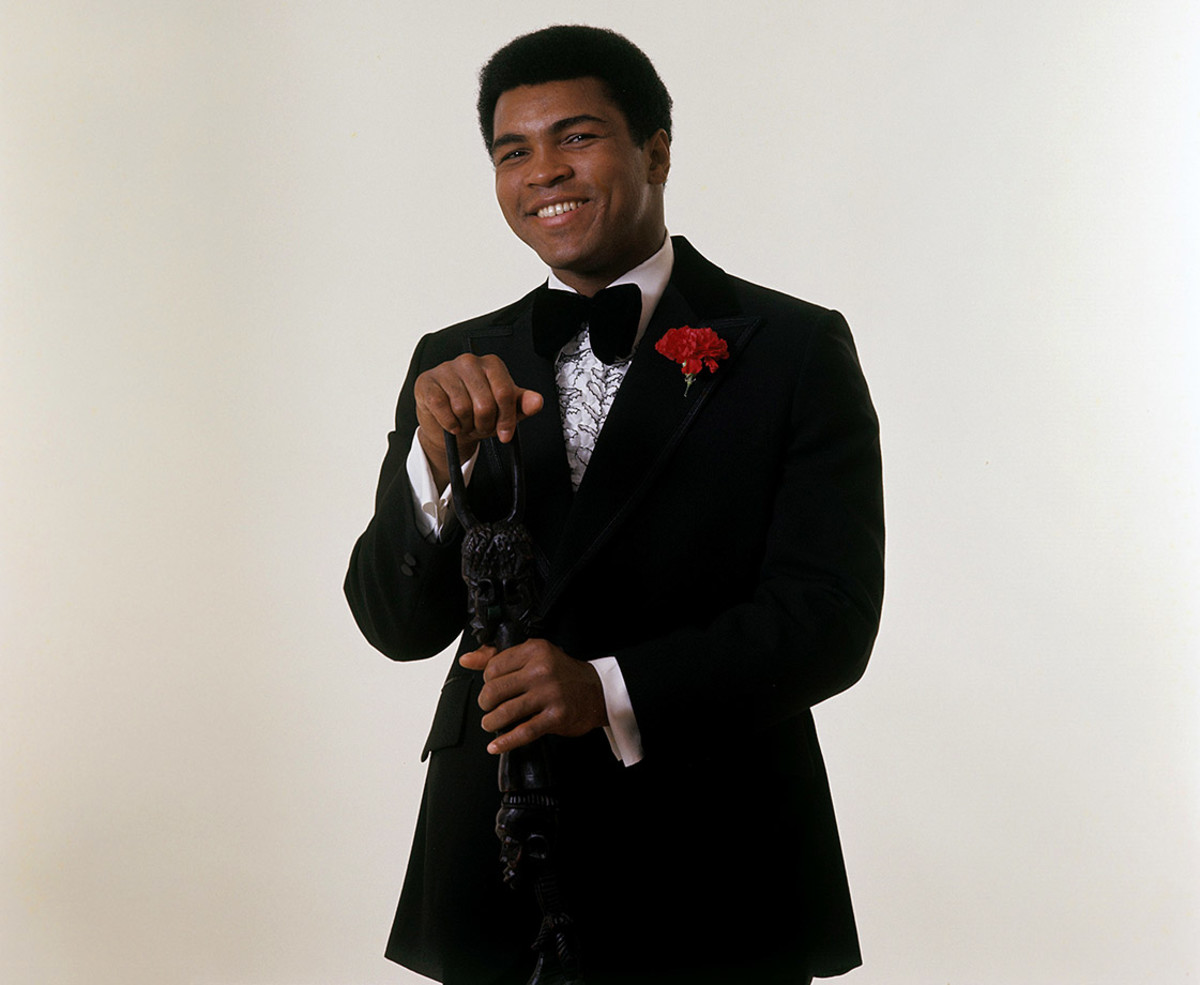
This time Ali wears a tuxedo, but keeps the walking stick, during the November photo shoot for Sports Illustrated's Sportsman of the Year.
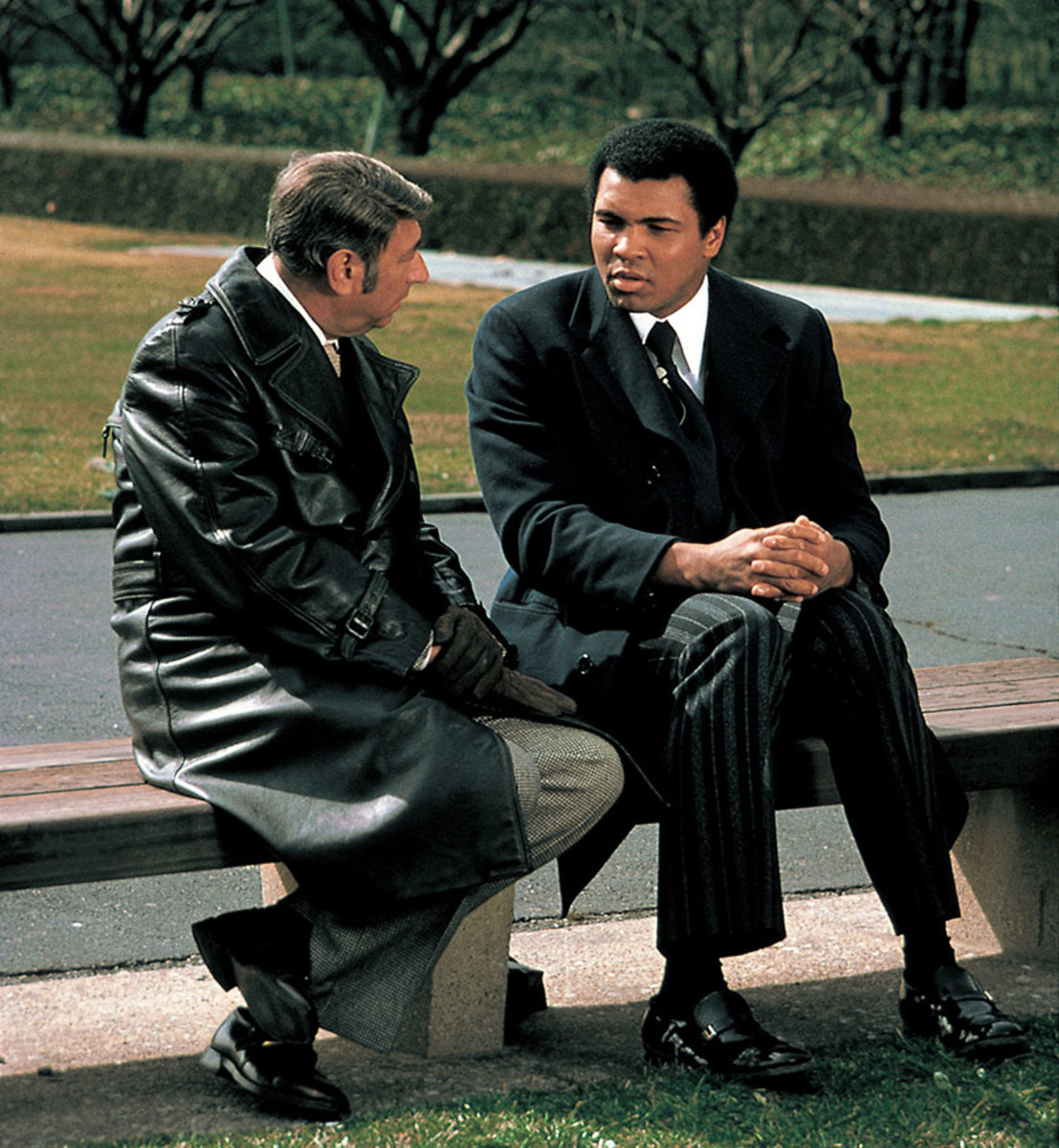
Ali talks with Howard Cosell outside of the United Nations Headquarters for a segment on the Wide World of Sports. Later that day, Ali held a press conference to announce that he would donate part of the proceeds from his fight against Chuck Wepner to help Africans in the Sahel drought.
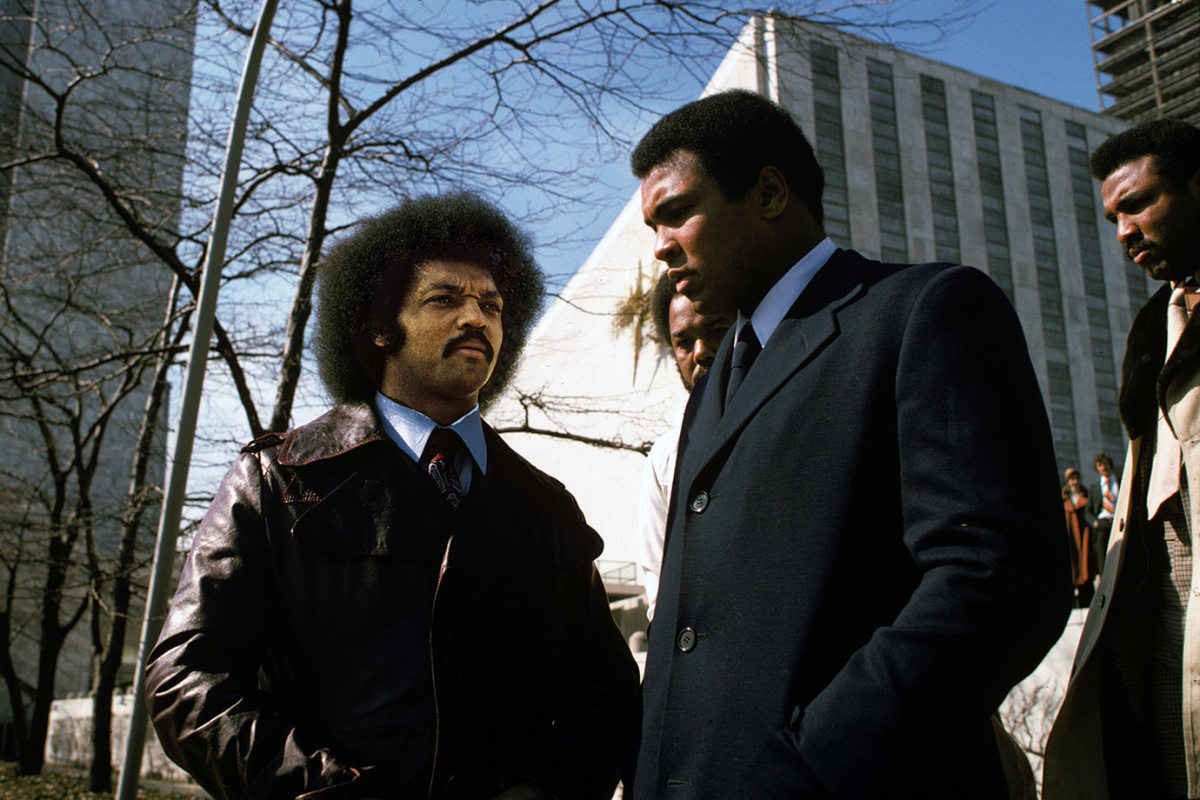
Ali talks with Reverend Jesse Jackson outside of the United Nations Headquarters before a press conference to announce that he would donate part of the proceeds from his fight against Chuck Wepner to help Africans in the Sahel drought.
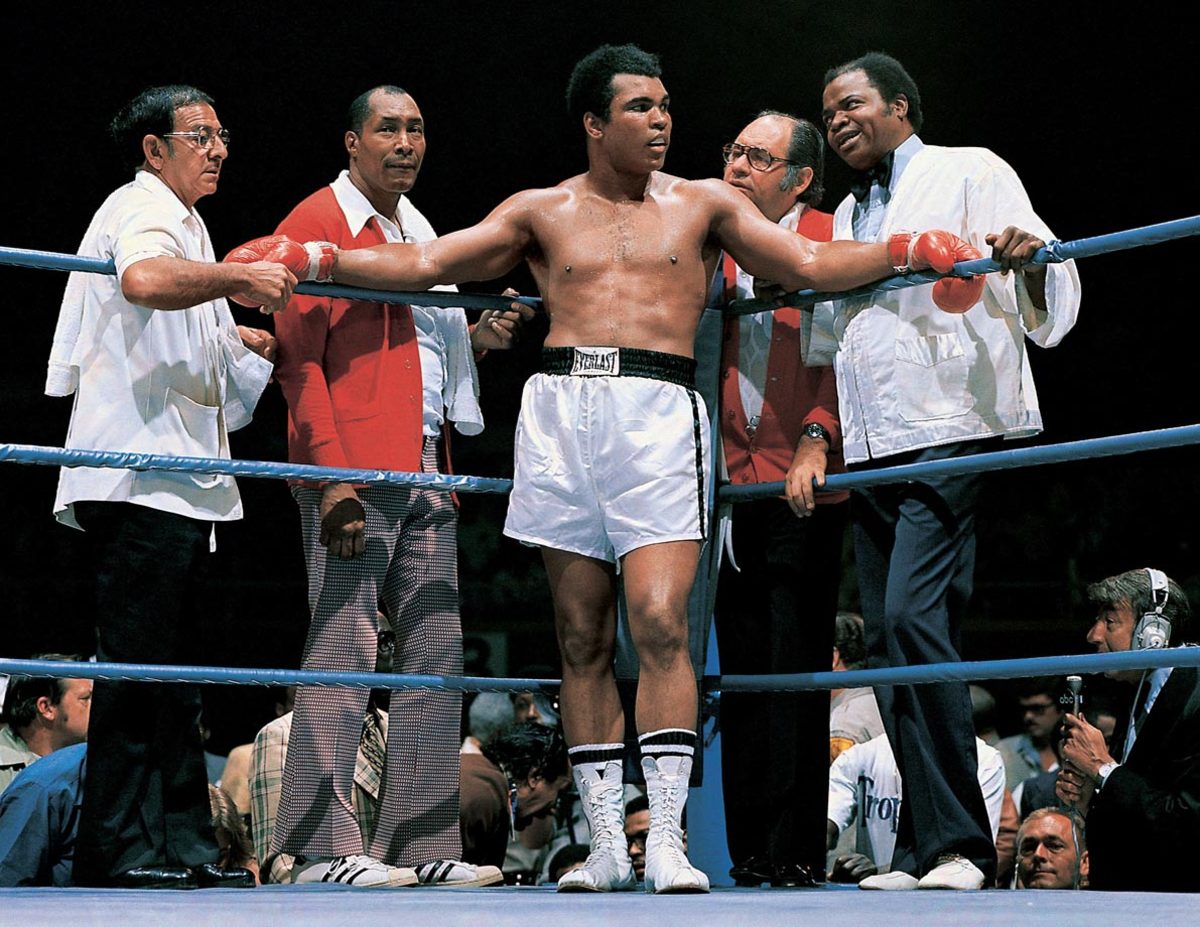
Ali stands with trainer Angelo Dundee, assistant trainer Wali Muhammad, physician Dr. Ferdie Pacheco and assistant trainer Drew Bundini Brown before his bout with Ron Lyle in May 1975. Ali won the fight by technical knockout in the 11th round.
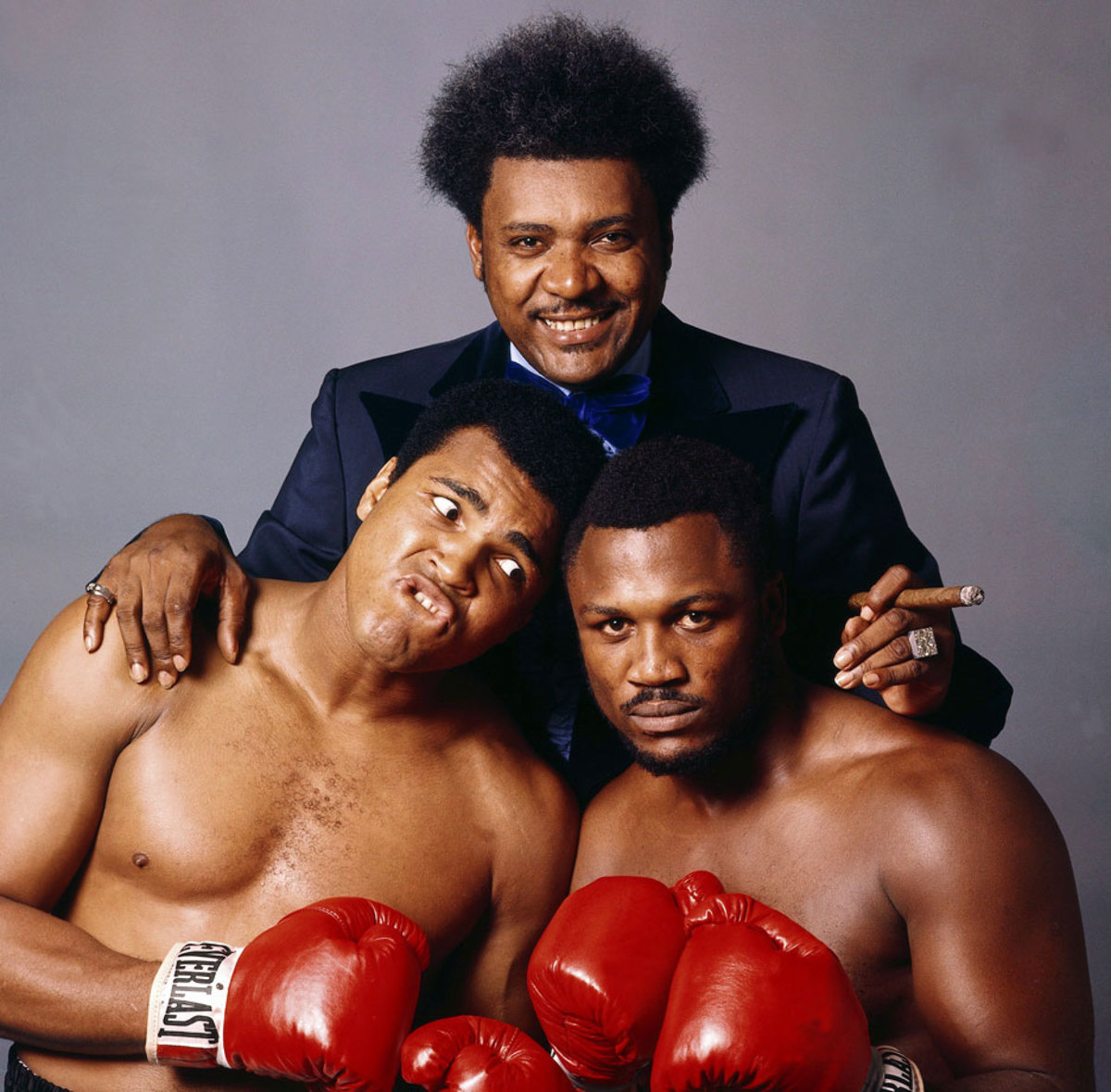
Along with Don King and Joe Frazier, Ali sat for a portrait leading up to the Thrilla in Manila. Ali verbally abused Frazier during the buildup to the fight, telling the media that "it will be a killa and a thrilla and a chilla when I get the gorilla in Manila."
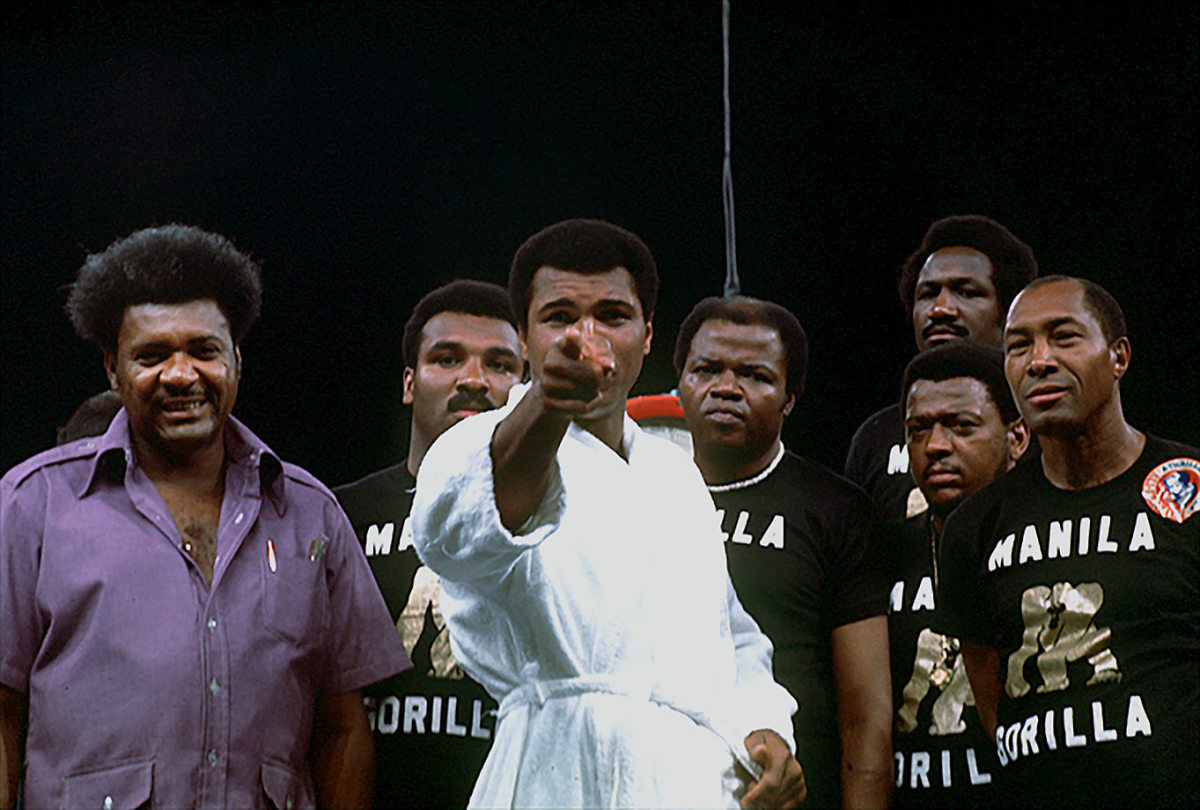
Ali points at the camera with Don King and his training staff behind him before the weigh-in for the Thrilla in Manila in October 1975. Philippine president Ferdinand Marcos offered to sponsor the bout and hold it in Metro Manila to divert attention from the turmoil in the country that had forced the imposition of martial law in 1972.
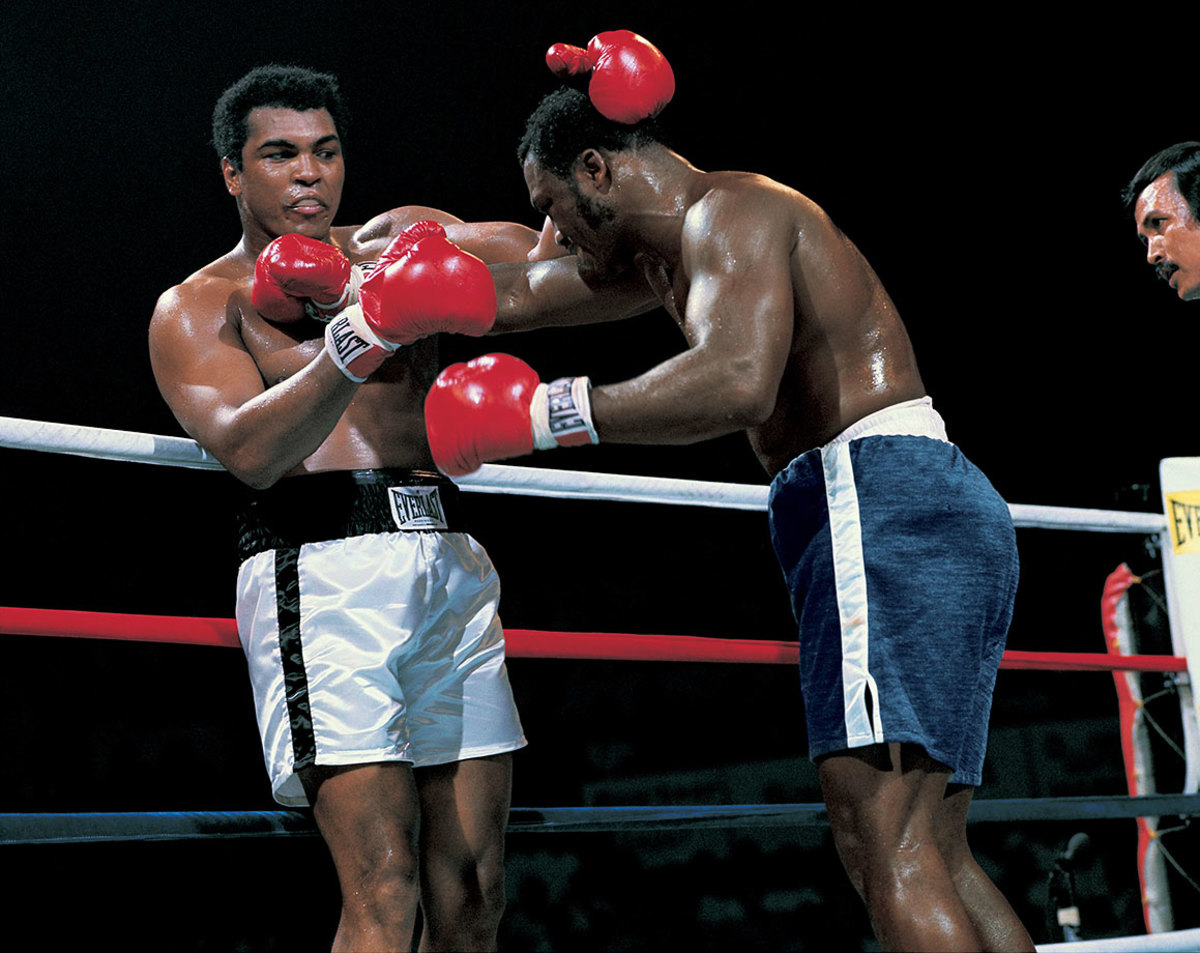
Wrapping up Joe Frazier proved more difficult than Ali expected, having thought Frazier would represent an easy payday and be unable to live up to his billing. The fight turned out to be a brutal affair.
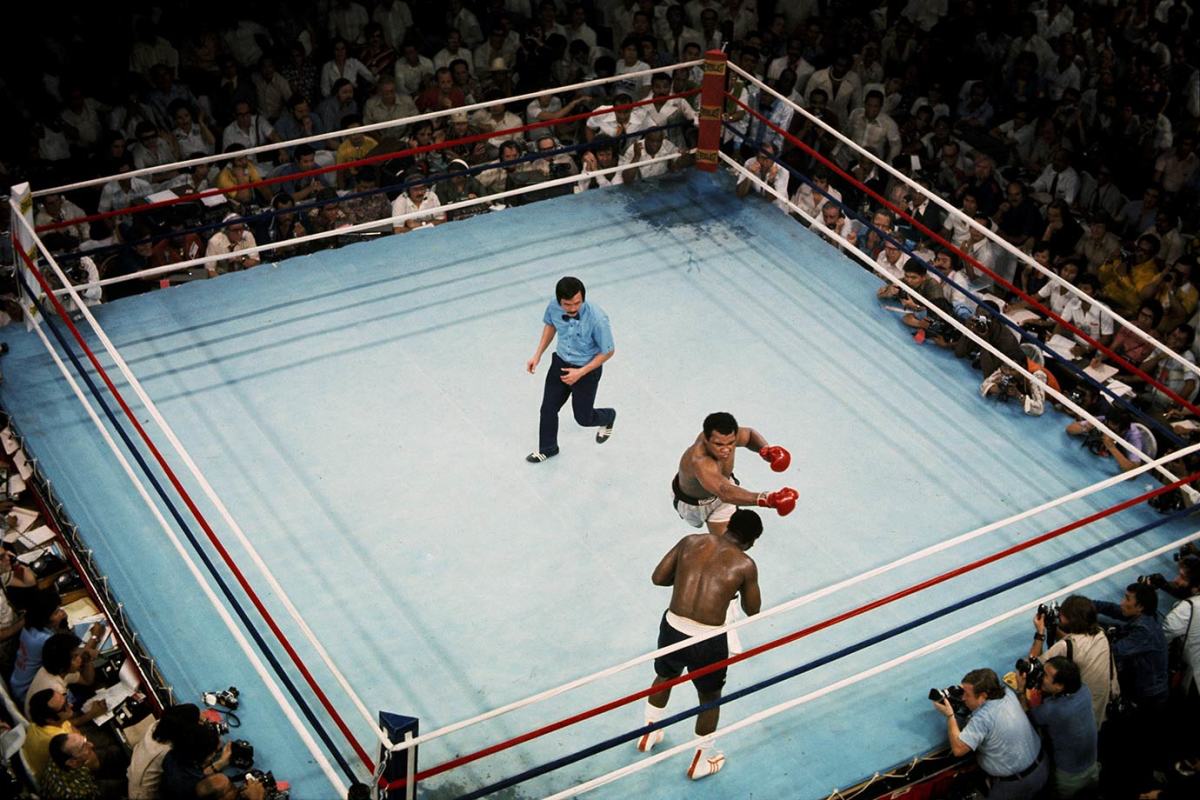
Frazier faces an Ali right hook in their fight in Quezon City, Philippines. The two fighters traded vicious blows during their 14 rounds. "Man, I hit him with punches that'd bring down the walls of a city," Frazier said. Ali withstood the blows to win by TKO in the 15th round.
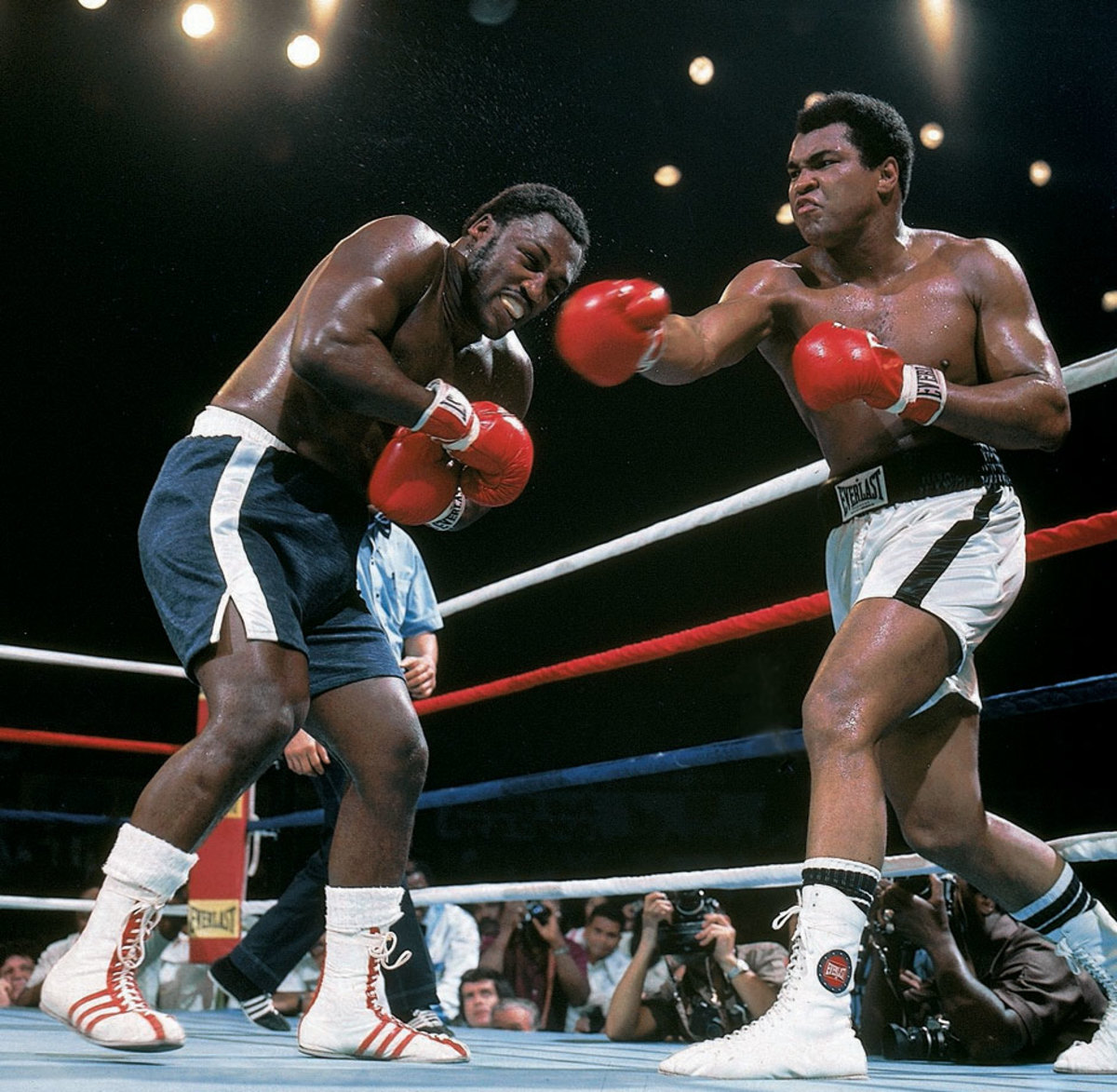
The third fight between Ali and Frazier, Ali won the bruising battle between the two powerful punching heavyweights when Frazier's trainer, Eddie Futch, stopped the fight before the 15th round.
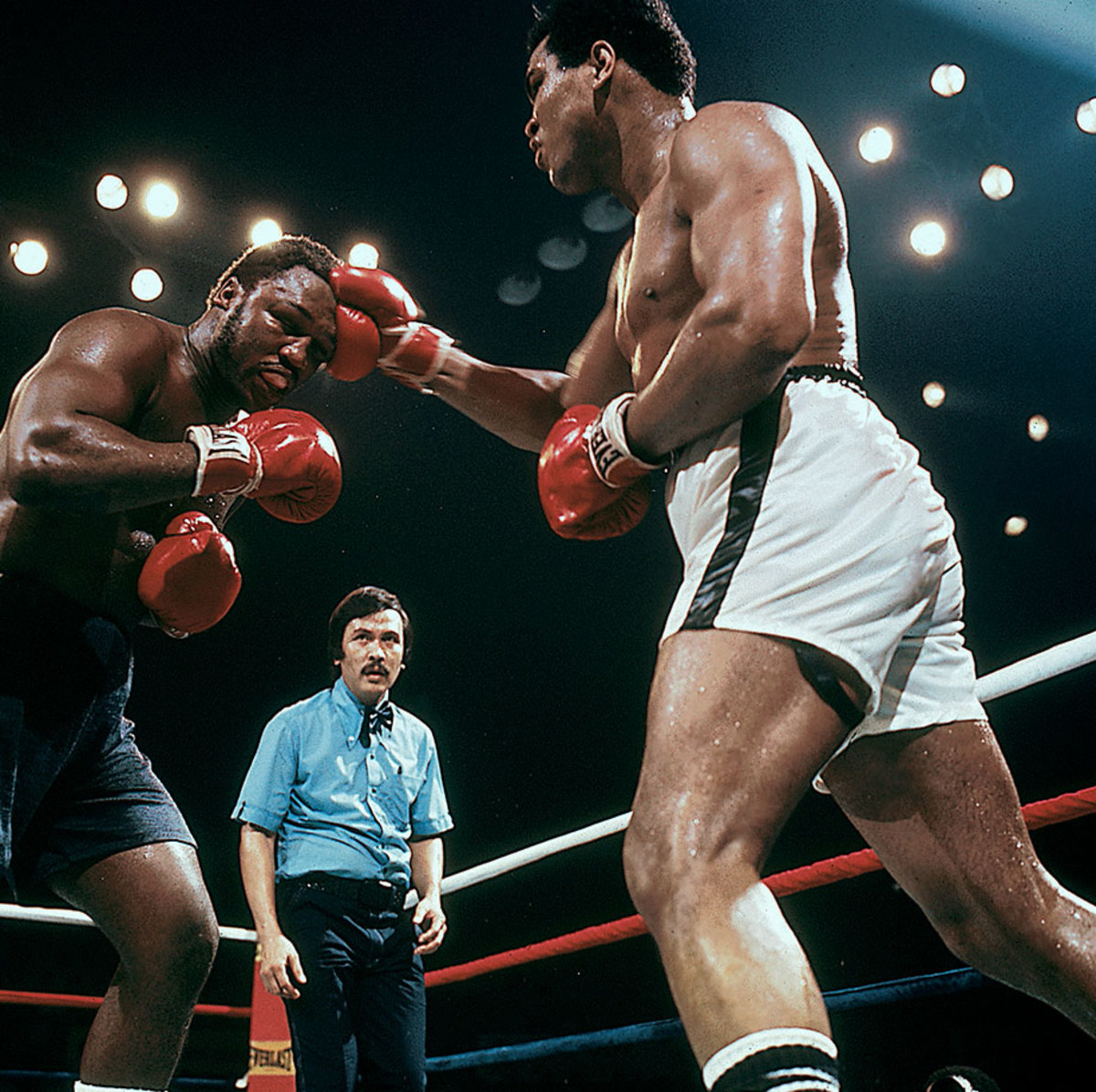
A back and forth exchange, Ali controlled the early rounds of the Thrilla in Manila before Frazier fought back with powerful hooks. Ali finished strong, regaining momentum in the later rounds.
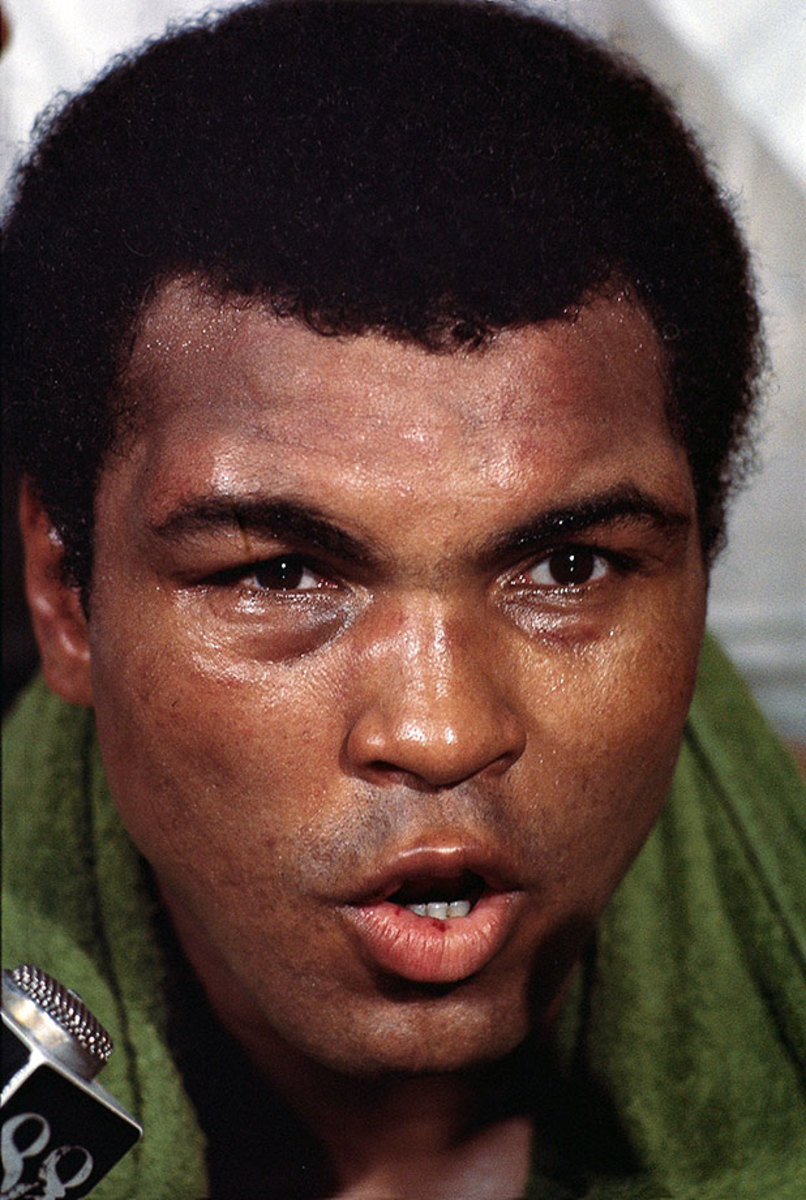
Ali speaks to the press after winning the Thrilla in Manila bout with Frazier.
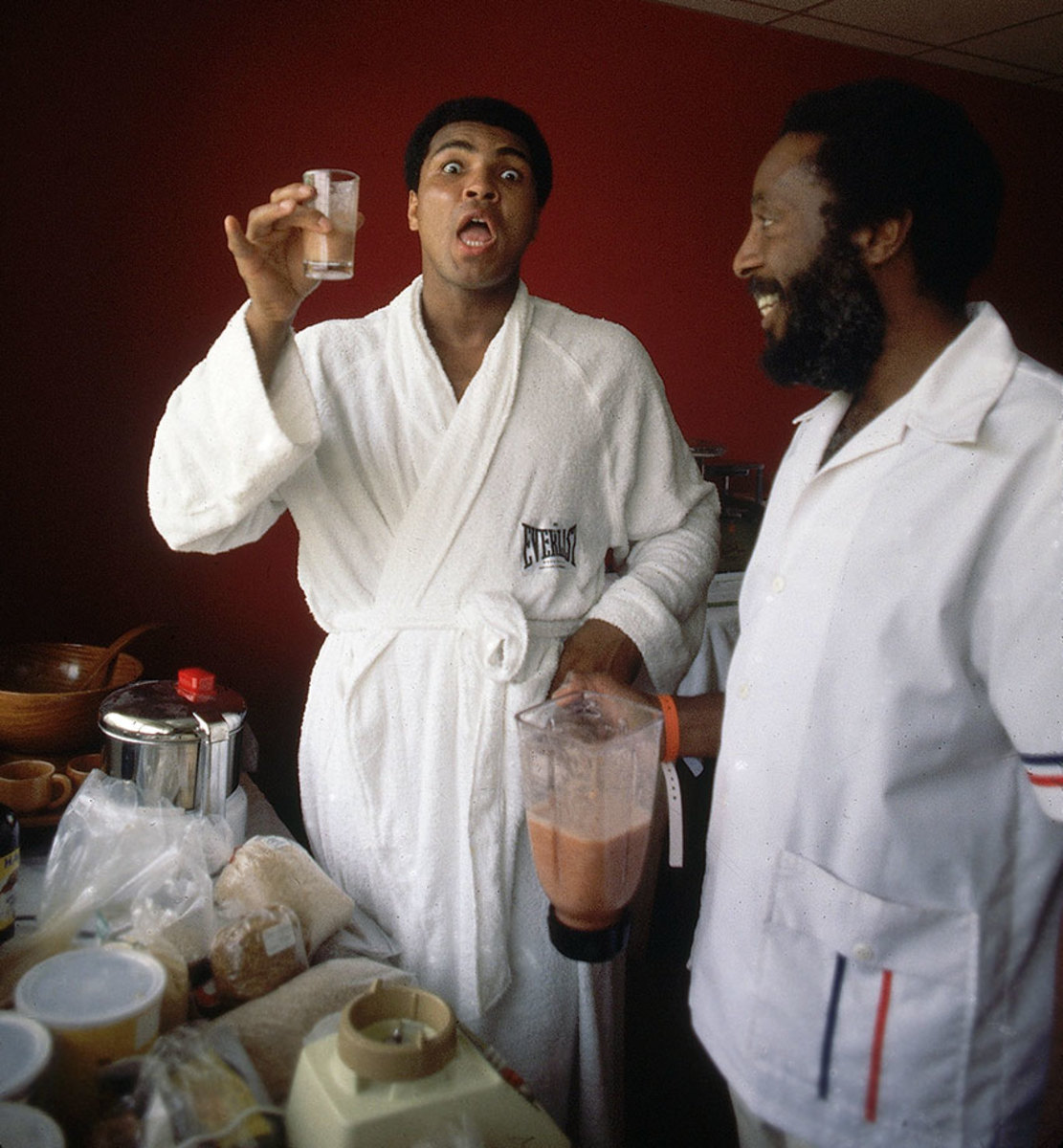
Ali holds a drinking concoction given to him by Dick Gregory, an advocate of a raw fruit and vegetable diet, in 1976.
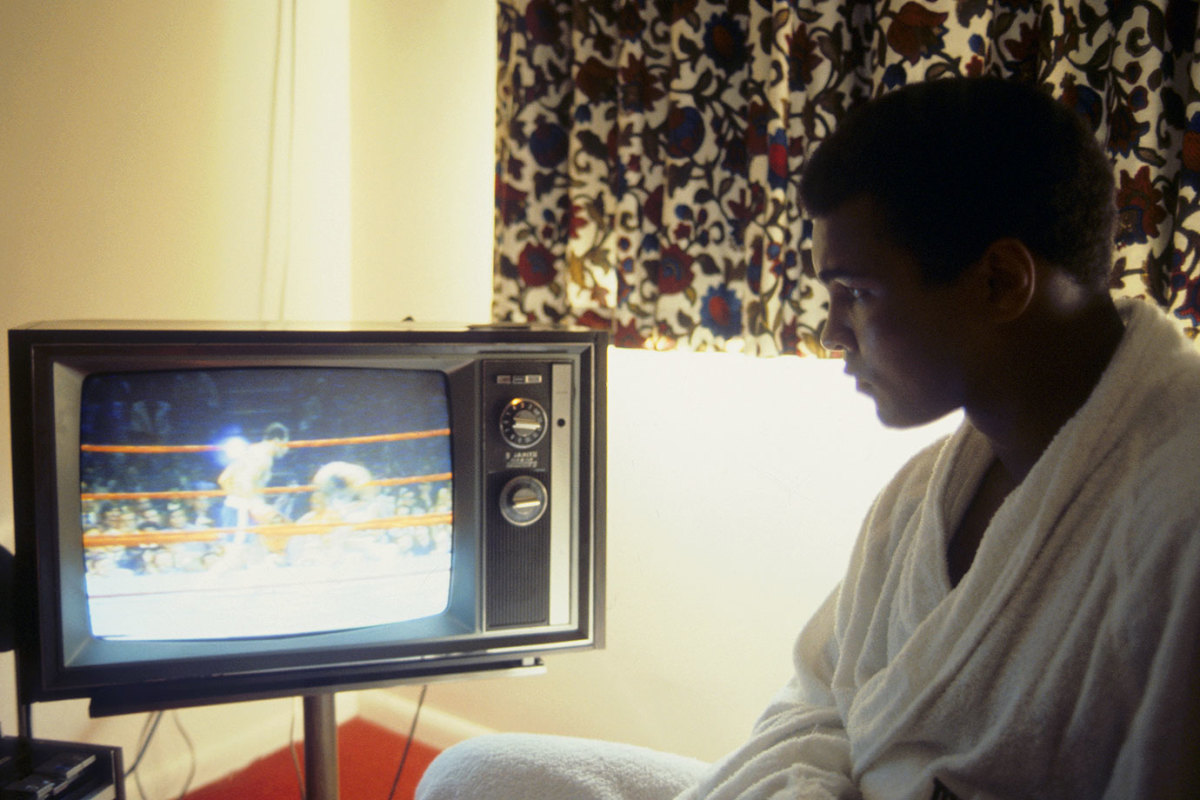
Before his 1976 fight against Ken Norton at Yankee Stadium, Ali watches a fight on television from his hotel room. A police strike at the time of the fight created a dangerous environment outside the stadium that all but eliminated walk-up sales.
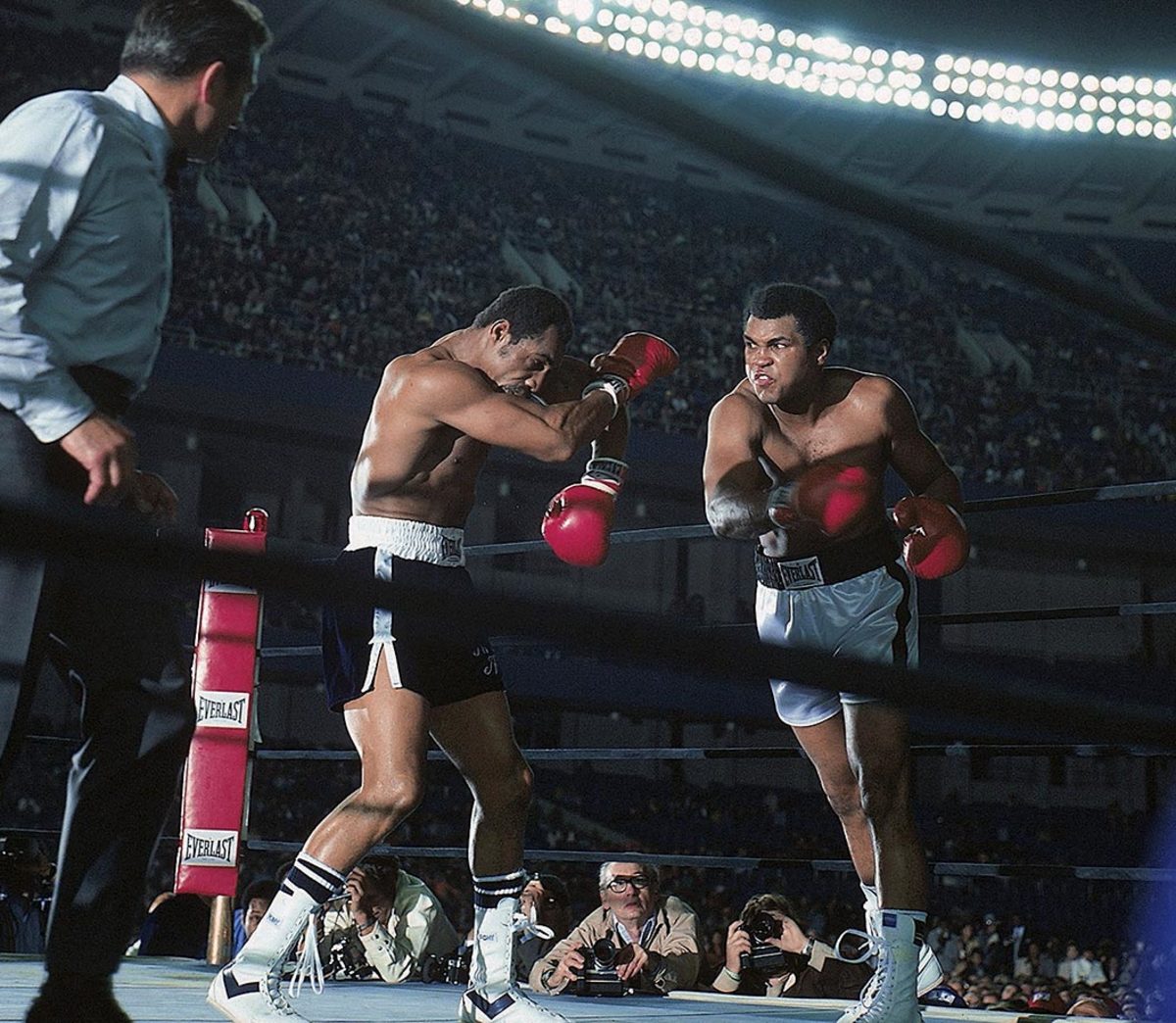
Norton takes a right hook during the heavyweight title fight against Ali. The bout, which Ali won by a unanimous, but controversial, decision, was the last boxing match at Yankee Stadium until 2010.
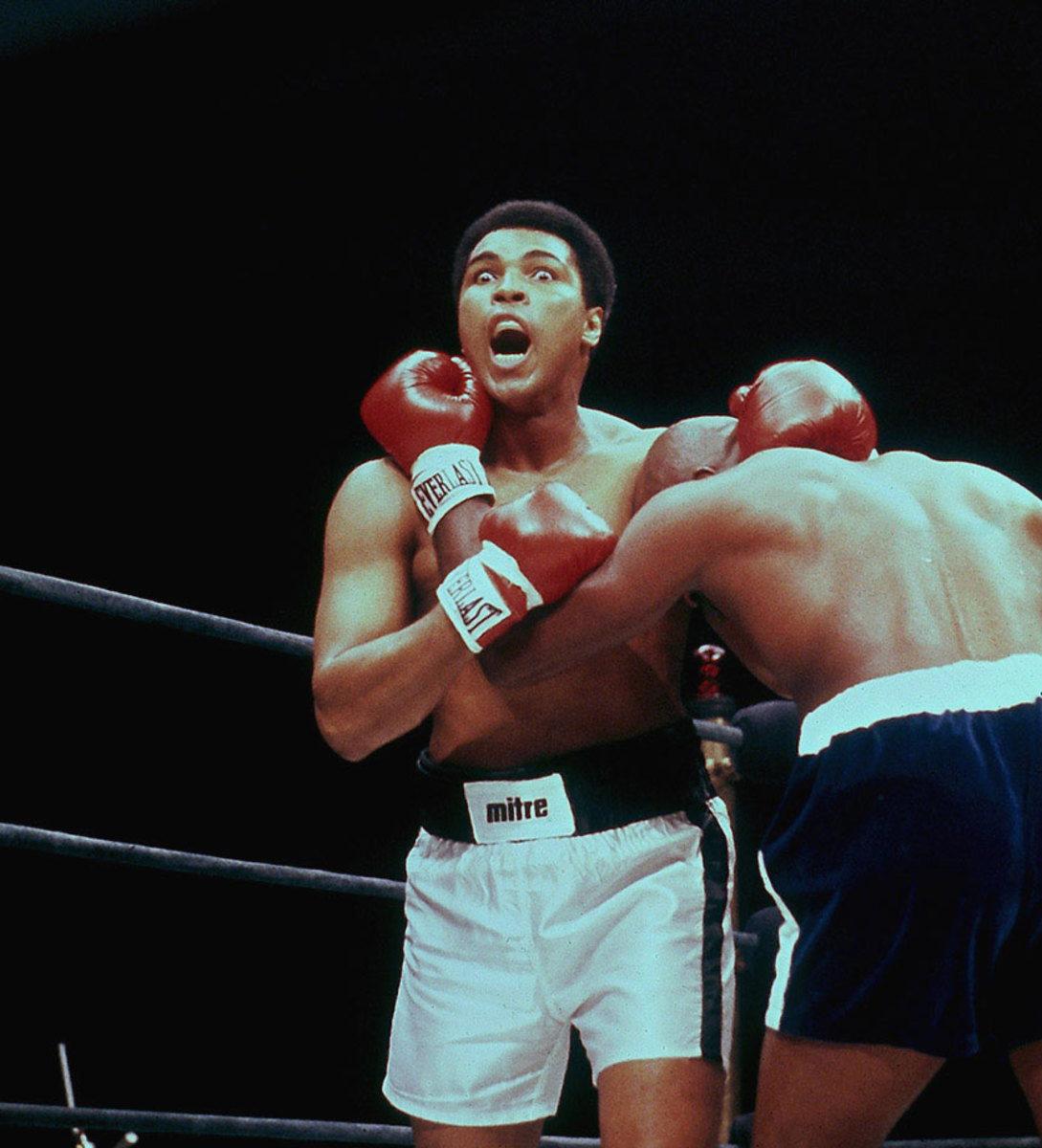
Ali makes a face during his fight with Earnie Shavers in 1977 at Madison Square Garden. Hurt badly by Shavers in the second round, Ali rebounded and outboxed Shavers throughout to build a lead on points before Shavers came on again in the later rounds. Seemingly exhausted going into the 15th and final round, Ali remained victorious by producing a closing flurry that left Shavers wobbling at the bell and the Garden crowd once again in delirium over his Ali magic.
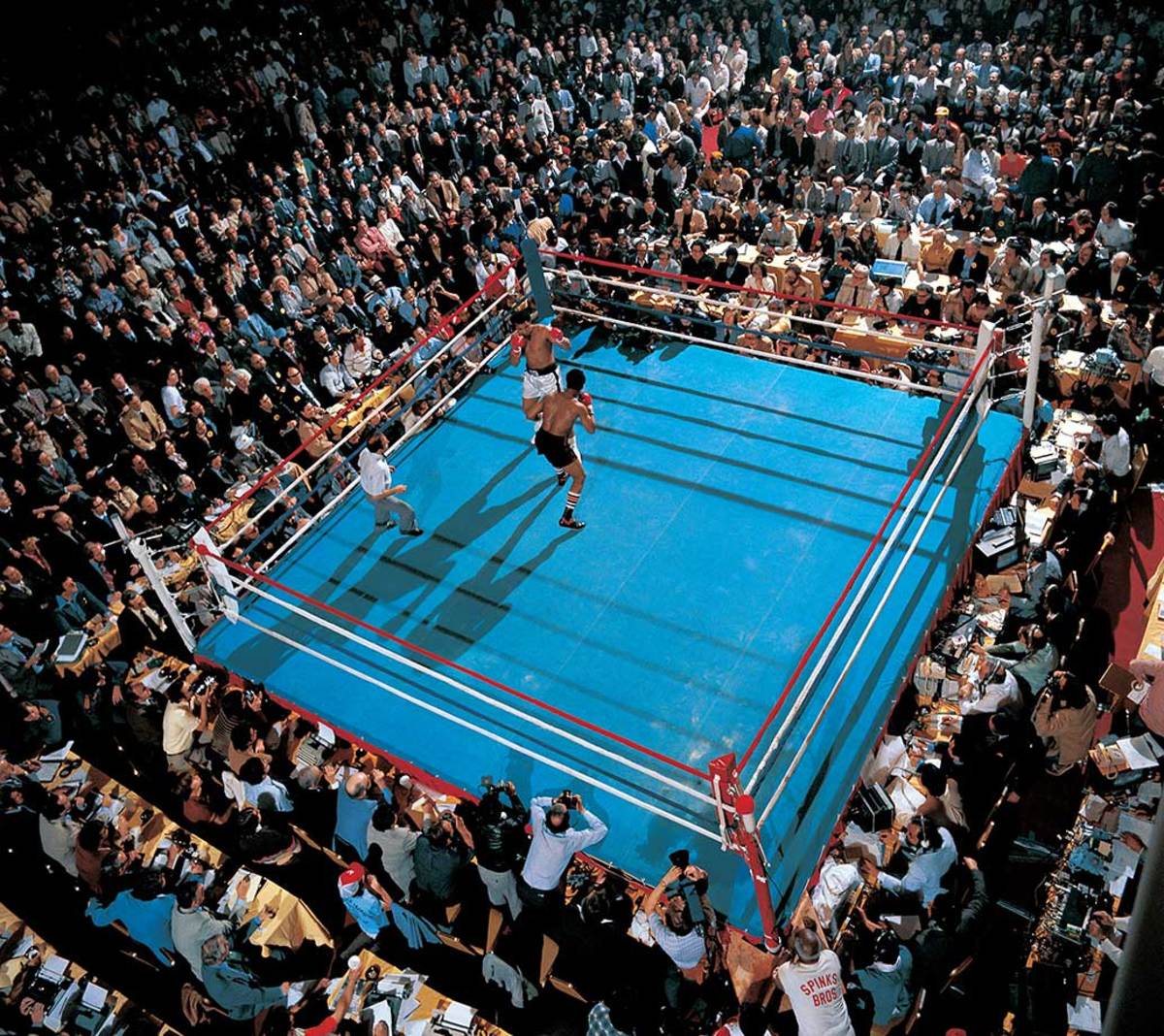
Ali squares off with Leon Spinks at the Las Vegas Hilton Hotel in February 1978. Spinks won the fight in a split decision, ending Ali's 3.5-year reign as the heavyweight champion. It was the only time in Ali's career that he lost his championship title in the ring.
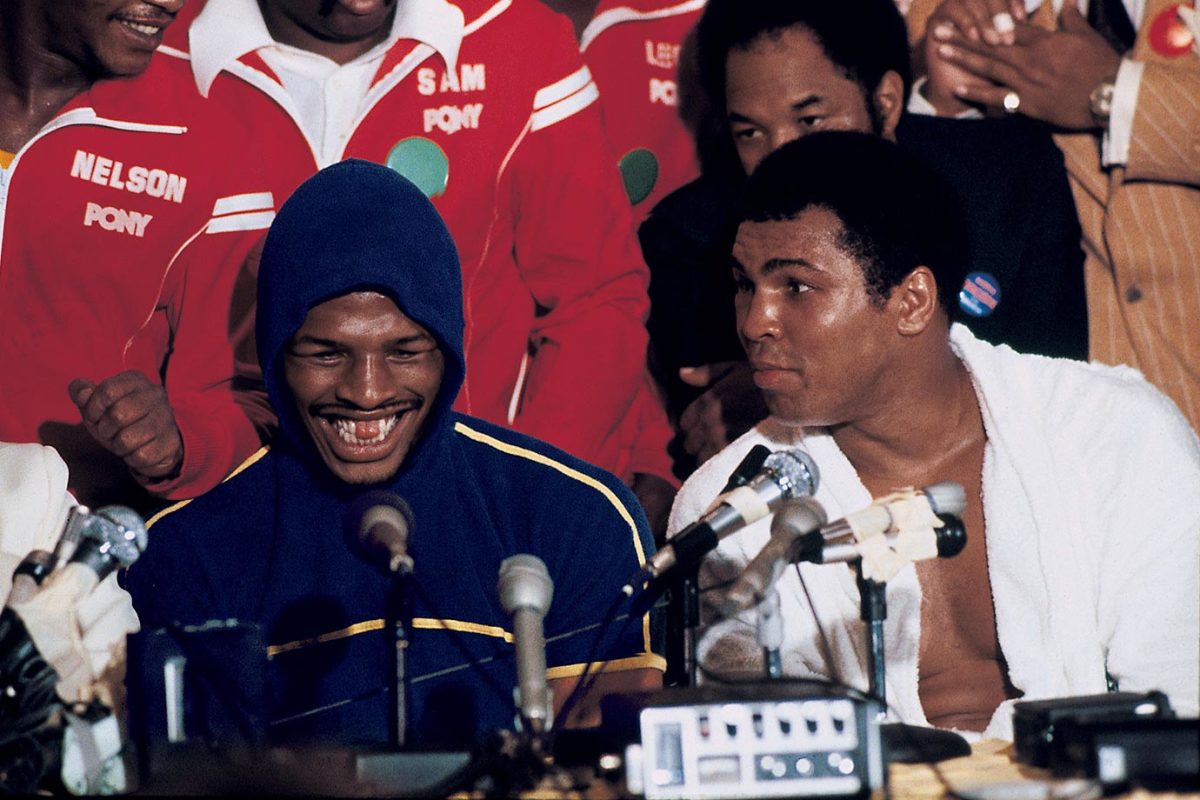
Leon Spinks took center stage over Ali at the press conference after their fight. The victorious Spinks and his gap-toothed grin were featured on the Feb. 19, 1978 cover of Sports Illustrated.
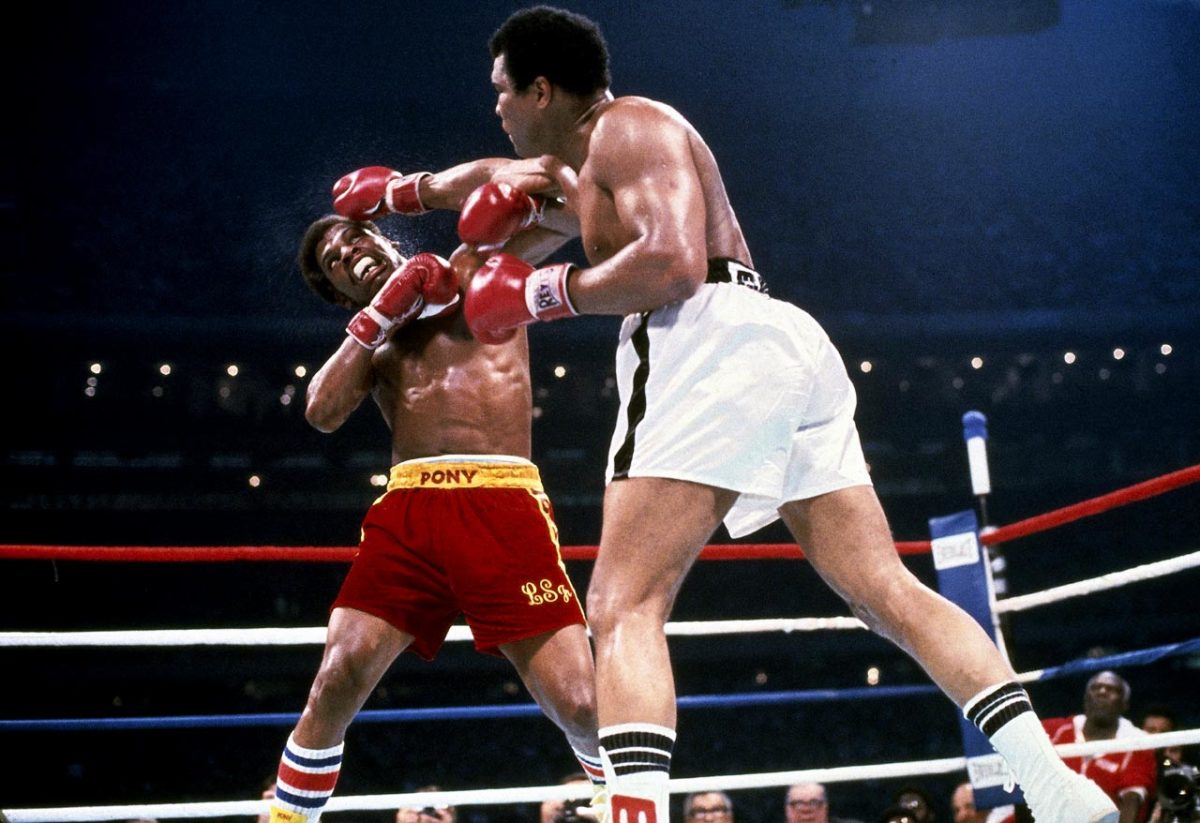
Ali lands a straight right hand to the head of Spinks in the rematch of their title bout in 1978. Ali won on a 15 round decision.
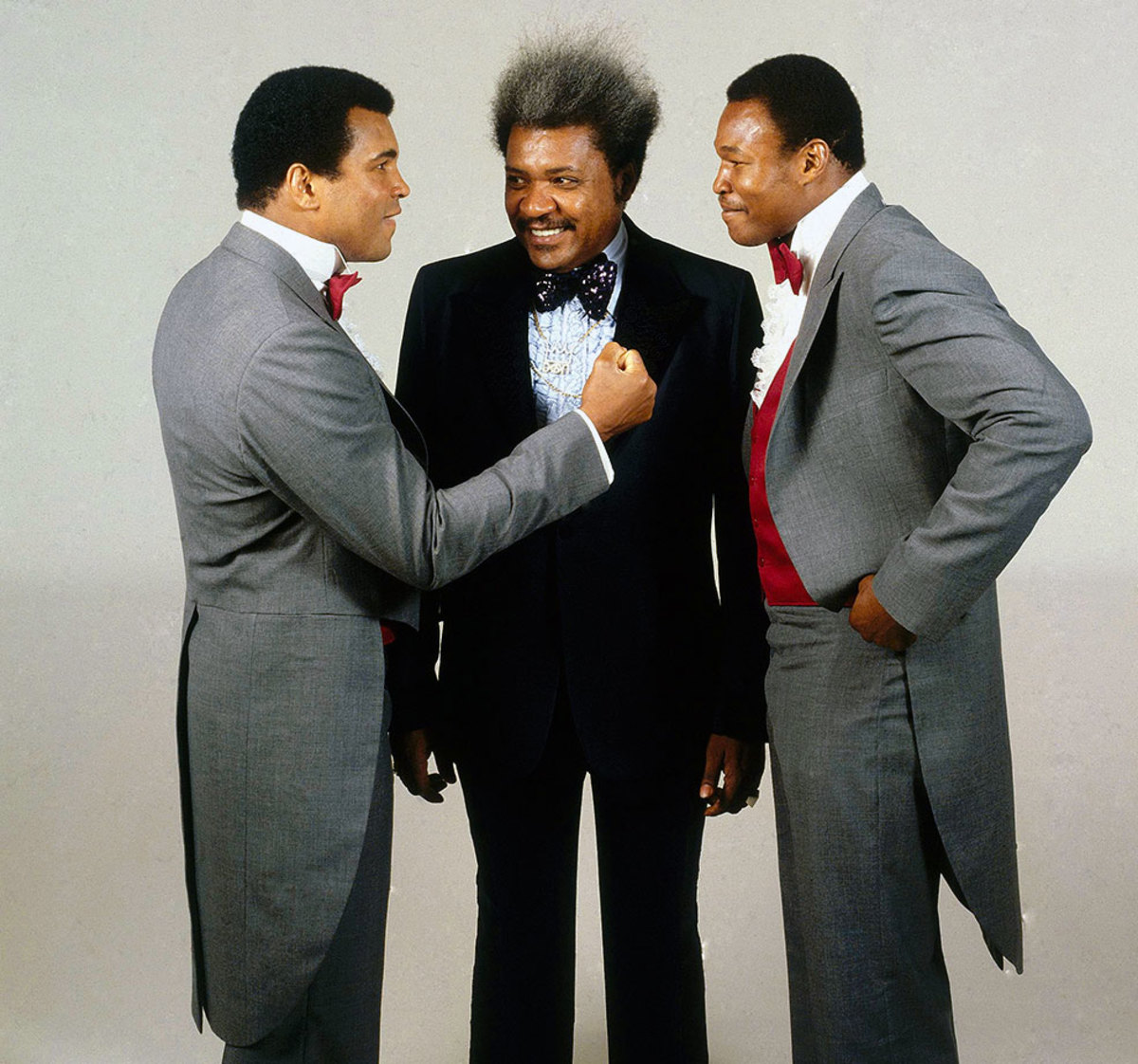
Don King pulled the strings again when Ali faced Larry Holmes before their November 1980 fight. King became a key figure in Ali's career, promoting his biggest fights, the Thrilla in Manila and the Rumble in the Jungle.
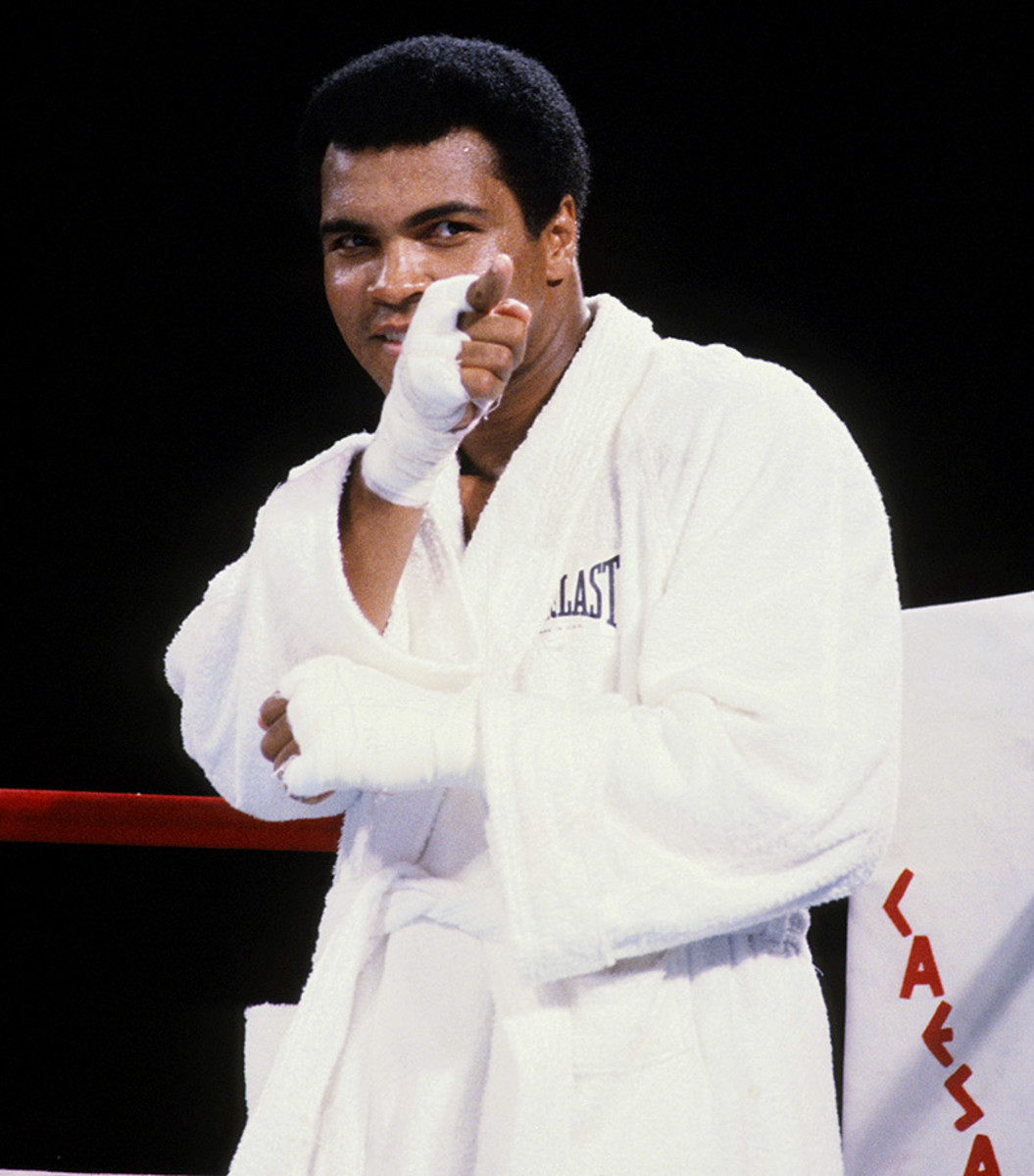
Ali points at Larry Holmes before their bout at Caesars Palace in 1980.
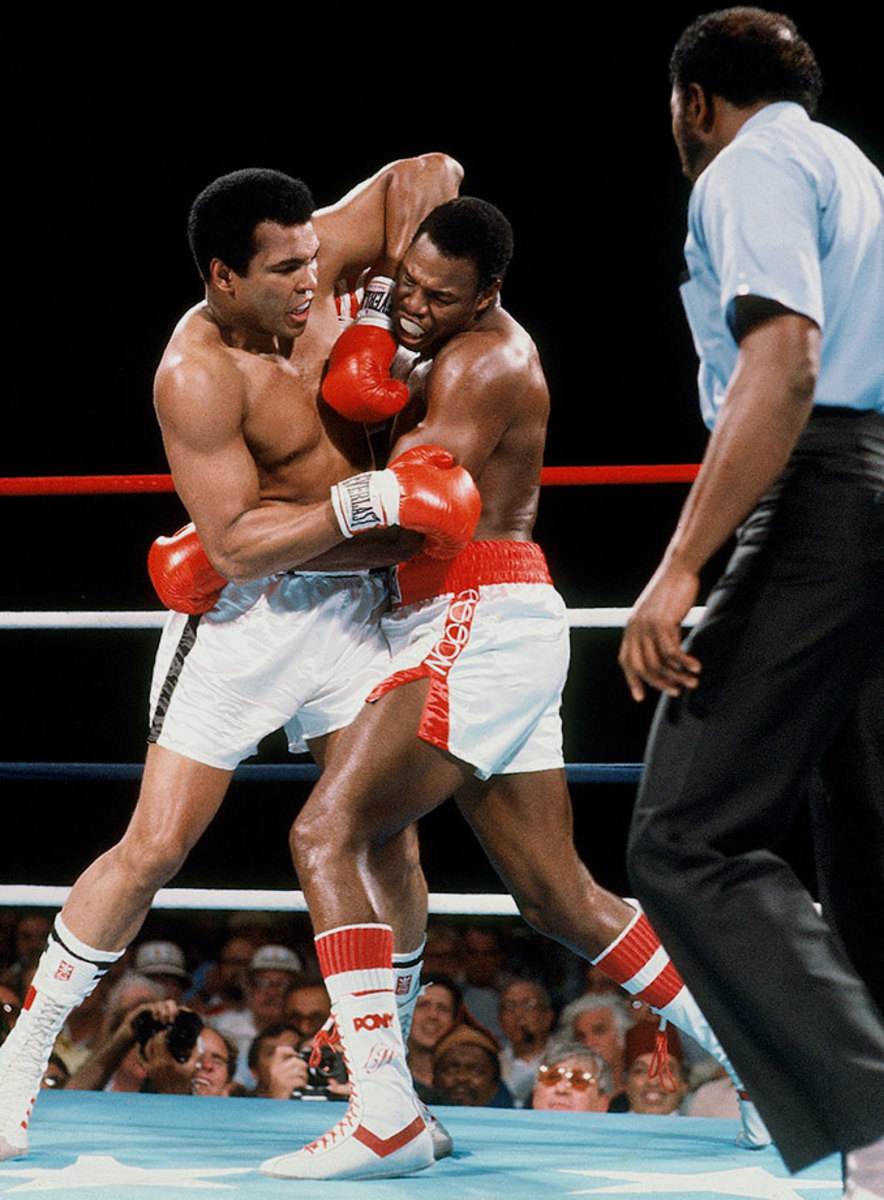
Ali grapples with Holmes during their bout in 1980. Trainer Angelo Dundee stopped the fight in the 11th round, marking the fight as Ali's only career loss by knockout.
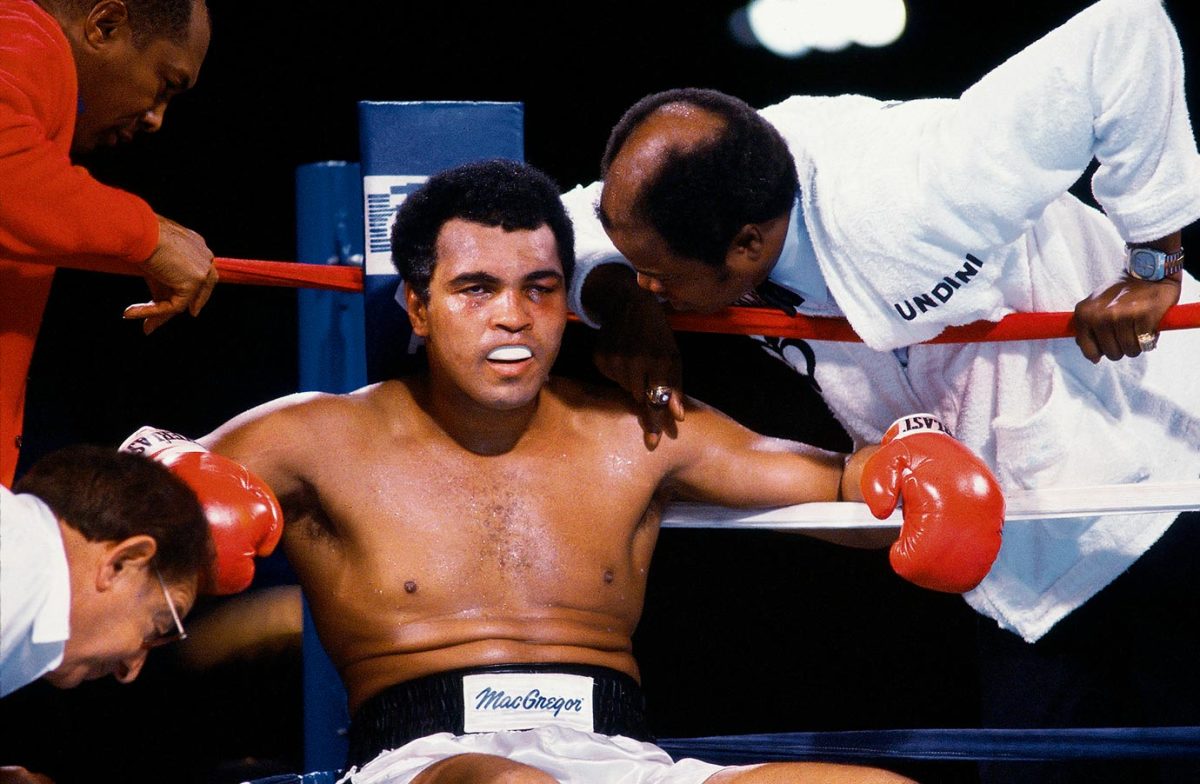
Drew Bundini Brown leans in to speak to Ali, who returned to fight Holmes after a brief retirement. By this time, Ali had already begun developing a vocal stutter and trembling hands and taken thyroid medication to lose weight that left him tired and short of breath.
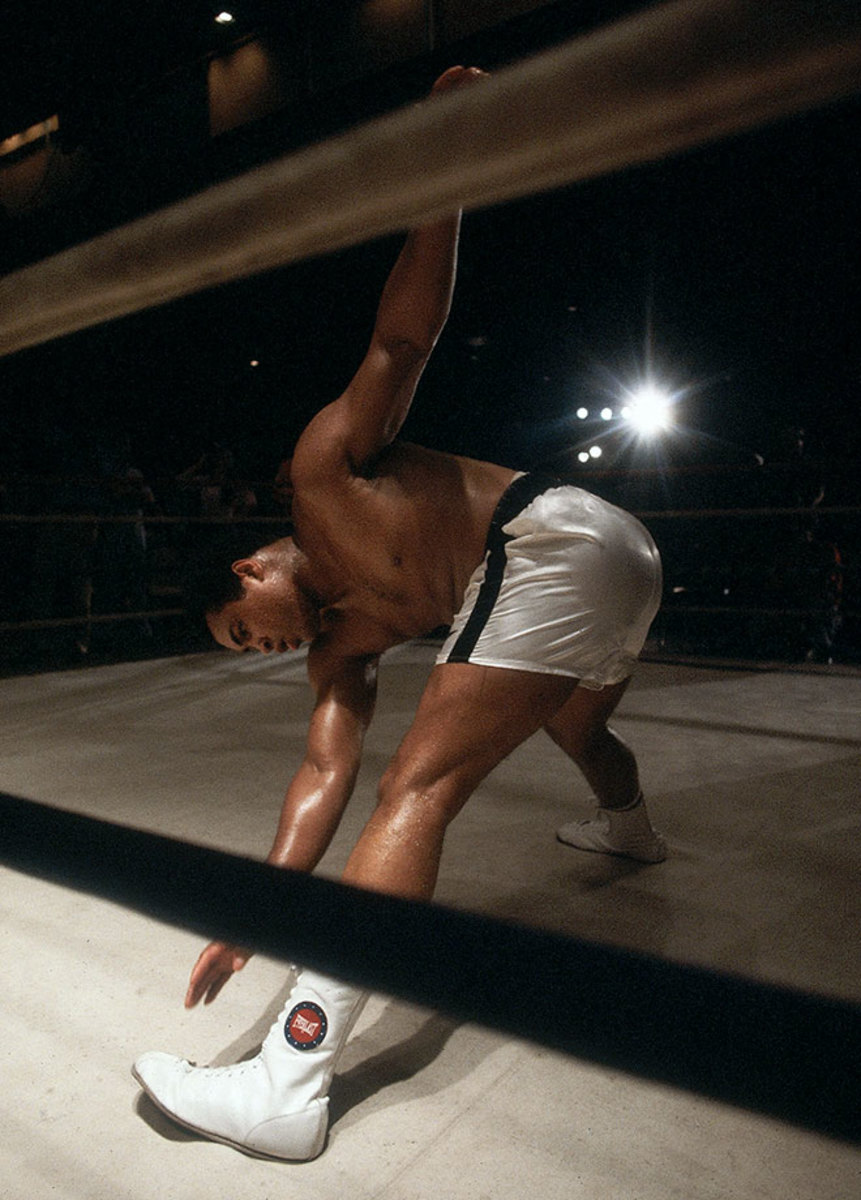
Ignoring pleas for his retirement, Ali stretches before a fight against Trevor Berbick in Nassau, Bahamas. Ali lost to Berbick in a unanimous decision and retired after the bout, the 61st of his career.
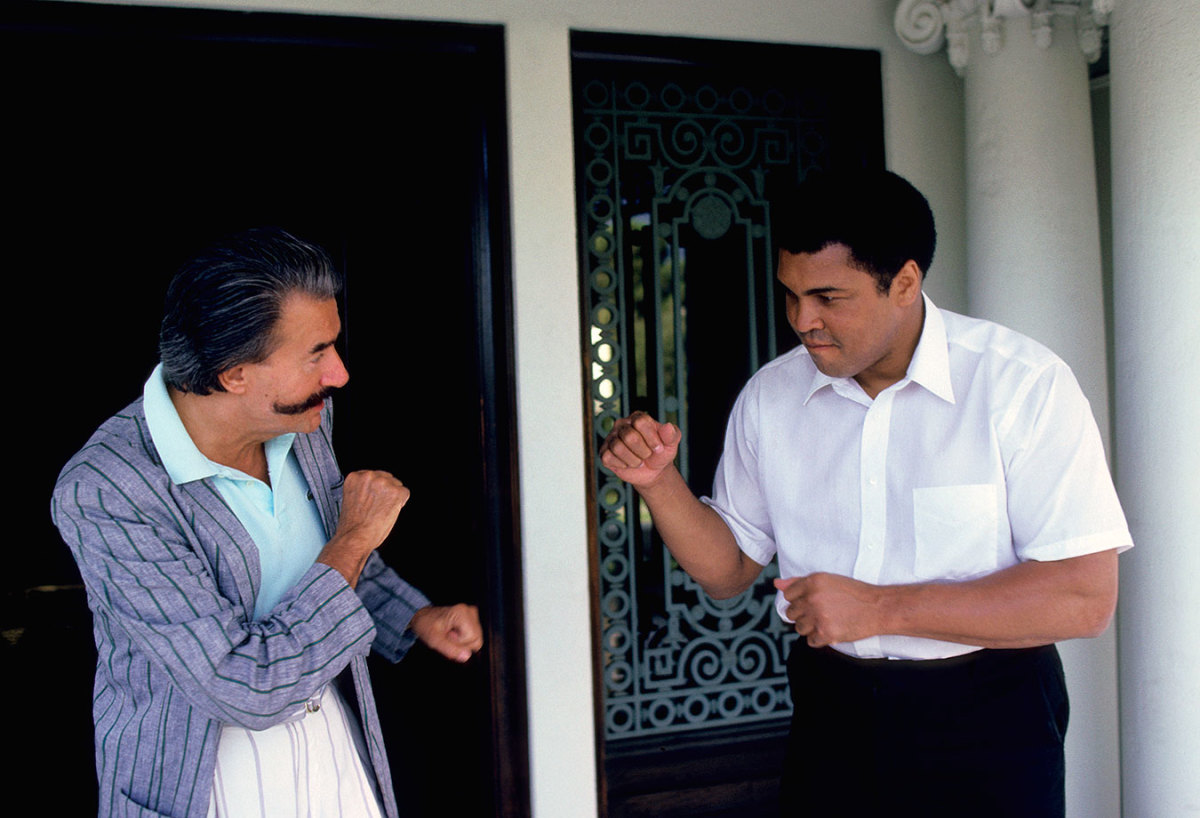
Ali pretends to spar with artist LeRoy Neiman at his home in Los Angeles. Neiman met Ali in 1962 and made many paintings and sketches from throughout Ali's life.
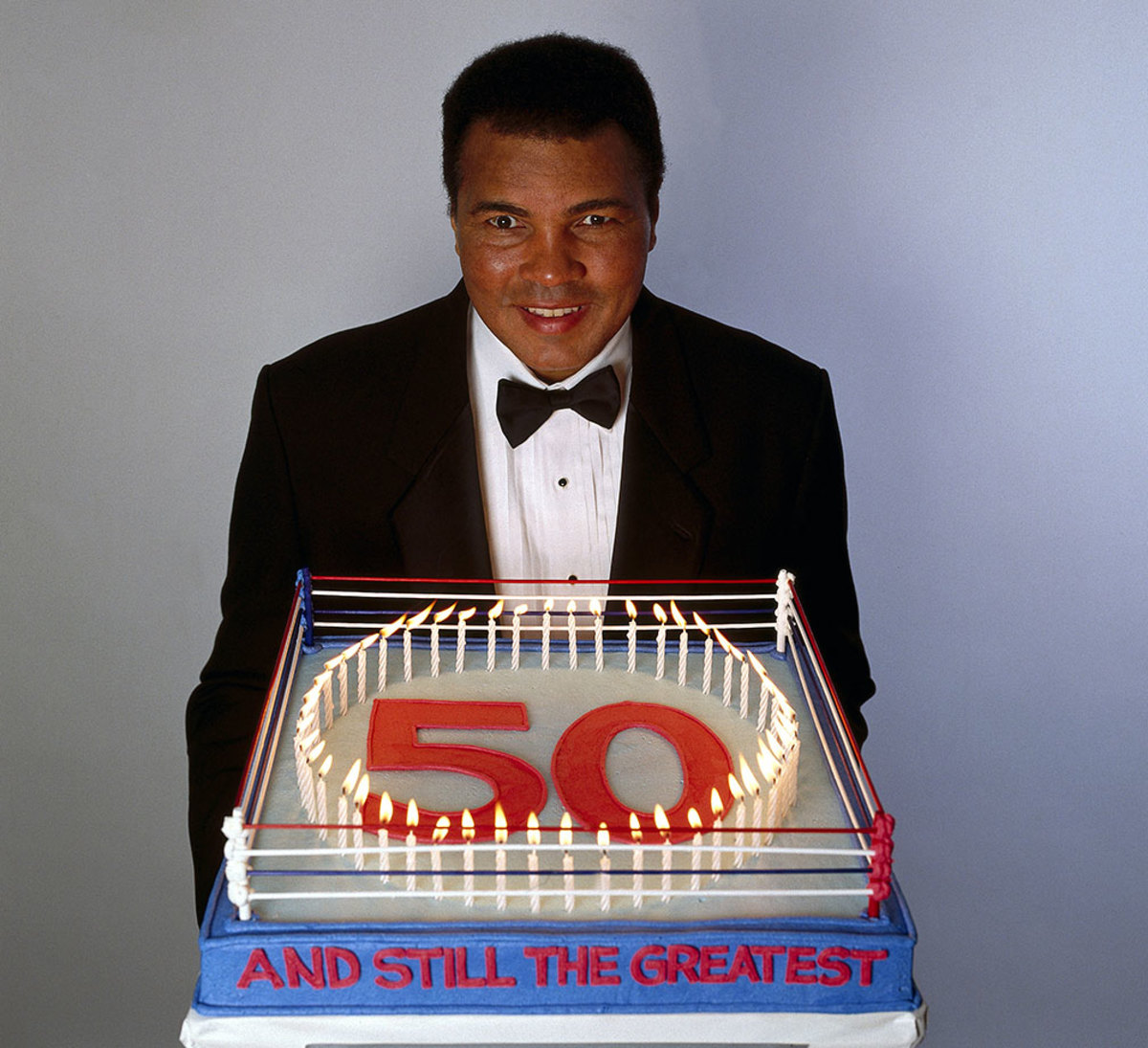
Cake in hand, Ali poses for a 50th birthday portrait in 1991. Although diagnosed with Parkinson's syndrome seven years earlier, Ali was still active, traveling to Iraq during the Gulf War to meet with Saddam Hussein in an attempt to negotiate the release of American hostages.
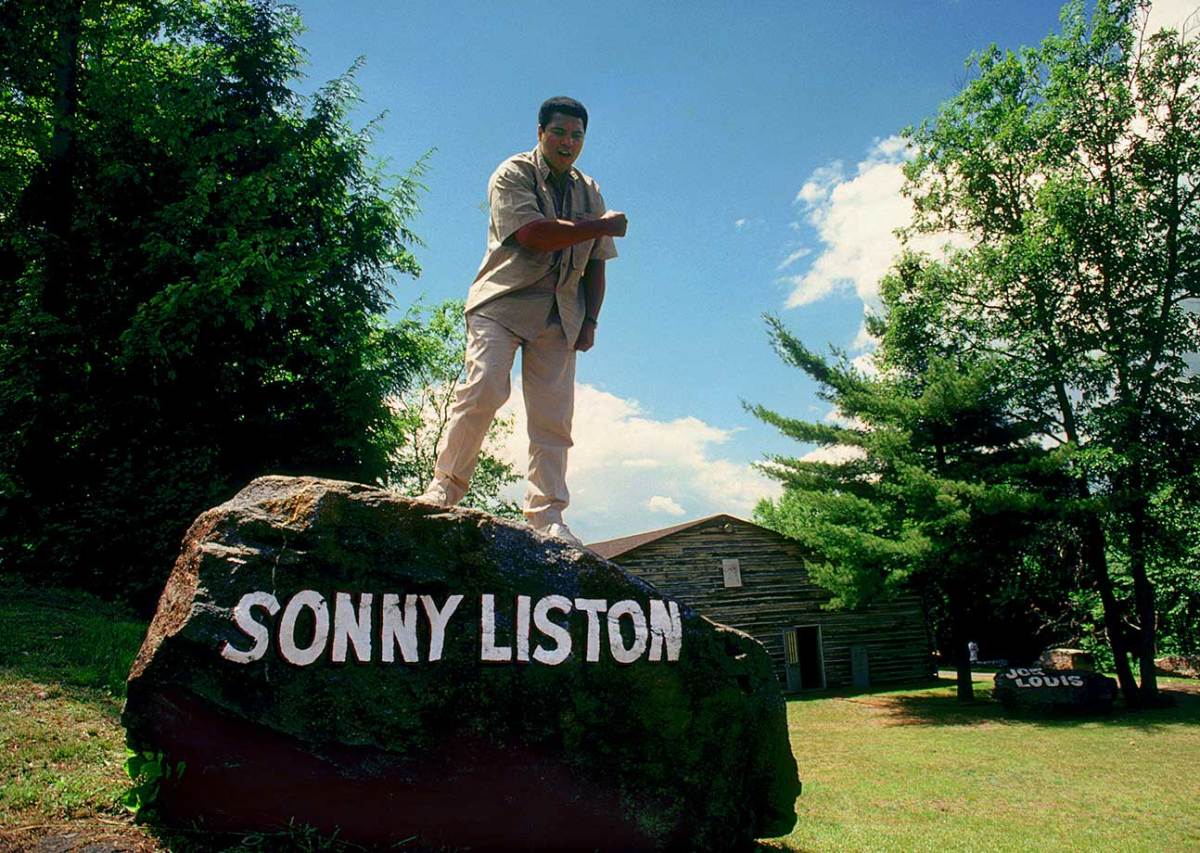
The same year, Ali stands atop of the Sonny Liston rock at his old training camp cabin. Ali and his father painted the names of famous boxers he admired on 18 boulders at the camp.
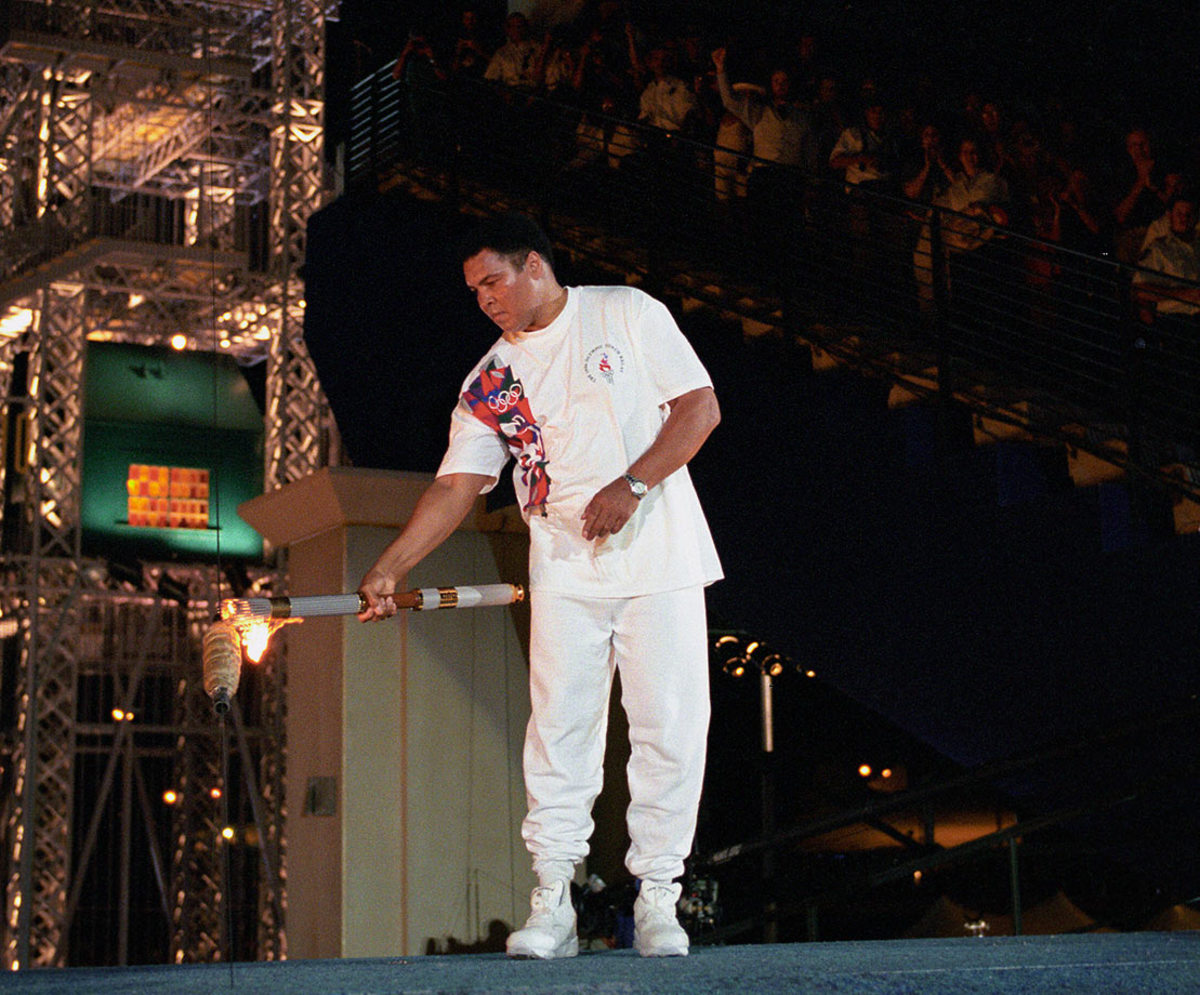
Ali carries the Olympic torch inside Centennial Olympic Stadium at the 1996 Atlanta Olympics. Despite trembling hands, Ali had the honor to light the Olympic flame in the stadium.
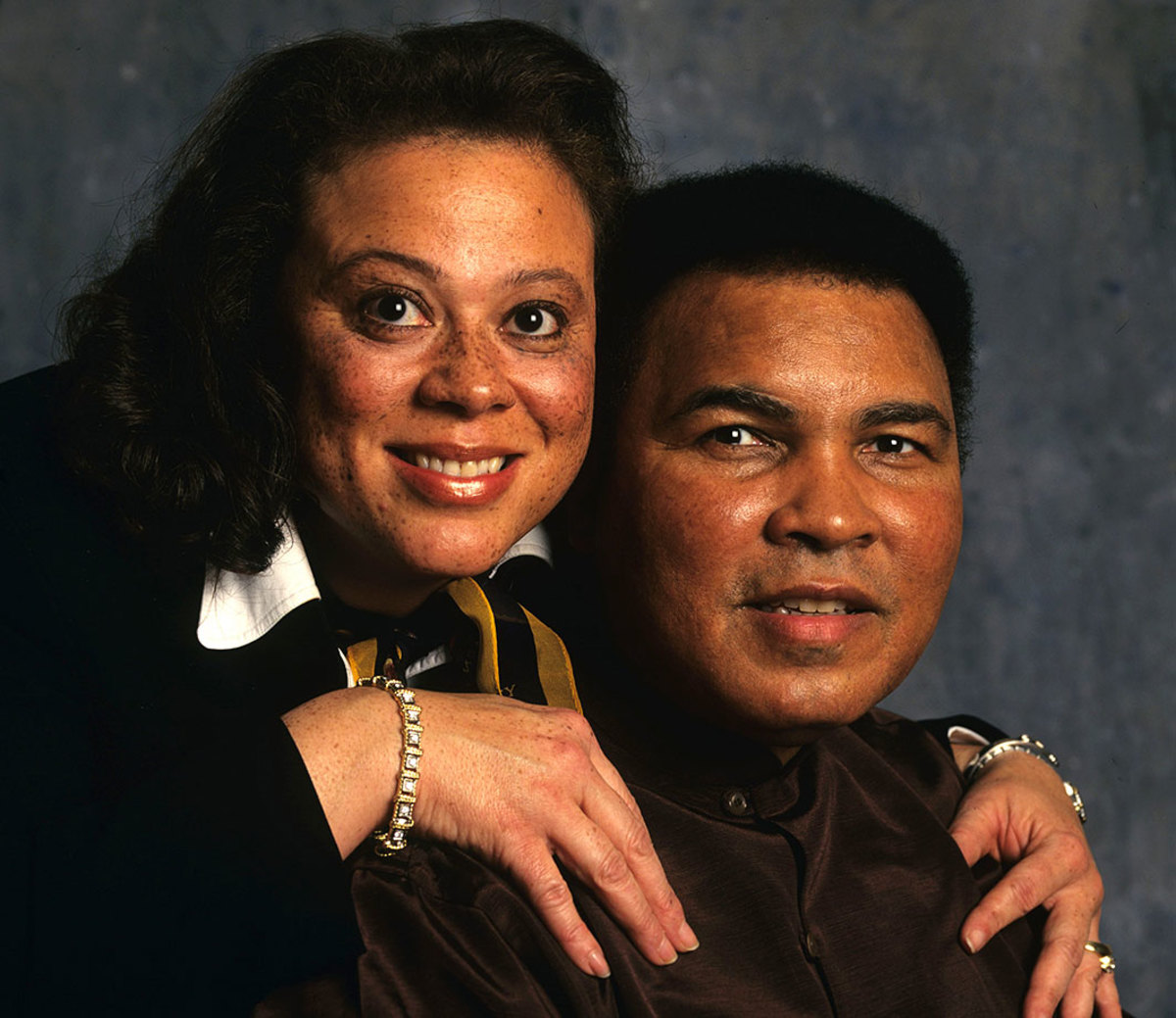
Husband and wife pose for a portrait during a photo shoot in 1997. Muhammad and Lonnie married in 1986 and have an adopted son together, Asaad Amin Ali.
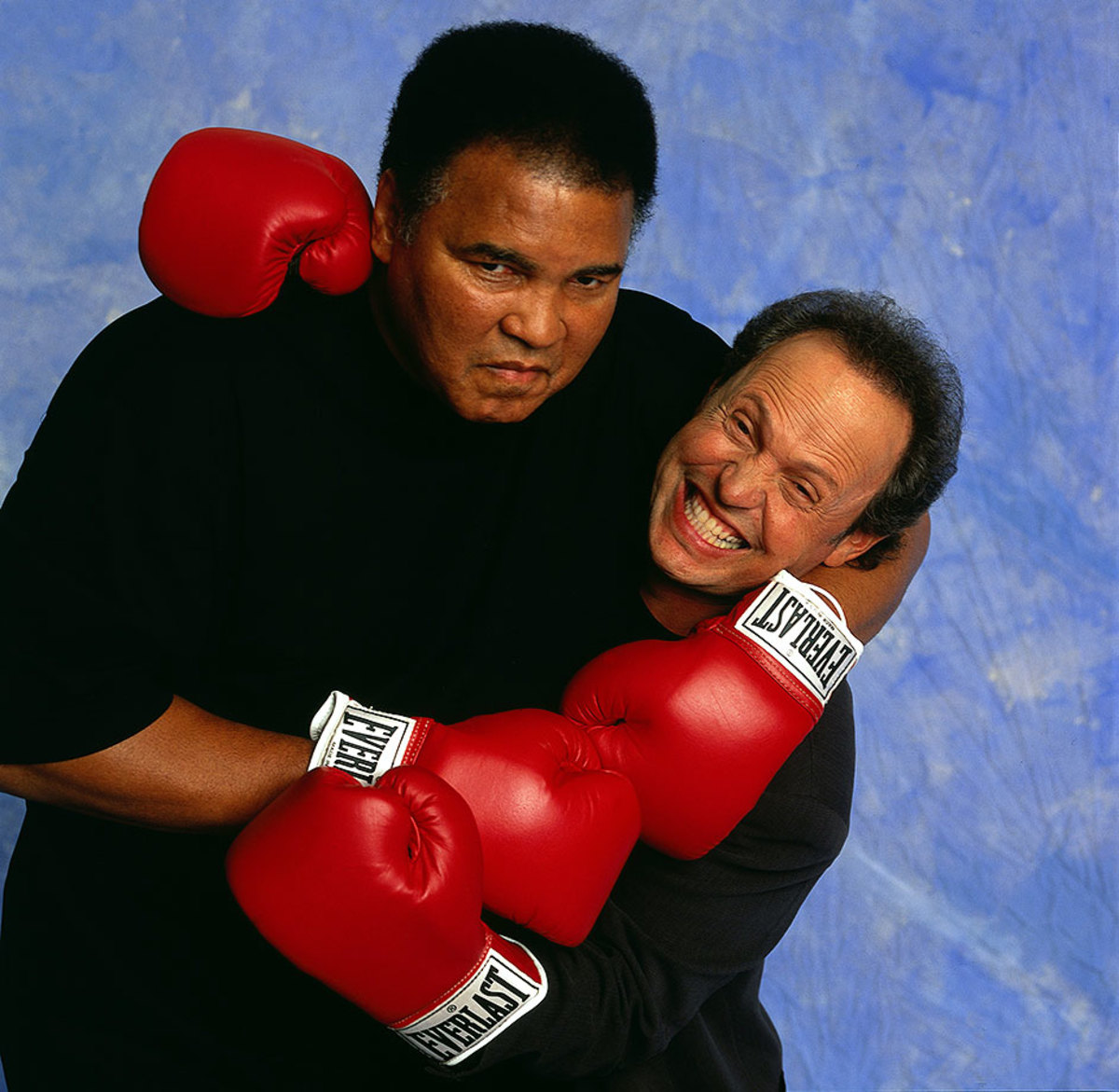
Ali messes around with actor Billy Crystal during a photo shoot in 2000. Crystal's impression of Ali was notorious, and he performed at a tribute to the boxer on his 50th birthday in December 1991.
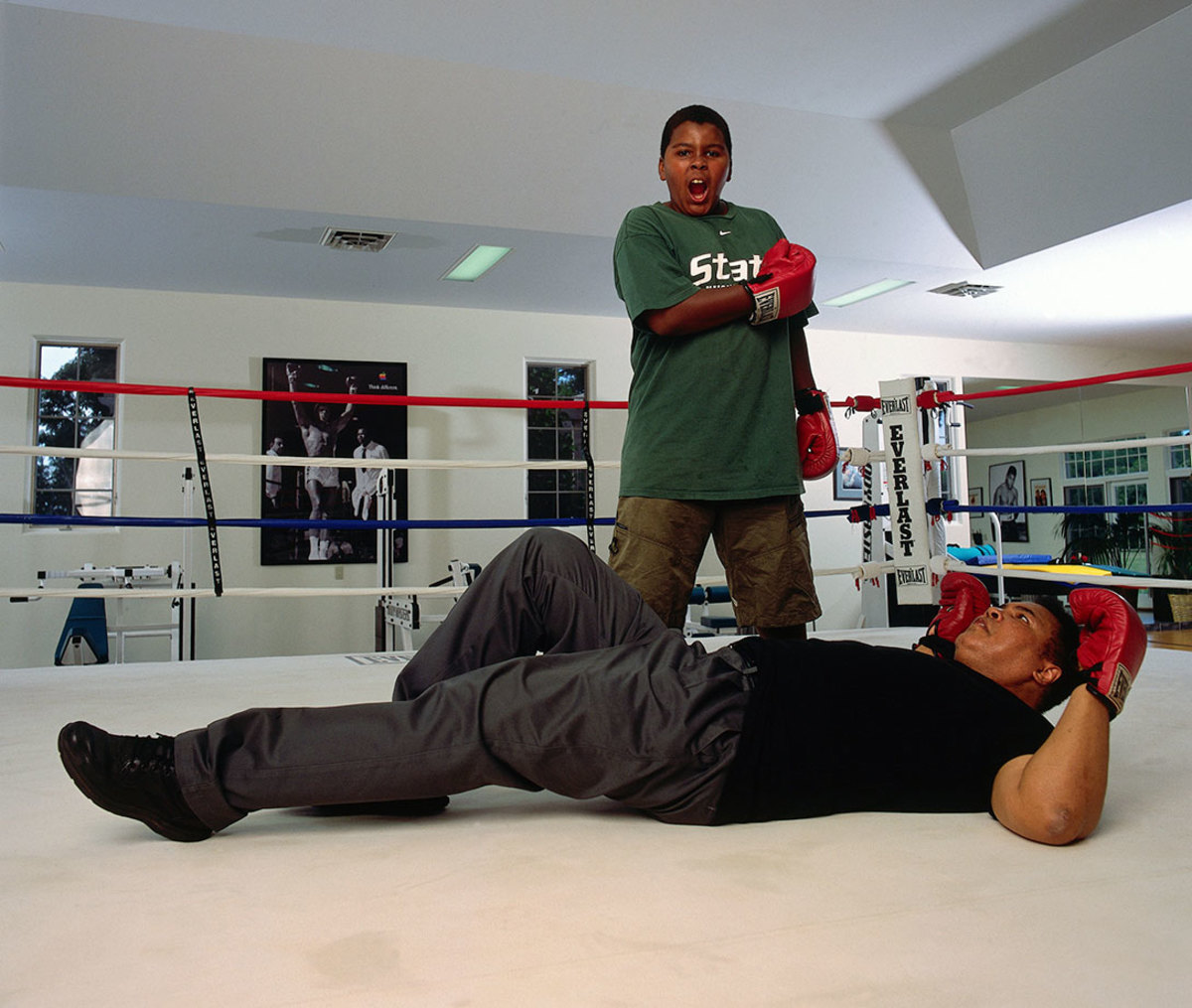
Ali lies on the canvas as his son, Assad Amin Ali, stands over him invoking memories of Ali's victory over Sonny Liston during a photo shoot in the gym at his farm on Kephart Road near Berrien Springs in 2001.
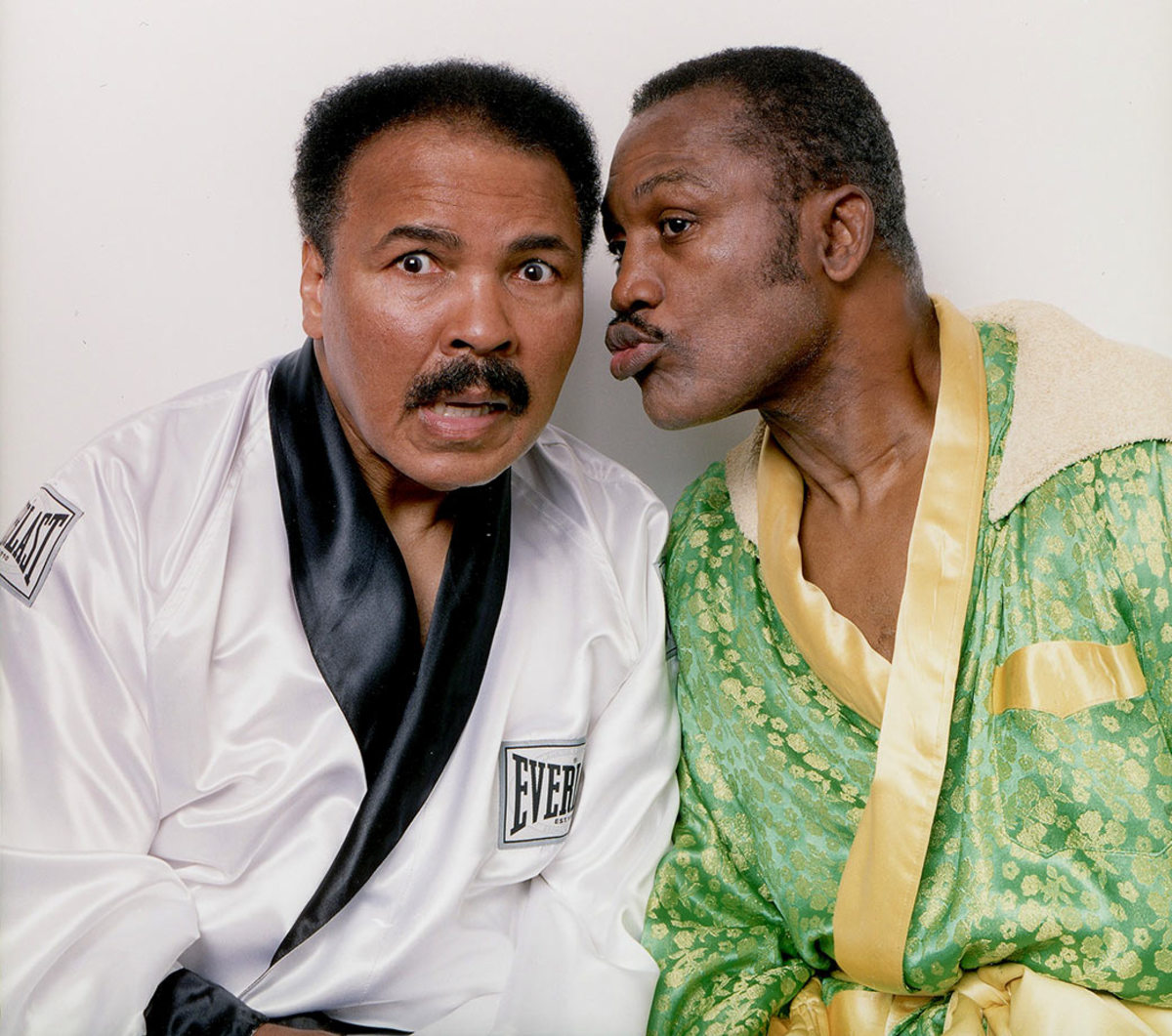
Fierce rivals in the ring, Ali and Joe Frazier pose for a portrait in the boxing robes they wore the night of their first bout at Frazier's Gym in 2003. Ali said after Frazier's death in 2011 that he was "a great champion."
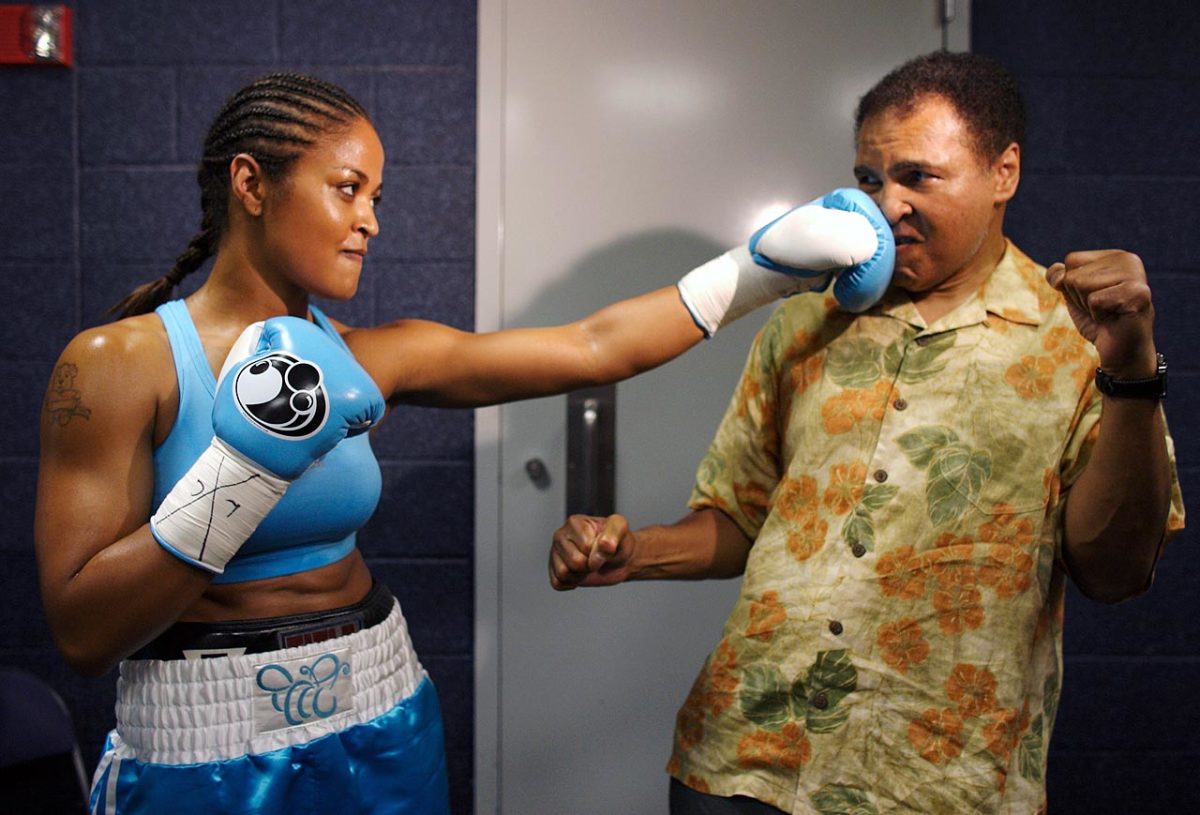
Ali takes a punch from his daughter Laila Ali while sparring before her fight against Erin Toughill in 2005. Laila retired from her own successful boxing career with a professional record of 24-0.
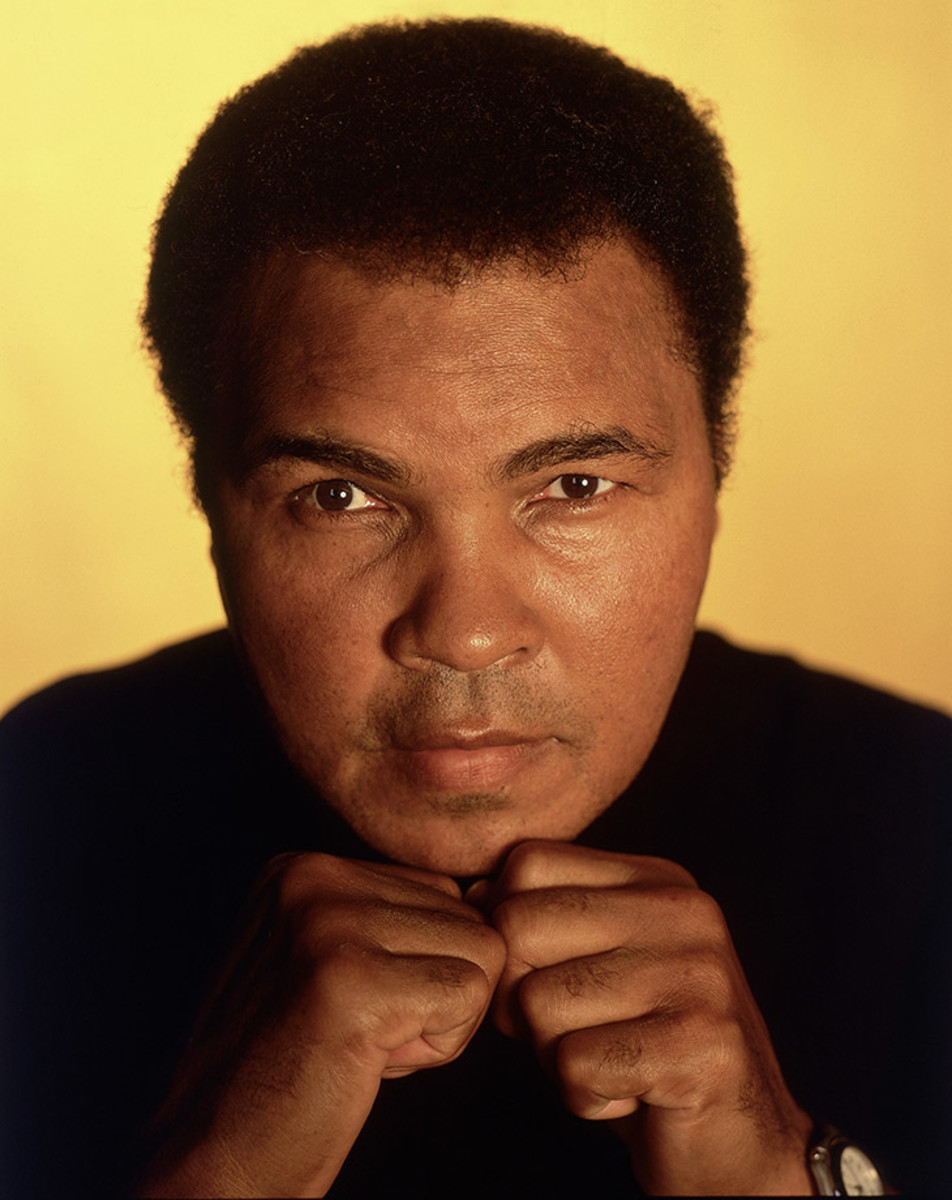
Ali poses with his fists up for a portrait in 2005.
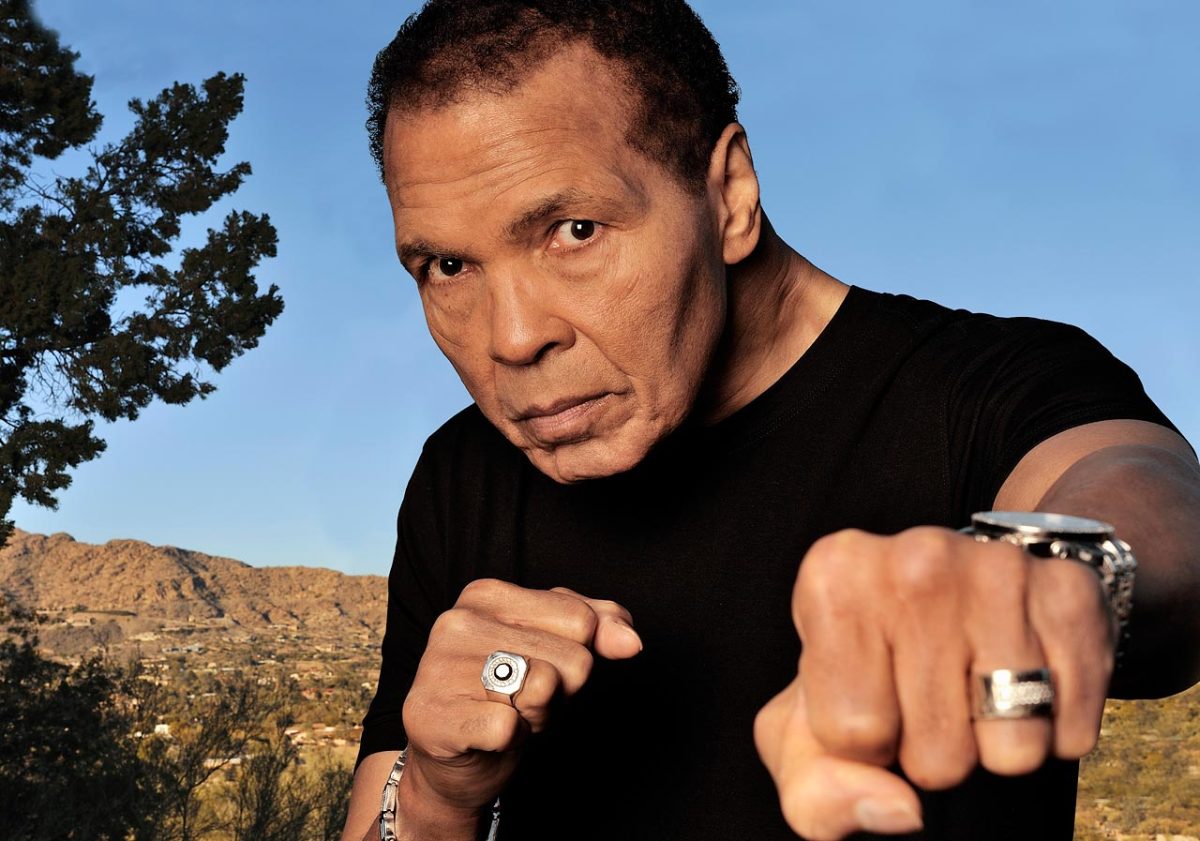
Ali poses with an extended punch in a 2012 photo shoot at his home in Paradise Valley, Ariz., to mark his 70th birthday.
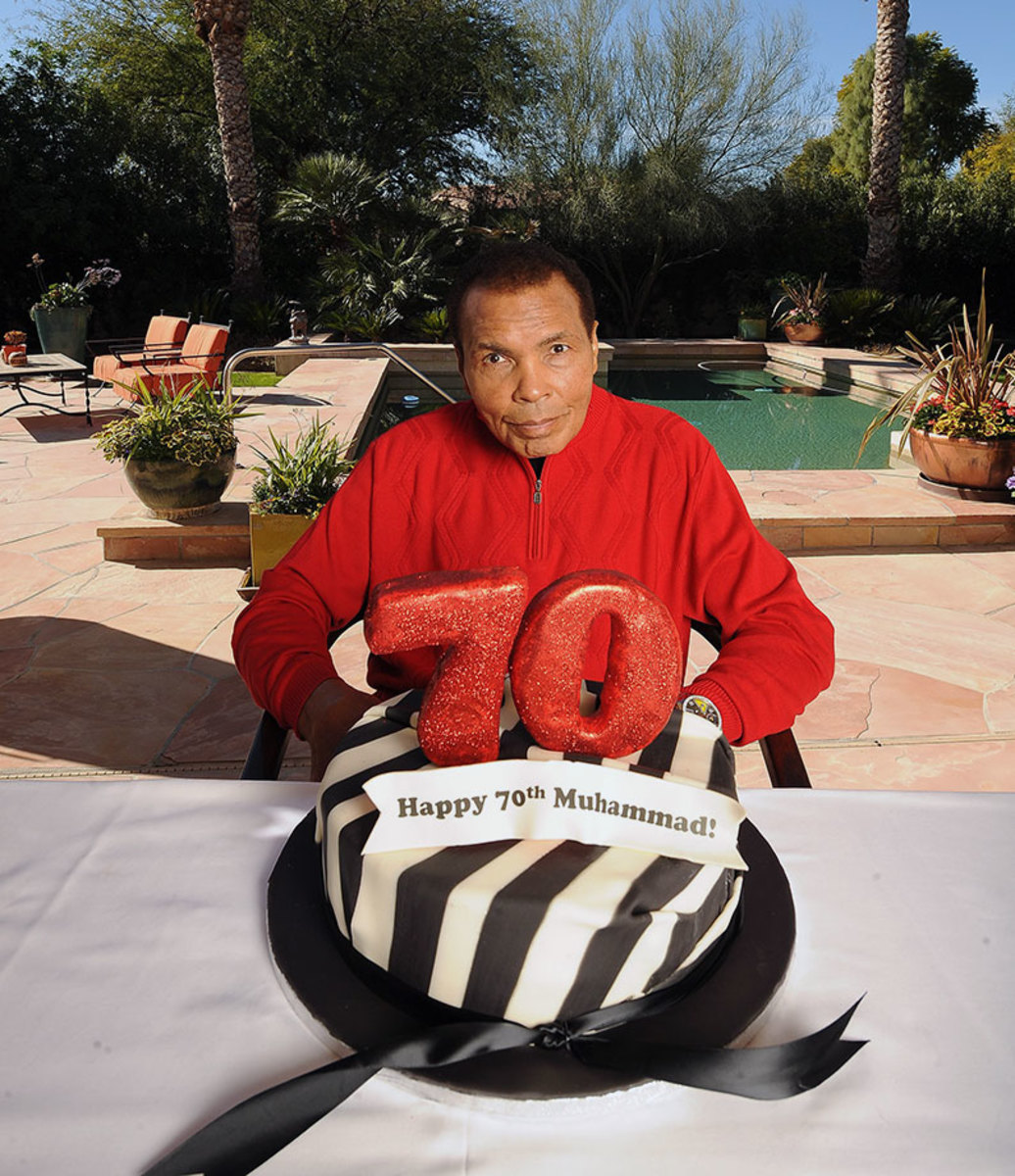
Ali sits in front of a 70th birthday cake in January 2012 at his Arizona home. Later that year he appeared at the opening ceremonies for the 2012 Olympics in London to escort the Olympic flag into the stadium, 52 years after he won gold in Rome.
